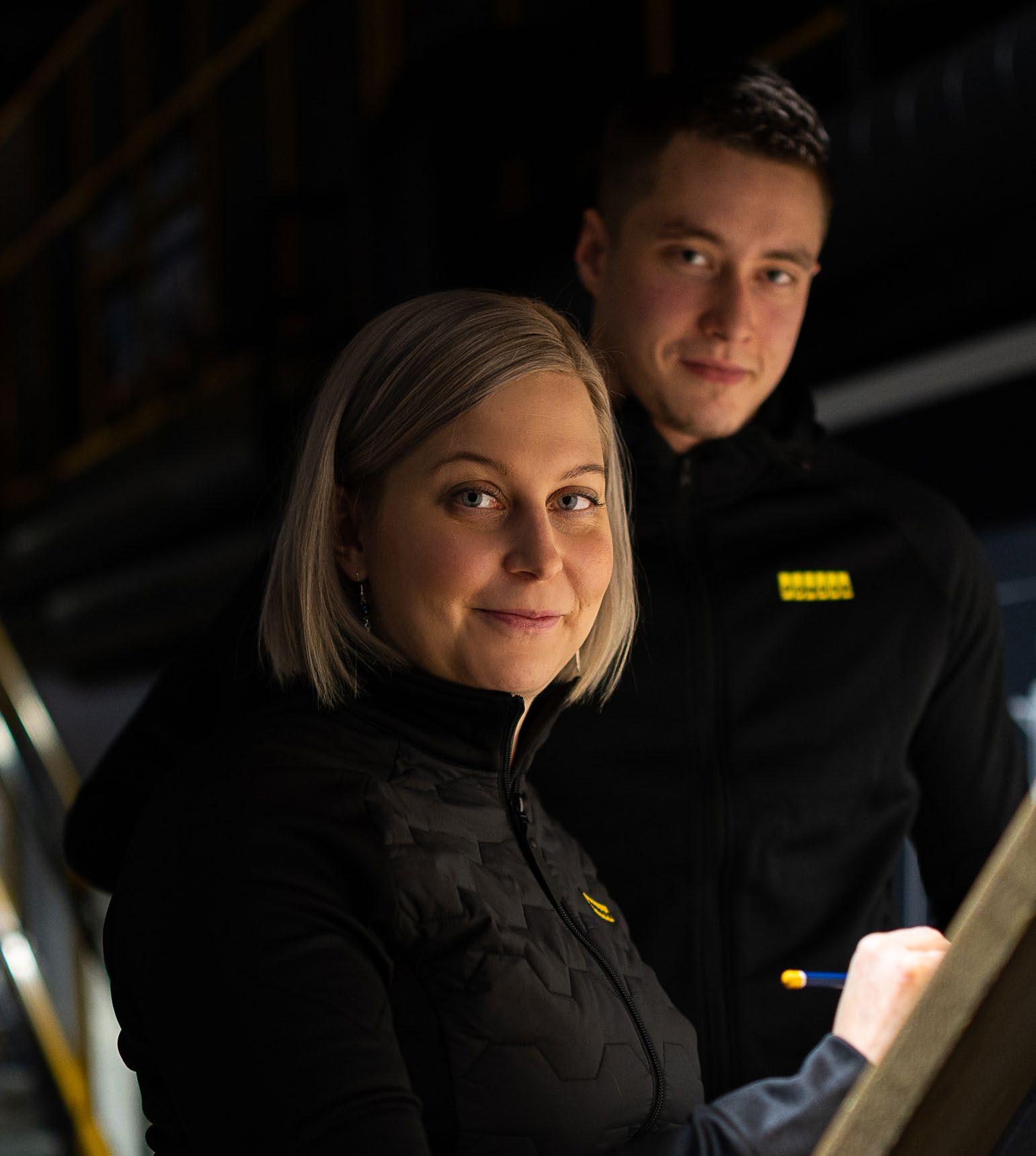
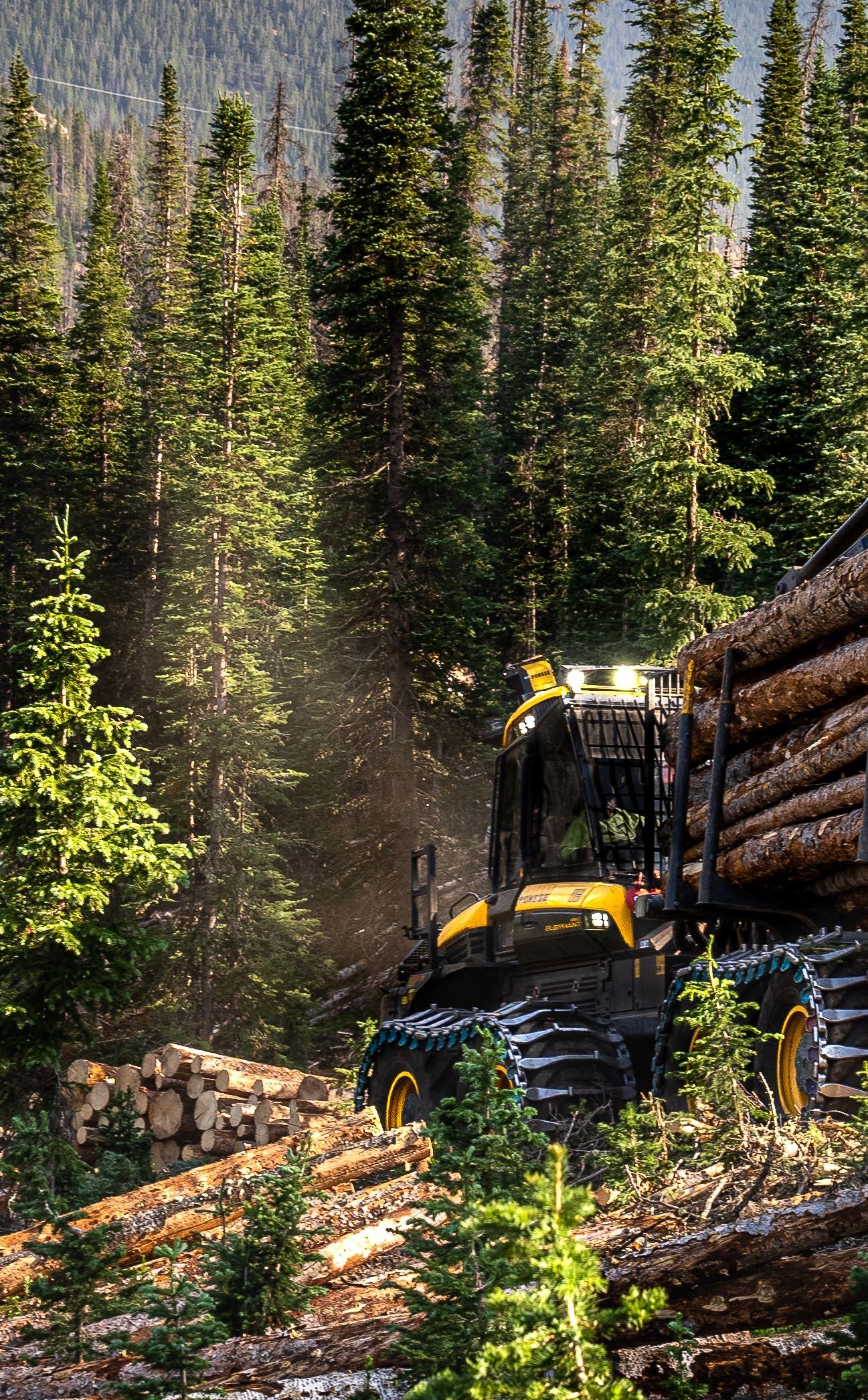

O
2 SUSTAINABILITY
YOUR P A R T NER IN S U S T BANIA L E F RTSERO Y
2
2
REPORT

2 01
during 2022, we investigated opportunities and measures to reduce emissions, based on which we prepared our carbon neutrality roadmap (Scope 1 and 2). s.4 10 s. Our sustainability goals 4 Introduction 5 Environmental responsibility 10 Social responsibility 36 Governance 66 Goals and measures 84 Taxonomy 88 GRI index 92 Sustainability reporting at Ponsse 94 YOUR P A R T NER IN S U S T LBANIA E F O R YRTSE
Environmental responsibility
Social responsibility Governance
each new employee must complete Code of Conduct training.
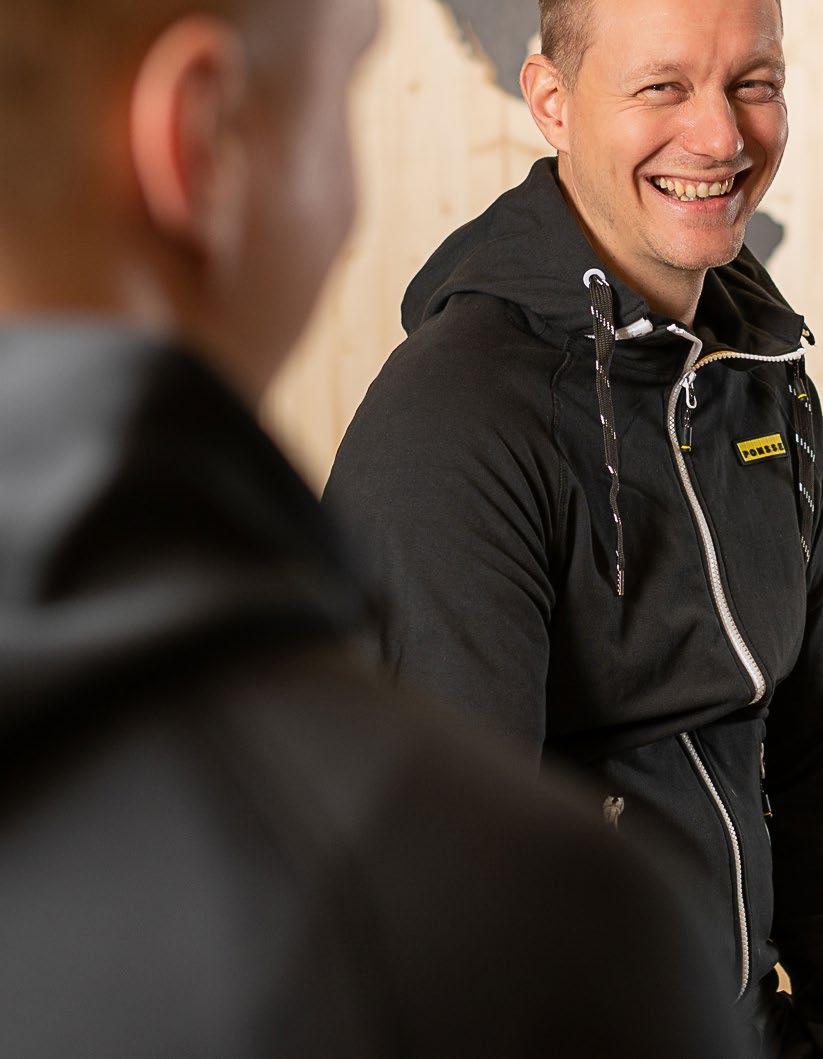

s.
sustainable development provides us with a direction and an opportunity for innovation and new operating methods.
s.
3
03
36
66
02
PEOPLE
–We improve the wellbeing of our people
Ponsse is a good and safe place to work for us. We work productively following the excellent Ponsse spirit, appreciate one another and take care of each other, our customers and our whole network.
Our strategic sustainability goals
SOLUTIONS –
We innovate sustainable solutions that respect nature
Our product and service solutions play an important role in enabling the implementation of the principles of sustainable forestry. We bear responsibility for the machine lifecycle and extend it through good maintenance services. Sustainable and responsible development offers us a direction and opportunities.

ACTIVITIES
–We do not burden nature through our operations
We understand the impact of our operations on the environment and human rights. In our operations, we seek carbon neutrality and material efficiency.
COMMUNITY –
We are a reliable partner who values community
Acting honestly and ethically as a community is at the core of Ponsse. Good corporate governance and our Code of Conduct define how we treat people equally, conduct sustainable business and engage in confidential cooperation with our partners.
4
Ssustainability and responsibility represent continuity at Ponsse. We are a company whose management and ownership is based in our values, and we have a clear course for the future. We believe our continuously developing technology and new business models will enable sustainability principles to be realised in forestry.
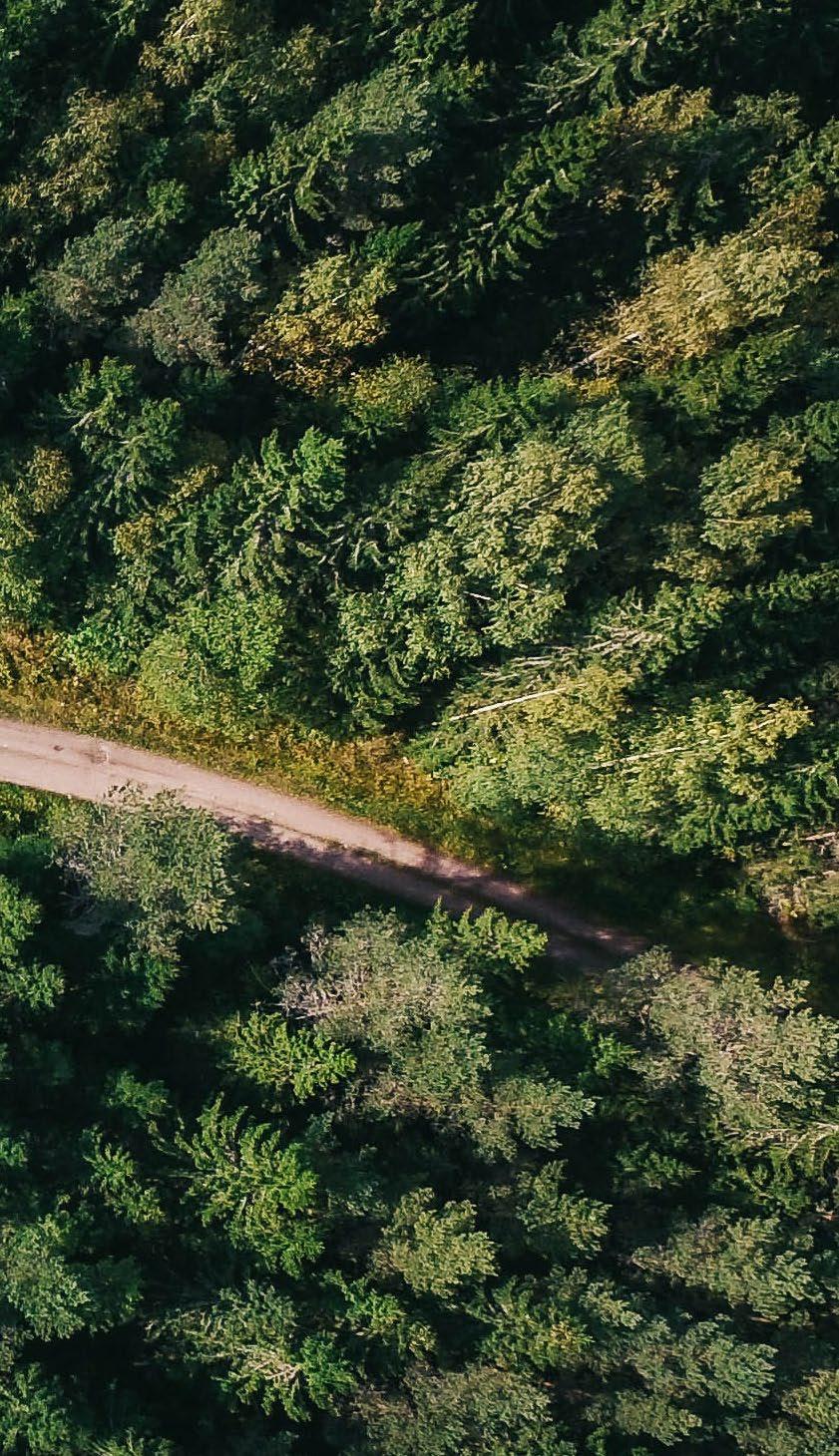
Our R&D activities seek climate- and nature-friendly solutions, and we aim to become carbon-neutral in our operations. Productive harvesting that respects the environment supports the regeneration of commercial forests and enables the use of valuable raw materials in long-lasting and high-quality wood-based products.
In 2022, we launched new technology with the introduction of our PONSSE EV1 forwarder concept. Its fully electric platform is an important step on our path towards zeroemission harvesting.
We could not take a single step on this path without our people. The sense of community that is part of our corporate culture has carried Ponsse throughout its history. The will to do things together is our greatest strength that allows us to bravely face the changes and opportunities ahead of us. The inclusion of responsibility as part of our daily work and decision-making has been surprisingly fast. That proves how genuinely important it is to our people, which reflects the company’s values of a customer-oriented approach, honesty, innovativeness and the Ponsse spirit.
We want to stay humble as we continue developing as well as fulfil the company’s founder Einari Vidgrén’s wish that our people would be happy working at Ponsse, both now and in the future.
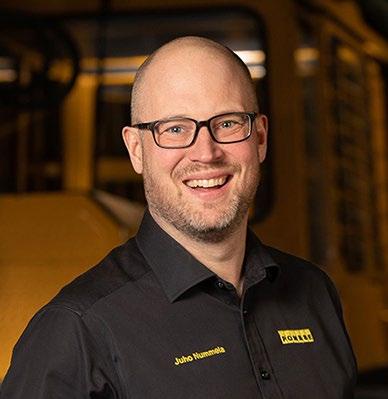 juho nummela, President and CEO katja paananen, Chief Responsibility Officer
juho nummela, President and CEO katja paananen, Chief Responsibility Officer
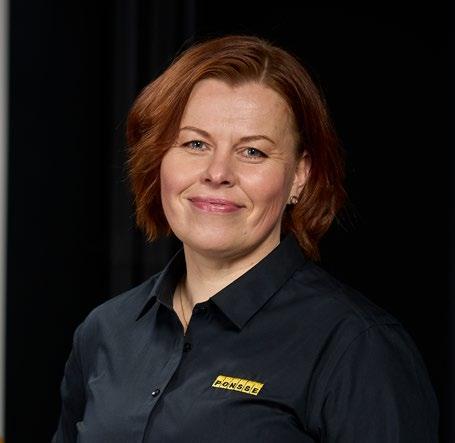
5
Ponsse Group’s business

Ponsse Plc develops and produces sustainable and innovative harvesting solutions based on customer needs. With the experience gained from manufacturing more than 19,000 forest machines, the company is one of the world’s leading manufacturers of forest machines based on the cut-to-length harvesting method.

YOUR P A R T NER IN S U S T LBANIA E F O R YRTSE
Ponsse on Ponsse has always been a family-owned company, and its management has emphasised values and long-term business. The Ponsse company was established by the forest machine entrepreneur Einari Vidgrén in 1970. The company’s roots are deep in the Finnish countryside and Finnish work, but it also feels quite at home on the international market. Today, PONSSE machines are used at logging sites in more than 40 countries. All the machines are manufactured at the company’s birthplace in Vieremä, Finland, where the company is also domiciled. The public limited company’s shares are quoted on the NASDAQ OMX Nordic List.
Ponsse Group consists of the parent company Ponsse Plc and its directly owned subsidiaries Ponsse AB in Sweden, Ponsse AS in Norway, Ponssé S.A.S. in France, Ponsse Czech s.r.o. in the Czech Republic, Ponsse UK Ltd. in the United Kingdom, Ponsse Machines
Ireland Ltd. in Ireland, Ponsse China Ltd. in China, Ponsse North America Inc. in the United States, Ponsse Latin America Ltda in Brazil, Ponsse Uruguay S.A. in Uruguay, Ponsse Chile SpA in Chile and Epec Oy in Finland. Ponsse Group’s subsidiaries are responsible for the international sales and after sales services of PONSSE forest machines together with 30 PONSSE dealers. The Finnish technology company Epec Oy is a system supplier specializing in advanced electrics and electronics for non-road mobile machines and commercial vehicles.

All PONSSE forest machines are manufactured from key components to assembly at our Vieremä factory in Finland where the company’s head office is also located. Exports account for 79 per cent of our net sales, and our international service business network consists of 235 service centres.

Exports account for 79 per cent of our net sales.
In 2022, we set our first climate goals in accordance with our roadmap.
The highlights from our sustainability journey in 2022 1
38% LAUNCHES

Launch of the PONSSE EV1 electric platform forwarder concept.
Launch of the Lidar concept. Lidar measures and verifies thinning intensity, the remaining stem number and harvesting impacts, such as the width and interval of forest machine trails.
89.3 %
The share of carbon neutral (Scope 2) energy in our electricity and heating.
Our carbon footprint was 38 per cent lower than in the first calculation in 2019.
62%
Compared to 2019, we reduced our carbon footprint in the Nordics by 62 per cent.

Our factory’s carbon footprint was reduced by 90 per cent.
90%
FIRS T T I M E
The highlights from our sustainability journey in 2022
3.28
Management quality on a scale from 1 to 4.
47%
of our subcontracted purchases are made within a 25kilometre radius of our factory in Northern Savonia.

2 0 0
We trained 200 Ponsse Training Path students by the end of 2022.
1

150,000 kg FIRST
In the Reputation&Trust survey, private investors evaluated Ponsse as the most reputable company in Finland in terms of responsibility.
A total of 150,000 kg of spare parts were refurbished or reused.
P L A CE
Environmental responsibility
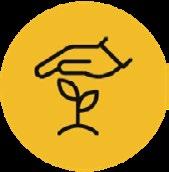
We innovate sustainable solutions that respect nature

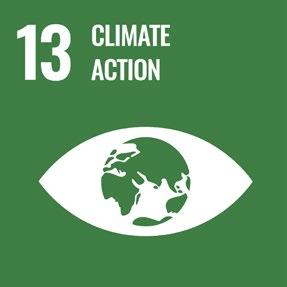
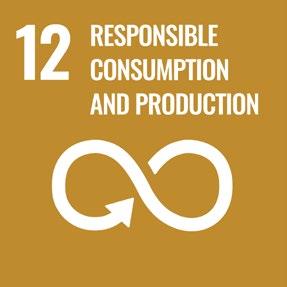
We do not burden nature through our operations
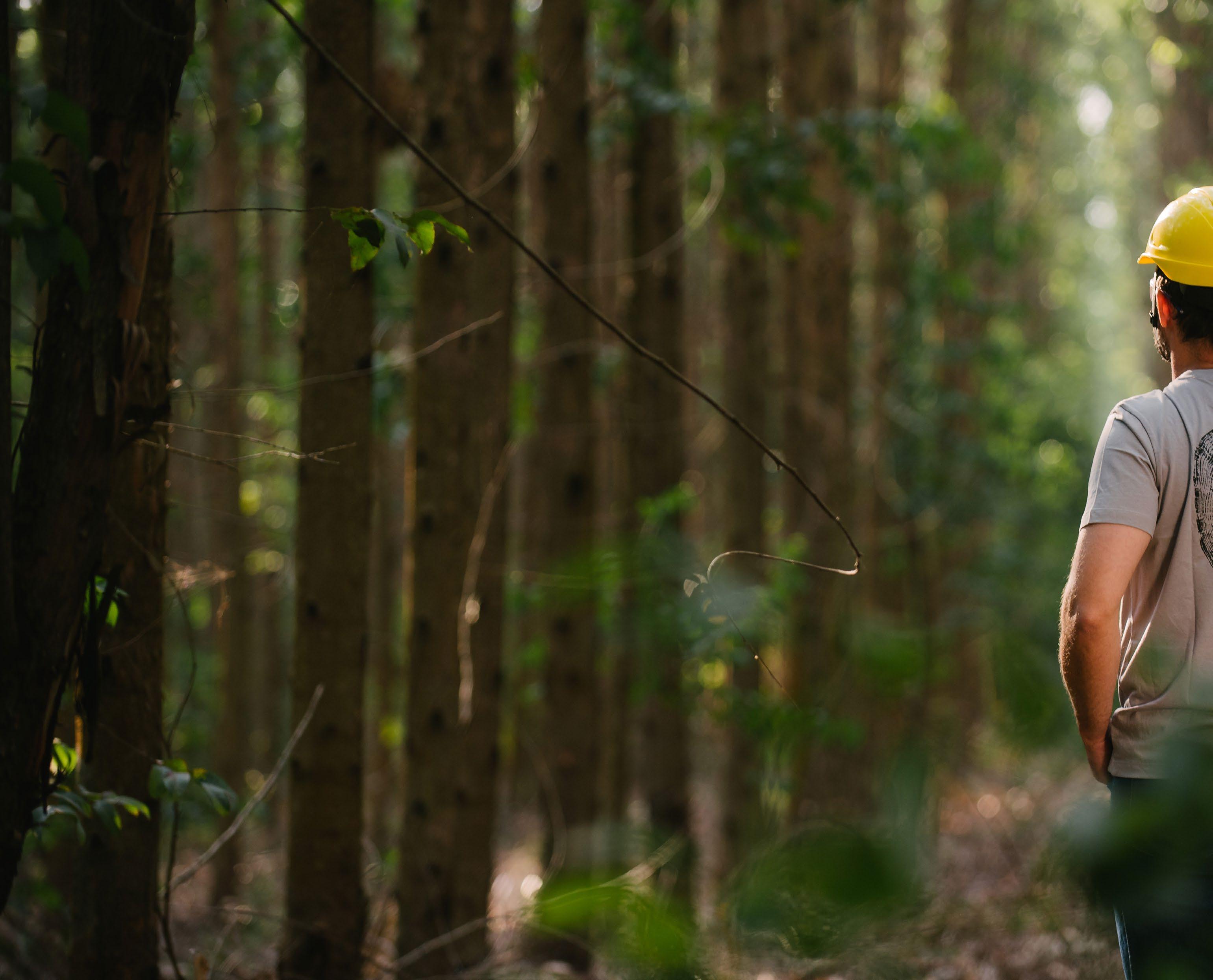
01
Our product and service solutions enable sustainable forestry
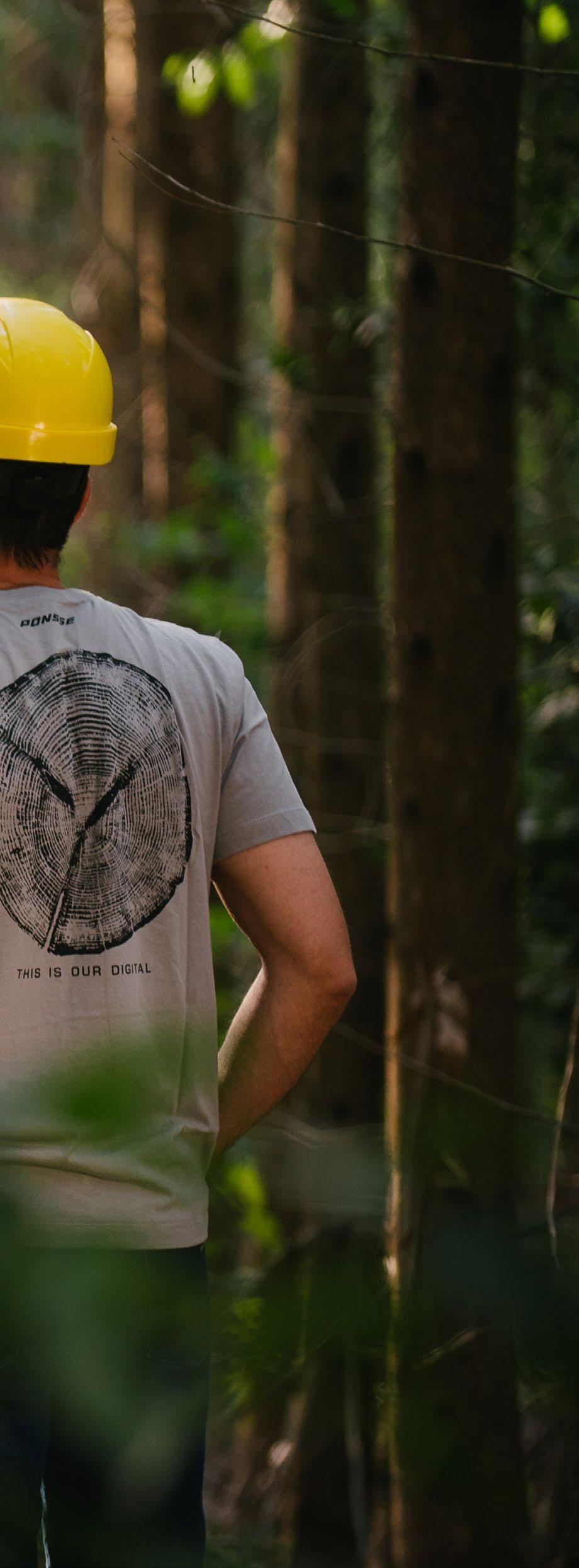
We bear responsibility for the machine lifecycle and extend it through excellent maintenance services. We develop solutions that promote the circular economy and reduce the environmental impact of machines.
We know the environmental impact of our operations and work systematically to improve it. We seek carbon neutrality and material efficiency in our products and operations.
11 01
PRINCIPLE
OUR
Environmental responsibility
Towards carbon neutrality

During 2022, we investigated opportunities and measures to reduce emissions, based on which we prepared our carbon neutrality roadmap. Our emissions reduction goals cover Scope 1 and 2 emissions (our operations and purchased energy).
By carbon neutral factory, we mean our production operations. We do not include test drive operations and the use of our vehicles in our production operations. In addition to the manufacturing of forest machines, Ponsse has production operations at Epec Oy in Seinäjoki, Finland. Epec is a system supplier specializing in advanced electrics and electronics for non-road mobile machines and commercial vehicles.
In 2022, the carbon footprint of Ponsse Group’s factories was 259 t CO2-eq, representing a decrease of 4% compared to the previous year. We have reduced the
carbon footprint of our factories by 90% compared to 2019 by purchasing electricity produced with guarantee-of-origin renewable energy, using district heating mainly produced with renewable energy sources and by transitioning to the use of renewable diesel (HVO).
01
A carbon neutral factory by 2025 (Scope 1 & 2)
01
2,605
2500 2000 1500 1000 500 0 2019 2020 2021 2022 2025
Factory's carbon footprint, t CO2-eq.
ENVIRONMENTAL RESPONSIBILITY IN PRACTICE 270 259 410
By carbon neutral (Scope 2) energy, we mean energy generated using renewable energy sources and nuclear power.
In 2022, the coverage of carbon neutral (Scope 2) energy from electricity and heat increased to 89.3%, up by 1.8% from the previous year. Compared to 2019, we have increased the share of carbon neutral (Scope 2) energy from our total consumption of energy by more than 13%.

13 01
02
Coverage of carbon neutral (Scope 2) electricity and heat at 95% by 2030
Carbon neutral (Scope 2) energy, % 2019 75.7% 83.1% 87.5% 89.3% 95.0% 2020 2021 2022 2030 50% 60% 70% 80% 90% 100% Environmental
responsibility
Carbon neutrality in the Nordic countries by 2035 (Scope 1 & 2) 03
In addition to production operations, this goal covers maintenance services in the Nordic countries. Besides Finland, Ponsse operates in the Nordic countries through its subsidiaries in Sweden and Norway.
In 2022, our carbon footprint in the Nordic countries decreased by 7% to 1,931 t CO2-eq. Compared to 2019, we have reduced our carbon footprint in the Nordic countries by 62% by shifting to the use of energy generated using renewable and carbon neutral (Scope 2) energy sources.

01
5000 4000 3000 2000 1000 0 2019 2020 2021 2022 2035 5,082 2,046 2,082 1,931
Nordic countries, carbon footprint, t CO2-eq.
Our annual emissions reduction goal
The carbon footprint will be compared to emission levels in 2022. In practise, this translates to emissions reductions of roughly 5% per year.
In 2022, Ponsse’s carbon footprint in the Nordic countries decreased by 1% to 4,310 t CO2-eq. Compared to our initial carbon footprint calculated in 2019, our carbon footprint is now 38% smaller.
15
04 01
The group’s carbon footprint down by 55% by 2035 (Scope 1 & 2)
5%
5000 6000 4000 3000 2000 1000 0 2019 6,951 3,571 4,365 4,310 1,939 2020 2021 2022 2023 2024 2025 2026 2027 2028 2029 2030 2031 2032 2033 2034 2035 7000 Environmental
Ponsse’s carbon footprint, t CO2-eq.
responsibility
We have used 2019 as the baseline for our emissions calculations, as the company started to calculate the Ponsse Group’s emissions during that year. In 2022, we recalculated our emissions in 2019 to correspond to our continuing operations, as the company’s operations were suspended at the beginning of March 2022 due to Russia’s invasion of Ukraine. Other changes in 2022 that affect the calculation of our emissions included the establishment of subsidiaries in the Czech Republic and Chile.
As a result of the recalculation, Ponsse’s carbon footprint in 2019, the baseline for the calculation of emissions, was 6,951 t CO2-eq., of which Scope 1 emissions accounted for 3,277
t CO2-eq. (47%) and Scope 2 emissions for 3,674
t CO2-eq. (53%). Emission intensity was 12,4
t CO2-eq. per EUR million. In addition to the carbon footprint, the biogenic emissions of our operations and purchased energy were 3,185
t CO2-eq.
In 2022, our Scope 1 and 2 (our operations and purchased energy) carbon footprint was 4,310
t CO2-eq. Compared to the previous year, our carbon footprint decreased by one percent (55 t CO2-eq.) mainly in Scope 2 emissions, in which the consumption of district heating decreased significantly and a larger share of district heating
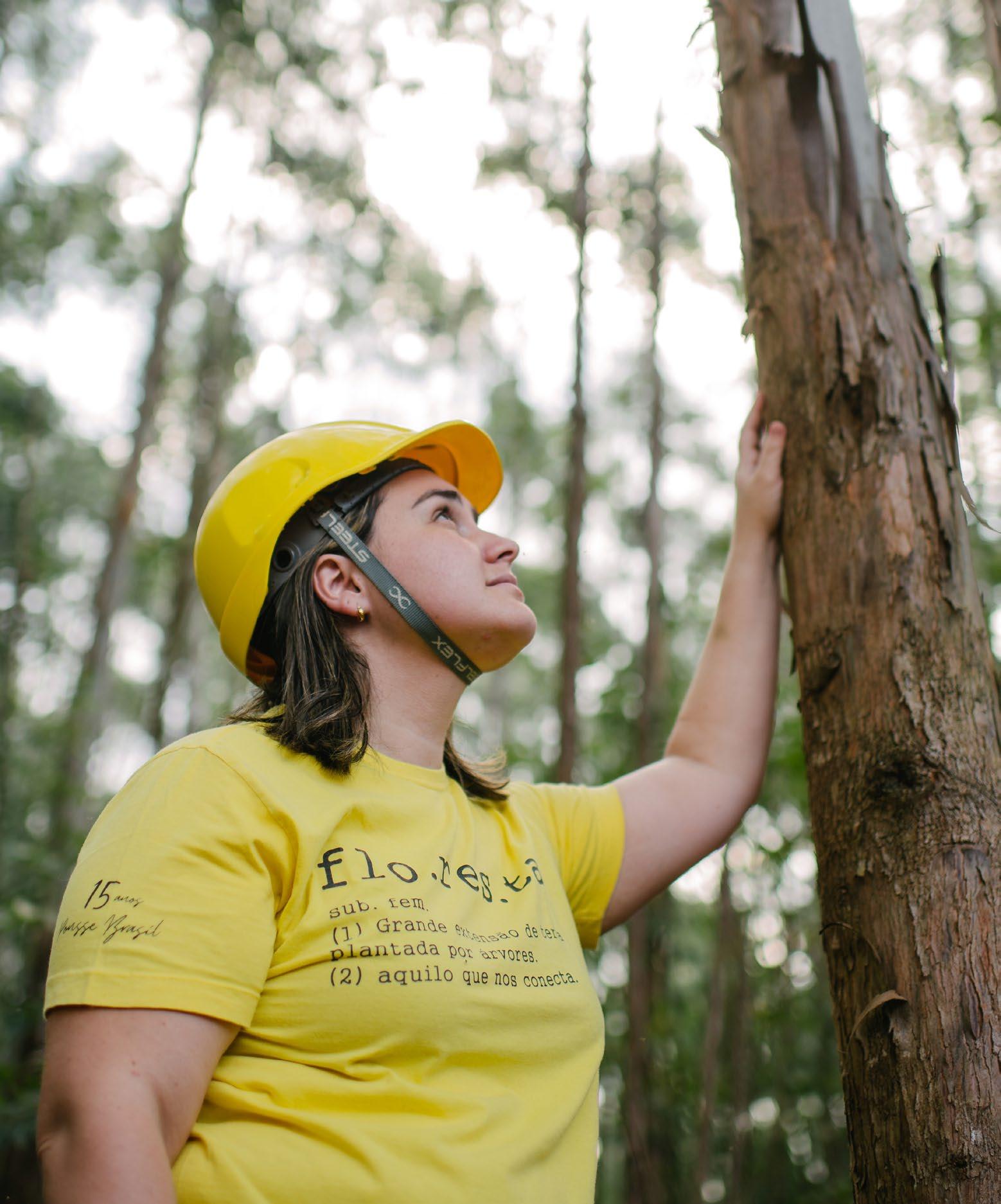
16 01
ENVIRONMENTAL RESPONSIBILITY IN PRACTICE
was generated using renewable fuels. In addition, Scope 1 emissions decreased after the reduced fuel consumption in our operations in South America. However, the total impact was low, as emissions increased in our other operations and the calculation included two new subsidiaries: Ponsse Chile and Ponsse Czech. Our carbon footprint in 2022 was 38% smaller than in 2019.
Scope 1 emissions accounted for 85% (3,681 t CO2-eq.) and Scope 2 emissions for 15% (629 t CO2-eq.) of our carbon footprint. Emission intensity, i.e. the carbon footprint relative to net sales, was 5.7 t CO2-eq. per EUR million. Regardless of the increase in business operations, we were able to reduce our carbon footprint relative to our net sales, and our emission intensity decreased by 20%. Biogenic emissions, i.e. the volume of carbon dioxide emissions from the combustion of organic material, were 2,468 t CO2-eq.
17 01
Carbon footprint by region, t CO2-eq.
1,931 North Europe 2,597 Use of vehicles 622 Test drive operations and use of work machines 407 Other use of fuels 55 Refrigerant leaks 172 Electricity 457 Heat 412 Central and Southern Europe 73 Asia 1,066 North America 827 South America Environmental responsibility
Carbon footprint by source, t CO2-eq.
We aim to include Scope 3 emissions in our calculations at the beginning of 2024. During 2022, we identified the company’s most significant Scope 3 emission categories and will define a data collection and reporting policy for the calculation in 2023.
Of Ponsse’s carbon footprint (Scope 1 and 2), the use of the company’s vehicles accounts for 60%, the test drive process for manufactured forest machines and the use of work machines for 14% and heating for 11%. Geographically, the most significant part of our carbon footprint comes from Northern Europe (45%) and North America (25%).
Climate acts by Ponsse’s subsidiaries
Of Ponsse’s subsidiaries, Epec Oy is already close to carbon neutrality regarding Scope 1 and 2 emissions. In 2022, the company only generated 51 t CO2-eq. of emissions, down by 84% from the baseline year of 2019. A refrigerant leak increased the carbon footprint from the previous year. The new factory to be completed in Seinäjoki, Finland in autumn 2023 will be completely carbon neutral. Ponsse AB, our subsidiary in Sweden, defined a new car policy in 2022, according to which the company will only acquire electric or hybrid pas-
senger cars in the future. The policy aims to promote carbon neutrality in the Nordic countries.
CDP climate reporting
In 2022, we participated in CDP climate reporting. Our score was C, which on the reporting scale stands for awareness of our climate impact and the impact of the climate on our operations. The score matches the industry average, while being lower than Europe’s regional average (B). Even though our score was better than in the previous year (2021: D), we still have room for improvement in calculating the emissions of our value chain, among others.
18 01
Epec Oy is already close to carbon neutrality regarding Scope 1 and 2 emissions.
ENVIRONMENTAL RESPONSIBILITY IN PRACTICE
Emissions into the air
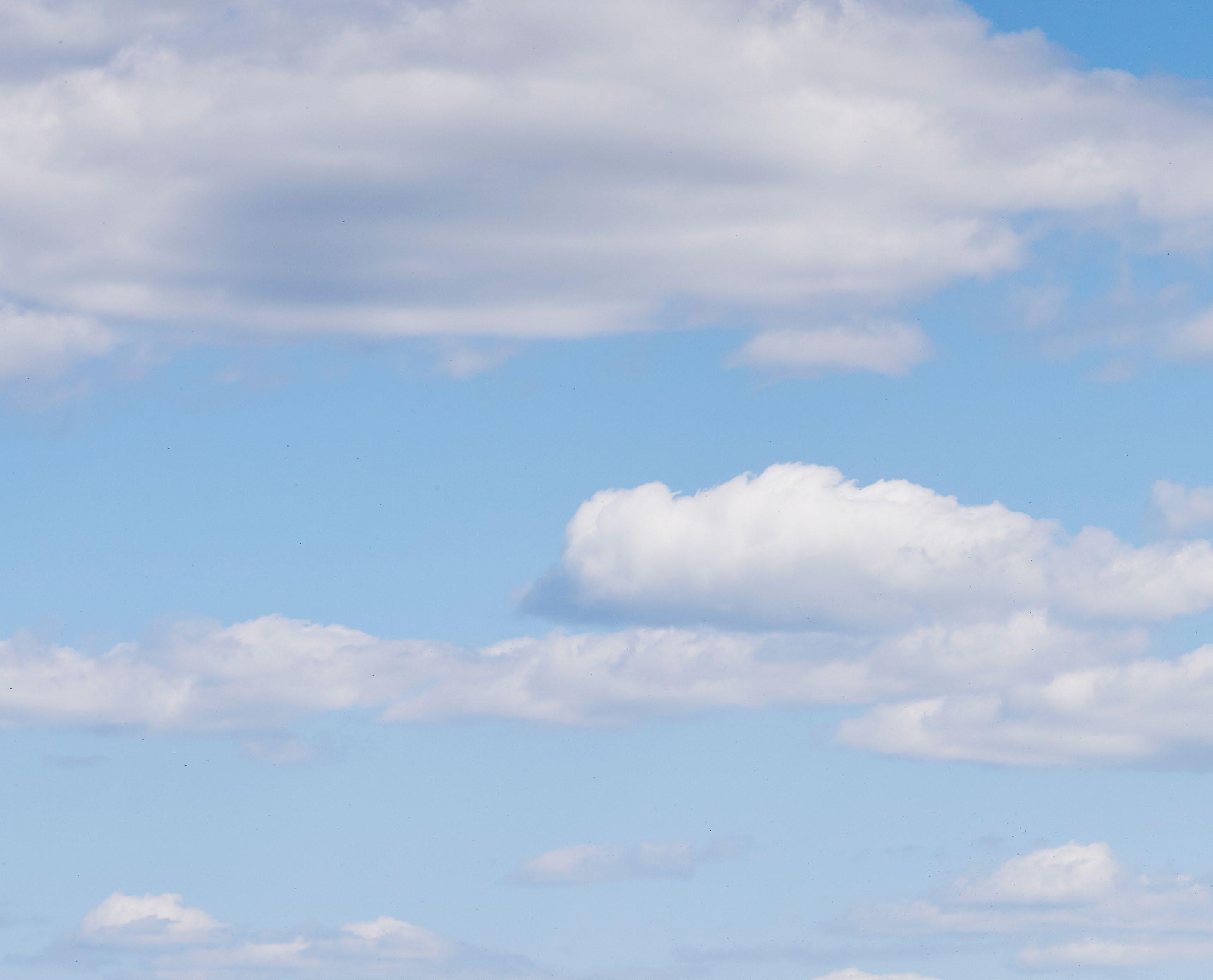
Environmental responsibility
The key figures are based on the information presented in the most recent confirmed financial statements. The calculation of our emissions is based on the Corporate Standard of the international Greenhouse Gas (GHG) Protocol. Our calculation is based on the operational control method, and Scope 2 emissions have only been calculated using the marketbased method. The calculation of our emissions covers six greenhouse gases: CO2, CH4, N2O, HFC, PFC, and SF6 In our calculation, we use the 100year global warming potential values (GWPs) set for greenhouse gases in the Fourth Assessment Report (AR4) of the Intergovernmental Panel on Climate Change (IPCC). Other significant climate emissions generated in our operations include volatile organic compounds (VOC) that are released from our paint shop. The VOC volumes contained by chemicals originate from chemical suppliers.
01
Scope 1 Scope
Total carbon footprint Carbon footprint relative to net sales Total biogenic emissions Volatile organic compounds (VOC) 3681.0 628.9 4309.9 5.7 2468.5 9.9 +1% –12% –1% –21% -11% –35% 3653.4 711.3 4364.8 7.2 2775.8 15.3 2688.9 881.7 3570.6 6.4 2389.1 13.0 2022 2022 2022 2022 Carbon footprint, t CO2-eq. Emission intensity, t CO2-eq./M€ Biogenic emissions, t CO2-eq. Other emissions into the air, t
2 (marked-based)
Change, % Change, % Change, % Change, % 2021 2021 2021 2021 2020 2020 2020 2020
1.6 GWh
Energy consumption
In 2022, our total energy consumption (including fuel) was 39.0 GWh, of which 56.5% came from renewable energy sources. Compared to the previous year, our consumption increased by two percent. Also the share of renewable energy increased by two percent. We consumed 12.9 GWh of electricity (accounting for 33% of our total energy consumption), of which 95% came from renewable energy sources. The electricity consumed in our locations in Finland was 100% guarantee-of-origin hydropower. Our solar panels at our factory in Vieremä and at our subsidiary in Uruguay generated 141.4 MWh of electricity, the majority of which was consumed, while a total of 383.5 kWh was sold.
Of our energy consumption, district heating accounted for 18% (7.2 GWh), of which 89% was generated using renewable energy sources. In addition, 1.6 GWh of heat were generated using oil, natural gas and woodchips. Carbon neutral (Scope 2) energy, i.e. energy generated using
renewable energy sources or nuclear power, accounted for 89.3% of all electricity and heat consumed by the group.
Fuel consumption
Fuel consumption accounted for the majority of our energy consumption – 49%, meaning 18.9 GWh. Only 19% (3.5 GWh) of the fuel volume came from renewable sources, including the biofractions contained by fuel mixtures. Fuel was consumed by vehicles, the test drive of manufactured machines, surface treatment, and work machines, as well as the generation of heat as mentioned above. We consumed 1.6 GWh of wholly renewable fuels, of which hydrotreated vegetable oil (HVO) diesel was used in work machines, as the first tank of fuel in manufactured forest machines, and in test drive operations. Our Brazilian subsidiary consumed ethanol in vehicles. Woodchips were used by the Czech subsidiary to heat its maintenance facility and renewable heating oil was used in Norway.
20 01
Wholly renewable fuels:
Fossil fuels
Petrol
Diesel
Natural gas
Liquefied petroleum gas
Fuel oil
Renewable fuels
Ethanol
Wood chips
Renewable diesel (HVO)
Renewable fuel oil
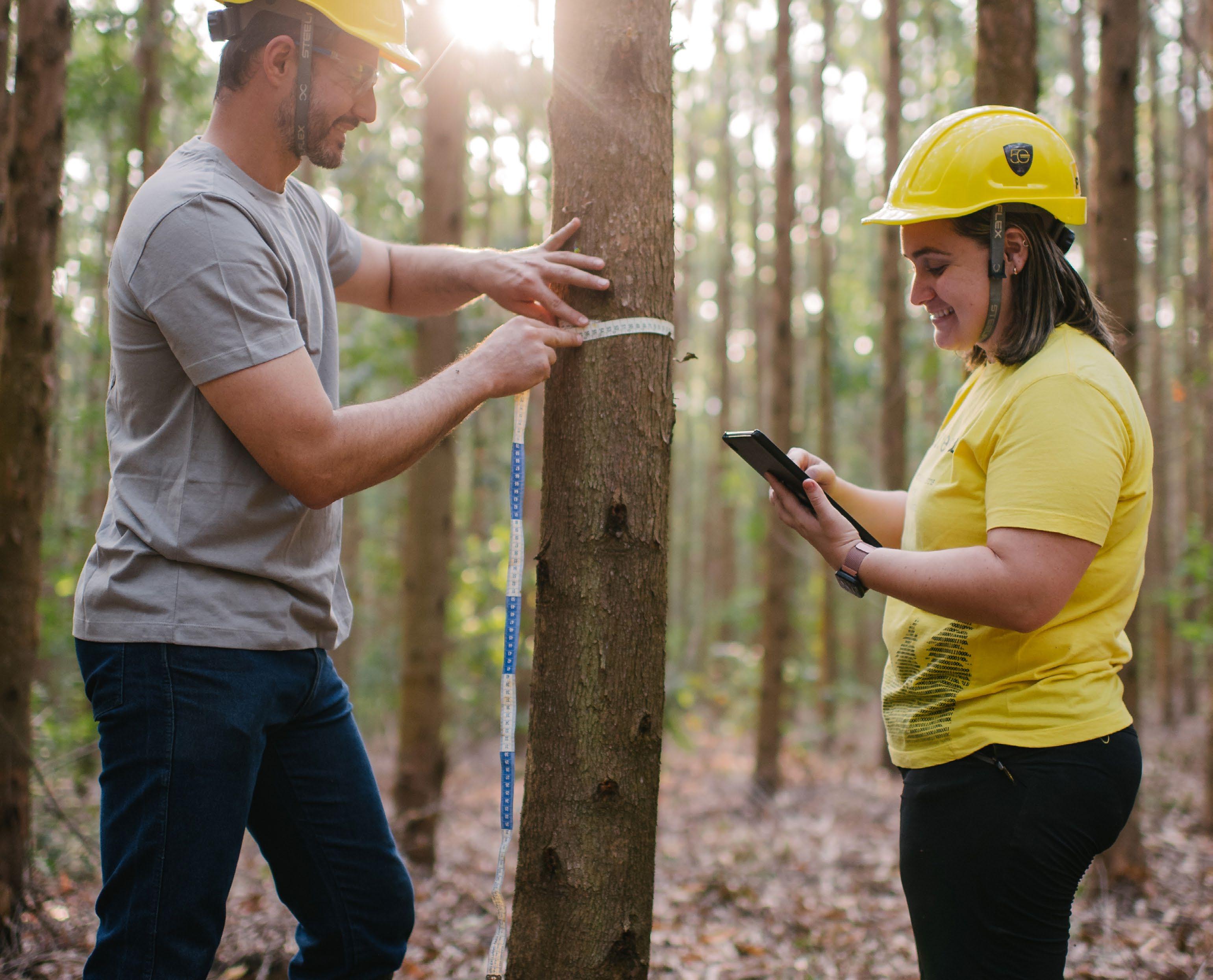
Total energy from fuels
Purchased electricity
Self-generated electricity
Purchased district heating
Total electricity and heat
Total energy consumption
Energy intensity, MWh/M€
Total energy consumption relative to net sales
Share of carbon neutral (Scope 2) energy, %
Carbon neutral (Scope 2) electricity and heat
Energy information has been calculated based on reported consumption. For certain leased facilities, we have calculated energy consumption based on the surface area, as more detailed information has been unavailable. We have used Statistics Finland’s conversion factors in the calculation of energy figures. We do not consume any district cooling or steam in our operations. We did not sell any energy other than electricity. The figures include only continuing operations.
*The change rate has been calculated from unrounded figures.
01
17.3 2.4 10.9 1.0 1.0 2.1 1.6 0.1 0.4 1.0 0.1 18.9 12.7 0.1 7.2 20.1 39.0 51.6 89.3 +7% –6% +15% +6%* –1%* –3% +13% –51% new –3% –0% +8 % +5% –16% –14% –3% +2% –18% + 1,8% 16.2 2.5 9.5 1.0 1.0 2.2 1.4 0.3 –1.1 0.1 17.5 12.1 0.2 8.3 20.6 38.1 62.8 87.5 12.4 1.4 8.4 1.1 0.8 0.8 1.1 0.0 –1.0 0.1 13.5 11.0 0.2 6.8 18.0 31.5 56.2 83.1 2022 Energy consumption GWh Change, % 2021 2020
Energy Environmental responsibility
Waste by fraction, t
Waste information collected at a group level for the first time. Previously, the information was only collected regarding
Water
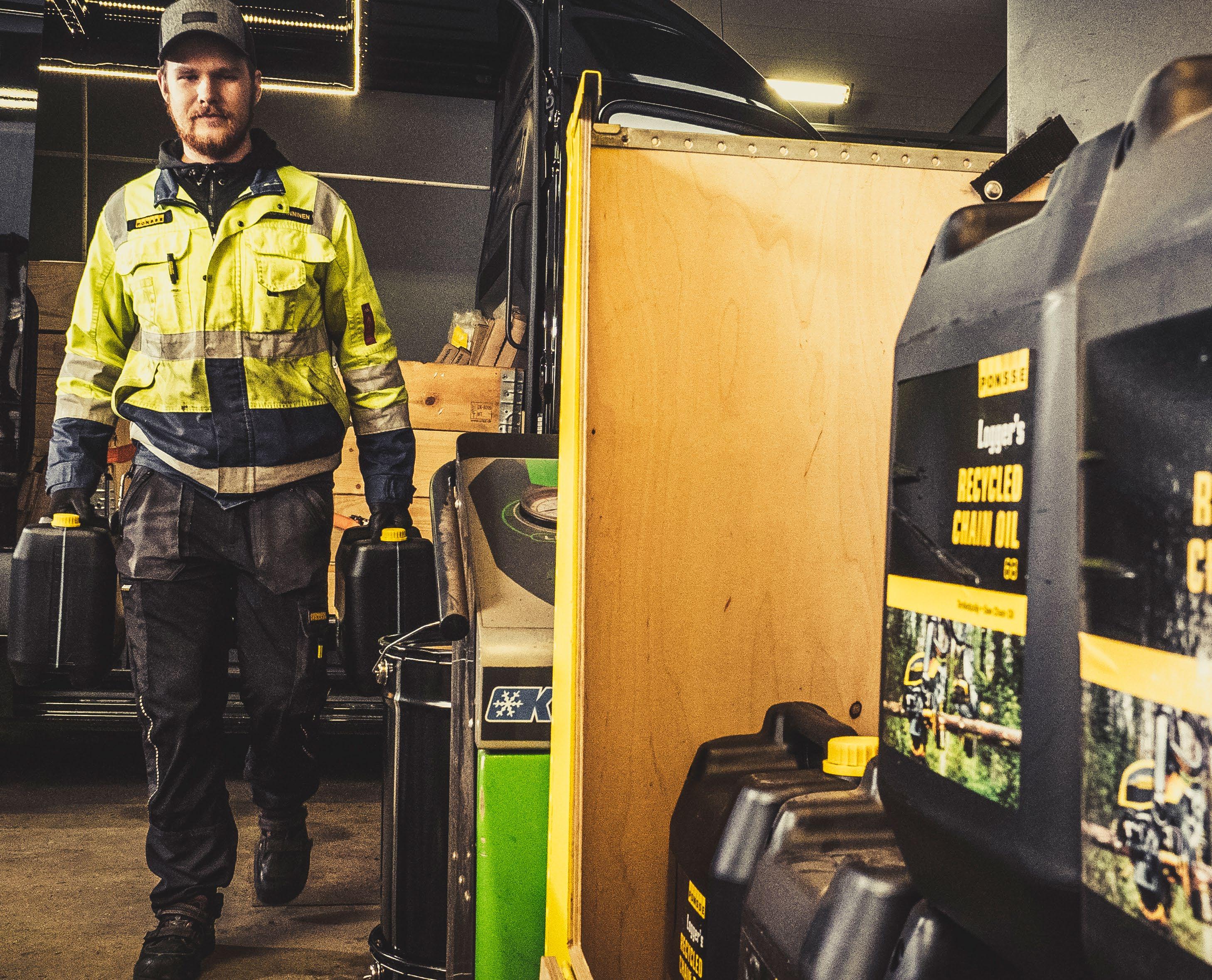
01 Water consumption 29.7 –7% 31.82022 Water consumption, 1,000 m³ Change, % 2021 2020
Finland.
waste
recycling
Non-hazardous
For
landfill
waste
recycling
energy-use For landfill sites Total waste volume Waste recycling rate Waste utilization rate (recycling and incineration) 2,208.3 1,005.1 1,125.3 77.9 1,698.7 1,135.3 341.9 221.5 3,907.0 54.8% 92.3% 2022 2022 Waste, t Waste
For energy-use For
sites Hazardous
For
For
1,699 Hazardous waste 751 Wood 704 Metal 288 Mixed waste 196 Paper & cardboard 178 Energy waste 92 Other (biowaste, plastic, glass) Waste recycling and reuse, %
Water consumption information collected at a group level for the first time in 2021.
Energy savings
Measures to save energy were carried out especially in our operations in Finland. Several locations switched to LEDs, and a timer was installed for outdoor lighting at the Vieremä factory. In addition, ventilation machines' adjustments were checked in all Ponsse locations in Finland. The measures carried out resulted in annual energy savings of 412 MWh, of which 243 MWh came from district heating and 169 MWh from electricity. An energy audit of savings potentials and emissions reductions was conducted for surface treatment in production. We also participated in Motiva’s energy saving week, during which we aimed to increase our employees’ energy awareness. We collected energy saving tips and observations of any waste of energy from our employees. In addition, we participated in the Down a Degree campaign, which aims to encourage Finnish people to take concrete action to save energy.
Water consumption
During the year, our total water consumption was 29,680 m³, down by seven % from the previous year. More than half of this volume was consumed in our production. Water is only consumed in production to wash components in
surface treatment and machines after test drive operations, which also prevents the spread of invasive non-native species through our exported machines. In surface treatment, we minimise water consumption by reusing water several times. In 2022, water consumption in our production increased by 6% from the previous year to 15,906 m³ (2021: 14,946 m³).
Waste recycling
We collected information about waste for the first time throughout Ponsse Group. Our operations generated 3,907 tonnes of waste, of which hazardous waste accounted for 44%, wood for 19%, and metal waste for 18%. Hazardous waste includes lubricants and coolants used in maintenance operations, oil filters and lead batteries, of which 13% are disposed of and 87% are reused, recycled or used as energy. Of the waste volume, 8% was disposed of at landfill sites, 37% was burned into energy, and the remaining 55% was recycled.
A significant part of all waste, more than 80%, came from our operations in Finland: 35% from our factory in Vieremä, 27% from maintenance services in Finland, and 19% from our subsidiary Epec.
23 01
Environmental
responsibility
Environmental impact of procurement and logistics
Key goals of procurement include the efficient circulation of stocks and the optimal availability of materials. This helps us keep our stock levels and needs for facilities and resources moderate and avoid material waste. The most significant environmental impact of our procurement and logistics is associated with steel manufacturing for PONSSE forest machines and the transport of components. Steel and castings combined make up a significant part (82%) of the weight of forest machines. We calculate and dimension machine structures in our research and development operations by optimising the use of steel and castings based on product loads. Forest machines have a recycling rate of 97%.
Risk management
We have kept our environmental impact and other procurement risks under management by centralising our procurement in Europe and especially in Finland. Of Ponsse’s material suppliers and subcontractors, 74% are located in Finland (2021: 73%) and 23% in other EU states (2021: 22%). Ponsse exercises no significant direct sourcing from low-cost countries. In addition to Finland, the most technologically challenging and expensive components for PONSSE forest machines are sourced from Germany and Sweden.
97% Recycling rate of PONSSE forest machines
24
01
ENVIRONMENTAL RESPONSIBILITY IN PRACTICE
Environmental impact of transport
A total of 47% of our subcontracted purchases (EUR) and 21% of all our procurement (subcontracting and purchased components) take place within a 25-kilometre radius from our production. Our subcontractors are mainly based in the partnership business park located in the immediate vicinity of our factory in Vieremä. This significantly reduces transport emissions and enables joint transport operations between our production and our subcontractors. We seek to control the environmental impact of transport by improving the efficiency of transport operations and developing packaging solutions. As many as 90% of our transport partners report their carbon footprint to us, allowing us to prepare for expanding our emissions reporting to Scope 3 emissions.
Recycling of packaging material
We recycle packaging material between our material suppliers in Finland and Ponsse. Packaging design, recycled packaging and transportation stands designed for PONSSE components have reduced not only the use of packaging material, but also damage to parts. Furthermore, they have improved the transport efficiency rate. To enhance return logistics, recycled packaging for large products can be folded. We mainly use standard reusable pallets in our deliveries and transfer disposable pallets for chipping and further for the generation of district heating in Vieremä. Otherwise, we see to our producer liability by delivering our production packaging to a recycling partner, which forwards the material for recycling or use as energy.
A total of 47% of our subcontracted purchases (EUR) and 21% of all our procurement take place within a 25-kilometre radius from our production.
25 01
Environmental responsibility
Calculation of Scope 3 emissions
In 2022, we investigated the company’s most significant Scope 3 emission categories. We are preparing to calculate our Scope 3 emissions in 2023 by defining a data collection and reporting policy for the calculation. We will calculate our Scope 3 emissions for the first time at the beginning of 2024 using information regarding 2023.
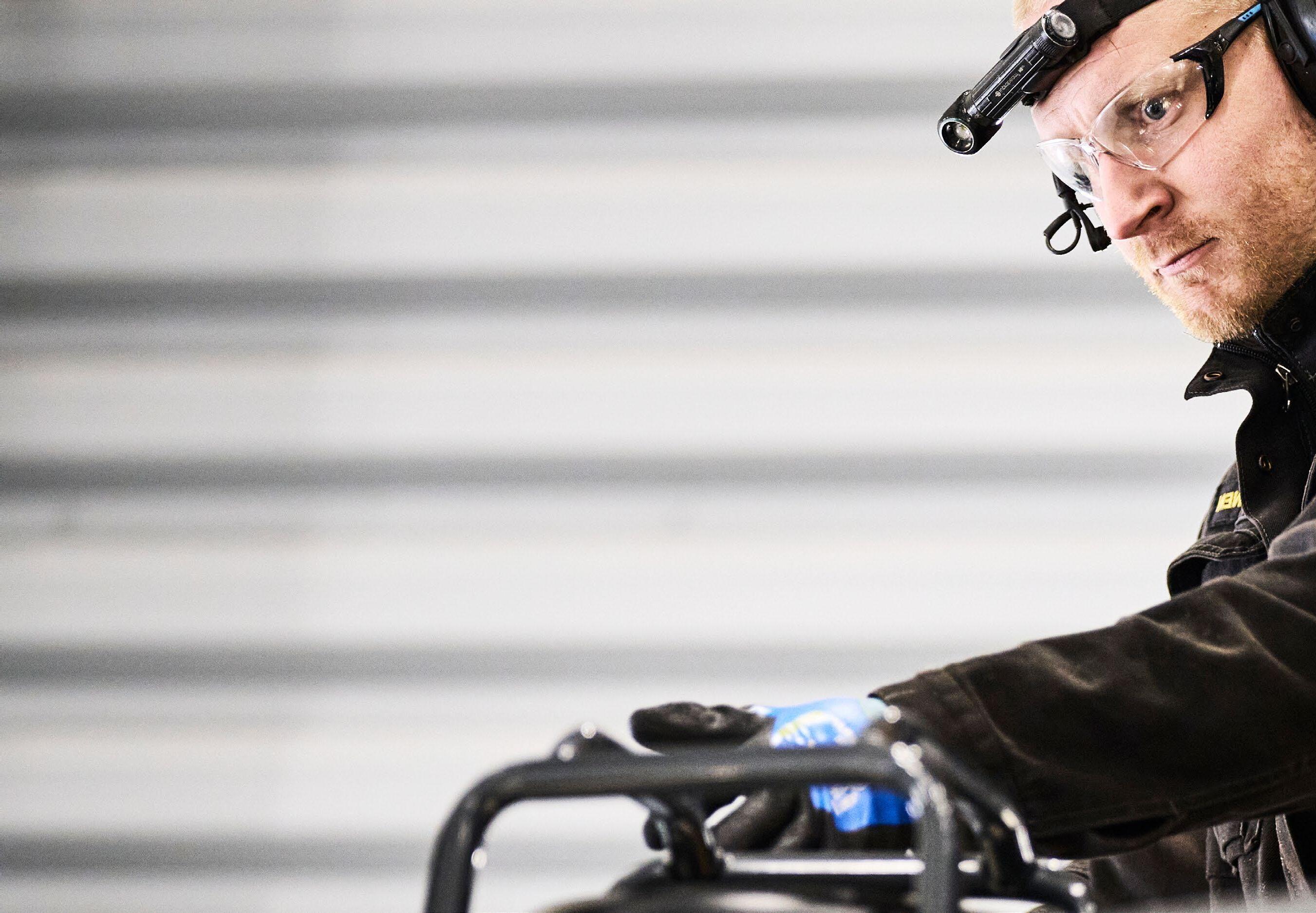
REACH and conflict minerals regulations
During 2022, we collected information about our supplier network in accordance with the obligations set out in the registration, evaluation, authorisation and restriction of chemicals (REACH) and conflict minerals regulations. At the same time, we disseminated information about legal obligations to our supplier network, including the reporting of substances of very high concern (SVHC) to the European Chemicals Agency’s (ECHA) SCIP database. The responses received cover 70% of our suppliers.
Regulation (EU) 2017/821 of the European Parliament and of the Council laying down supply chain due diligence obligations for Union importers of tin, tantalum and tungsten, their ores, and gold originating from conflictaffected and high-risk areas (conflict minerals regulation) and the Finnish act on conflict minerals (Government Proposal 203/2020) based on the EU regulation promote the responsible procurement of minerals and metals. The aim is to prevent the funding of armed groups through trade in minerals originating from conflict areas and violations of human rights related to the minerals industry. The REACH regulation guides the registration, evaluation, authorisation and restriction of chemicals hazardous to health or the environment. The aim is to replace SVHCs with safer options.
26 01
Environmental impact of production
We manufacture all PONSSE forest machines in Vieremä. The environmental impact of our production comes from energy and raw material consumption, the use of chemicals, and solvent emissions from surface treatment. Our operations have an environmental permit and a licence granted by the Finnish Safety and Chemicals Agency (Tukes) for the storage and handling of chemicals.
Environmental responsibility
Energy consumption
The majority of the energy consumed in our factory is renewable. The electricity we purchased during 2022 was renewable 100% guarantee-oforigin hydropower. In addition, we generated 123 MWh of electricity using solar panels. The factory is heated through district heating, of which 99.9% was renewable in 2022, mainly generated using wood fuels. The factory’s production machinery is also operated using renewable energy, either electricity or renewable diesel. The only fossil source of energy used in production is the liquefied petroleum gas (LPG) used at the paint shop. A total of 93% of the energy consumed at our factory has been generated using renewable sources. We will modernise our building systems in conjunction with production technology and
27 01
property investments to enable energy efficiency and a proactive approach to maintenance needs. In 2022, we achieved 27 MWh annual savings in electricity when our buildings in Vieremä switched to more energy-efficient LEDs, and a time-control system was installed for outdoor lighting. By checking the adjustments of ventilation machines, we achieved annual savings of 166 MWh in district heating and 89 MWh in electricity. Combined, we achieved energy savings of 282 MWh at the factory. We also conducted an energy audit of energy savings potentials and emissions reductions in surface treatment. The investigation focused on replacing the LPG used at the paint shop by a renewable fuel and improving the recovery of heat. ENVIRONMENTAL RESPONSIBILITY IN PRACTICE
Waste recycling
We aim to minimise the generation of waste, mixed waste in particular. We sort all waste generated so that it can be optimally reused, recycled as material, or used as energy. Currently, we can recycle all cardboard, paper, plastic and metal waste generated in our production.
Fuel emissions
When a new forest machine is completed on the production line, we fill it with light fuel oil or diesel according to the requirements of the customer and the country of destination. In 2022, renewable diesel accounted for 24% of all fuel used as the first tank of fuel, up by 3% from the previous year. From the beginning of 2020, we have only used diesel made from renewable raw materials in our production which has reduced the fossil emissions of our production by 20%. The emissions generated by the first tank of fuel are included in Ponsse’s own emissions (Scope 1), as 75% of fuel is consumed during machine testing and delivery. If renewable diesel is used in a machine throughout its lifecycle, the machine’s fossil carbon footprint will decrease by more than 90% according to a life cycle assessment (LCA). In 2022, a bio-based hydraulic oil was selected as the first tank of oil in 18.3% (16%) of our new machine deliveries.
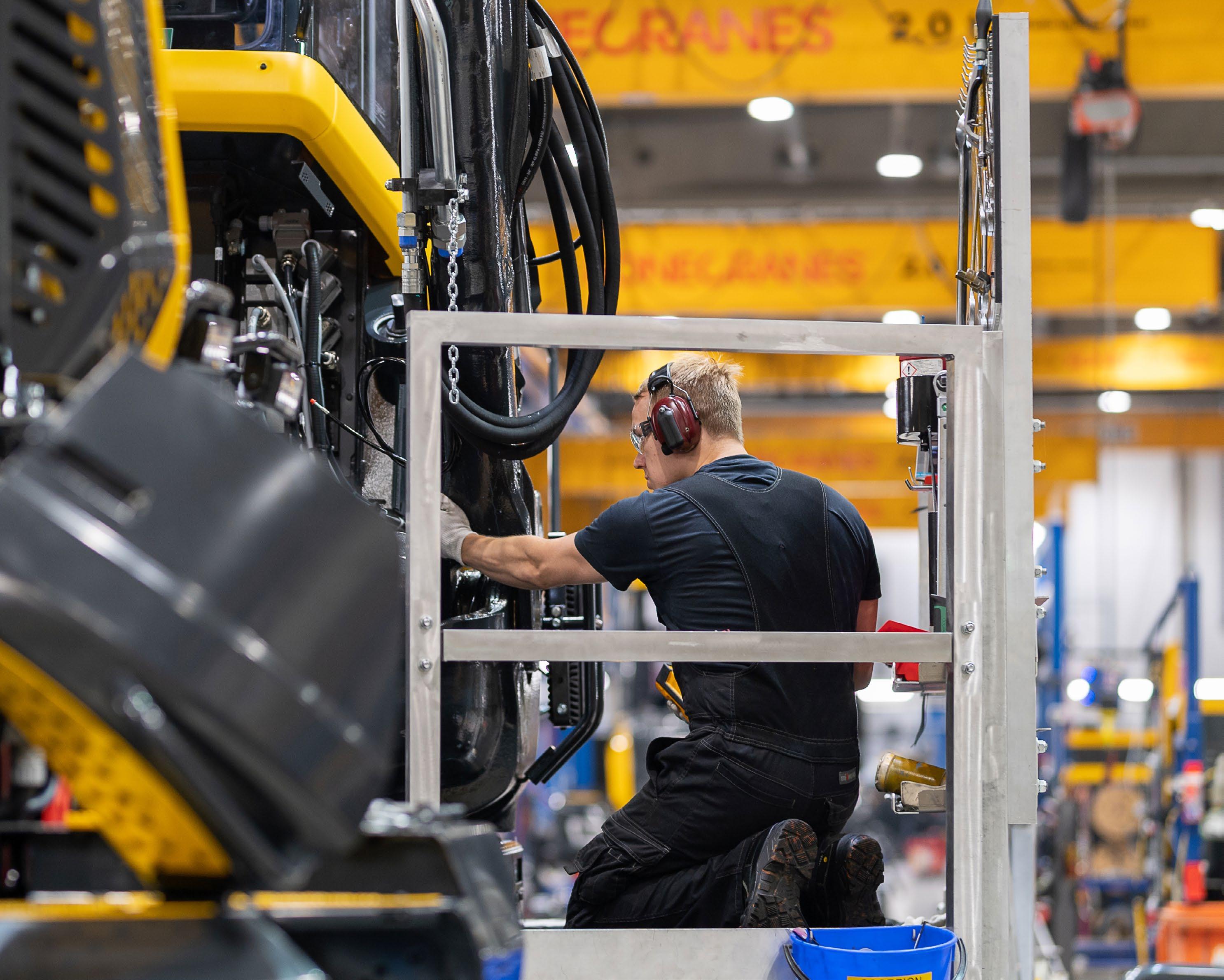
01
Emissions from test drive operations
Post-production machine testing produces emissions during transport and test drive operations through fuel consumption. We use our own transport equipment to transport PONSSE forest machines completed in production for test drive operations, to our customers in Finland and to Iisalmi railway station for further exportation. A total of 79% of all machines produced is exported, and all export machines are transported to the port energy-efficiently and with low emissions by rail.
Part of the test drive process for completed machines takes place in groundwater areas. In 2022, we participated in the revision of the groundwater area protection plan of YläSavon Vesi. At the same time, we reviewed our management of risks associated with the environmental impact of test drive operations.
We carry out test drive operations as assigned by each forest company and comply with their harvesting instructions and Forest Stewardship Council (FSC)’s certification criteria in harvesting operations. The FSC criteria also require environmental impact and values, including biodiversity, to be addressed in the processing of commercial forests.
We do not store any fuels in groundwater areas and always carry comprehensive oil leak response equipment with us during test drive operations. Test drive operations are preceded by production testing to ensure the functioning of the machine and the integrity of hose connections, among others. To reduce the carbon footprint, we replaced the diesel used in tested machines with renewable diesel, while fuel oil is still used as the first tank of fuel in certain machines based on customer requests.
29 01
Exported machines are delivered to the port with low emissions by rail.
Environmental responsibility
Environmental impact of products and services
We are committed to developing sustainable and innovative harvesting solutions. According to our stakeholders’ expectations, environmental aspects have become significant guiding factors in R&D. The sustainability of our customers’ operations is also affected by our investments in minimising fuel consumption, fuel, and tree and soil damage, as well as in the continuous development of our maintenance service processes.
Lifecycle emissions
We have identified the environmental impact generated during the lifecycle of Ponsse’s products and services using LCAs in accordance with the ISO 14040 standard. During the assessments, we have investigated the environmental impact arising from the manufacturing and transport of machines, their use in different conditions, and machine maintenance. The majority of lifecycle emissions contributing to global warming, roughly 95%, comes from the consumption of fuel in machines and the production of fuel. The highest transport emissions are
associated with machine deliveries from the Vieremä factory to customers and the transport of machines between stands.
R&D focuses continuously on reducing the consumption of fuel and oil during machine operations. Fuel efficiency, meaning the consumption of fuel relative to the volume of wood harvested, is a key cost factor in harvesting, which is why our development is guided by both financial and environmental factors. Our R&D allows PONSSE forest machines to be compatible with renewable fuels and hydraulic oils.
30 01
ENVIRONMENTAL RESPONSIBILITY IN PRACTICE
Machine maintenance
During maintenance, the most significant environmental factors are the oils, tyres and spare parts used in machines. Ponsse’s authorised maintenance service network takes care of the appropriate handling of waste. The focus in our maintenance services is on preventive maintenance to avoid any unexpected breakage and carry out maintenance safely for the environment and mechanics. Regular machine maintenance and inspection included in maintenance agreements ensure that machines operate optimally and as planned without any breakage. This also eliminates any unnecessary consumption of material and extends the machine lifecycle. In 2022, the coverage of maintenance agreements was 36% in our new machine sales.
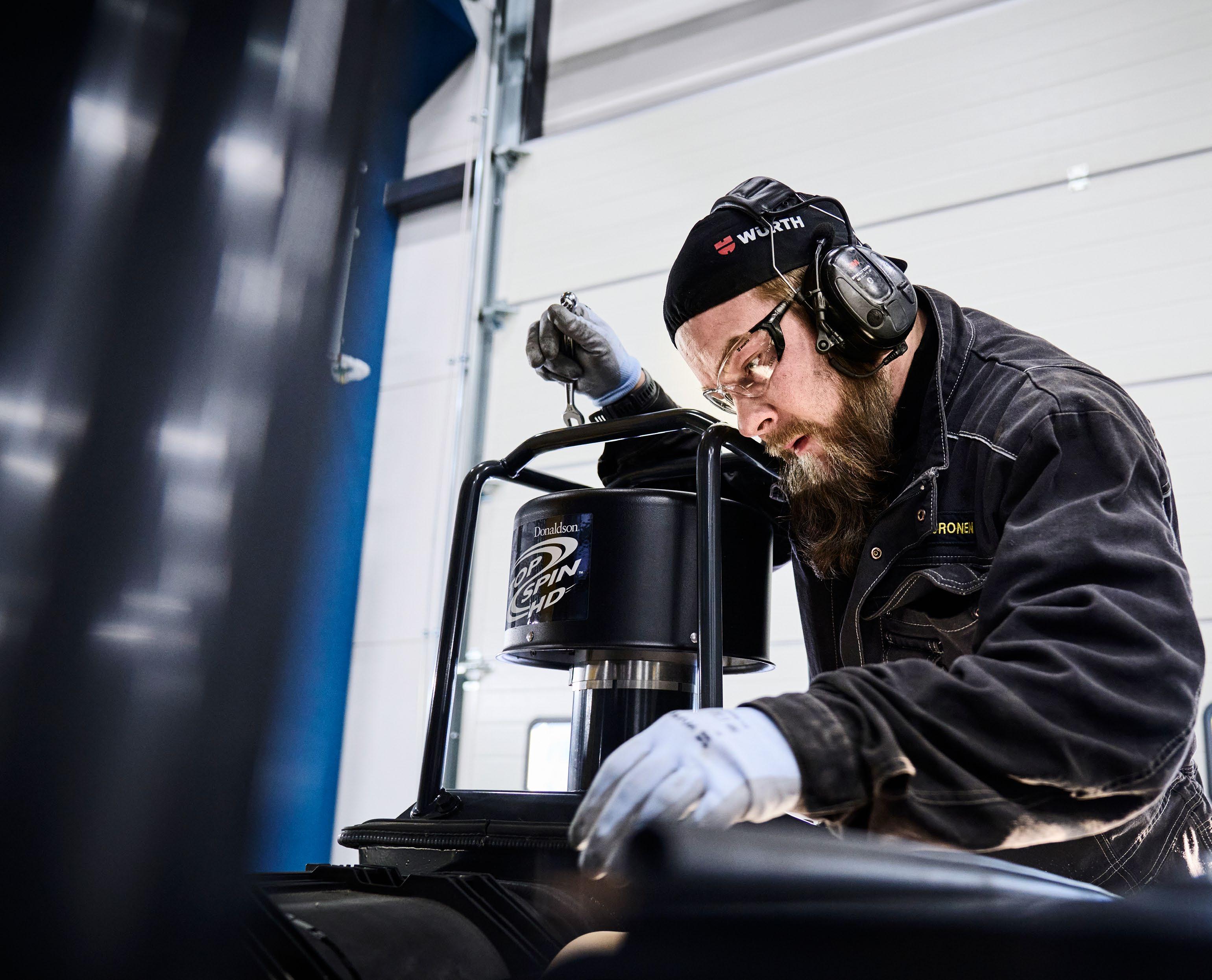
01
Ponsse’s authorised maintenance service network takes care of the appropriate handling of waste.
Environmental responsibility
Cut-to-length harvesting
PONSSE forest machines are based on cut-to-length (CTL) harvesting. Machines have been developed to utilise the highly valuable wood raw material and cause the least damage to the soil. Nordic expertise and methods related to the sustainable use of forests offer a solution to minimise global forest loss, while renewable wood is required as a raw material to replace plastic and concrete. Regeneration methods and obligations in commercial forests, harvesting technologies and forest management methods play an important role when forest resources are required for carbon sequestration and as raw materials, not forgetting biodiversity in forests.
The advanced computing capacity of CTL forest machines allows the best possible value to be extracted from forests. This means more than financial gain. By optimising the yield
and processing value of the raw material, the maximum amount of sawn timber with a long-term carbon sequestration capacity can be produced.
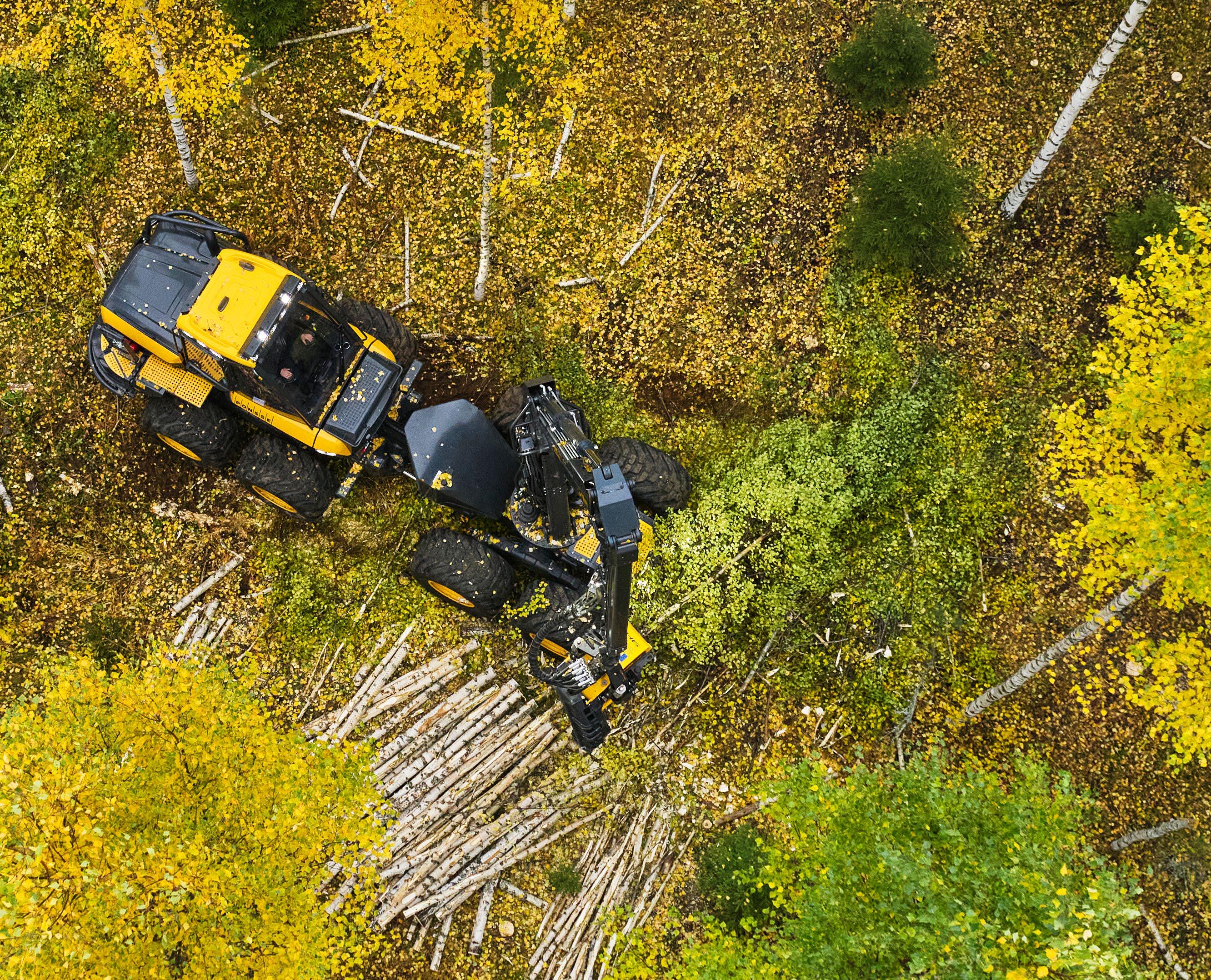
01
YOUR P A R T NER IN S U S T BANIA L E F RTSERO Y ENVIRONMENTAL RESPONSIBILITY IN PRACTICE
CTL machines support all harvesting methods from first thinning to continuous cover forestry and regeneration felling. For all harvesting methods, we make sure that the forest can regenerate quickly and reliably – as only the healthy growth of the next tree generation enables the continuation of the forest cycle and the regeneration of the raw material. To enable different harvesting methods, our machines must be balanced and strong, allowing for the long crane reach required at thinning sites.
The aim of CTL harvesting is to minimise machine trails. Eight-wheeled PONSSE forest machines have a balanced weight distribution, and correctly selected tracks can have a significant impact on machine trails. Forwarders have the greatest impact on trails because they drive over the same path multiple times. CTL harvesters typically leave branches and crowns on the trail to protect the soil from forwarders. Large load spaces also mitigate machine trails because capacious machines need to make fewer runs.

33 01
Ponsse’s machines have been developed to minimise machine trails at logging sites.
Environmental responsibility
Pioneering the circular economy: Reman & Parts Recirculation
Ponsse’s circular economy competence is particularly strong in the spare parts and used machine business. We sell and refurbish used machines in all our market areas and also spare parts in an increasing number of market areas. Used machines refurbished by professional mechanics can be updated using various performance packages to meet modern standards.
In addition to new parts, Ponsse provides its network with refurbished and reused spare parts. They support Ponsse’s goals of developing material efficiency and becoming carbon neutral.
Recycled parts are an environmentally friendly option for forest machine maintenance, as we can effectively allocate resources tied to damaged spare parts to remanufacturing and reuse. In previous LCAs, the carbon footprint of a single remanufactured part was found to be a quarter smaller than that of a new part. Ponsse’s circular economy model has been developed based on the company’s needs to promote the conversion of material flows into usable format and reduce the consumption of raw materials.
During 2022, a total of 150,000 kg of spare parts were refurbished or delivered for reuse.
Ponsse has remanufactured spare parts for forest machines at the Reconditioning and assembly centre in Iisalmi since 2010. The focus is on the refurbishing of mechanical transmission parts, but the Reman range also includes hydraulic parts and forest machine information systems. The Spare parts reuse centre, established in 2020, is located in the immediate vicinity of the Reconditioning and assembly centre. It receives damaged parts from customers, the factory and the sales network, and assesses their reuse potential following the principles of the circular economy. Both units work in close cooperation with
34 01
ENVIRONMENTAL RESPONSIBILITY IN PRACTICE
Ponsse's used machine services, in which used forest machines are maintained and updated to extend their lifecycle under the ownership of 2–4 new owners. When a machine finally reaches the end of its service life, it can be dismantled. Usable parts will be refurbished to make low-cost spare parts, while any unusable parts will be recycled as material. More than 90% of a forest machine’s weight constitutes recyclable material, mainly steel and cast iron.
In 2022, Ponsse expanded its refurbishing operations to local subsidiaries. As a result, services are provided closer to customers, without needing to transport damaged parts over long distances for remanufacturing. Greenhouse gas emissions can also be reduced by minimising the amount of transported cargo. To support local refurbishing operations, Ponsse has developed refurbishing kits for various parts, consisting of the most typical components replaced during refurbishing.
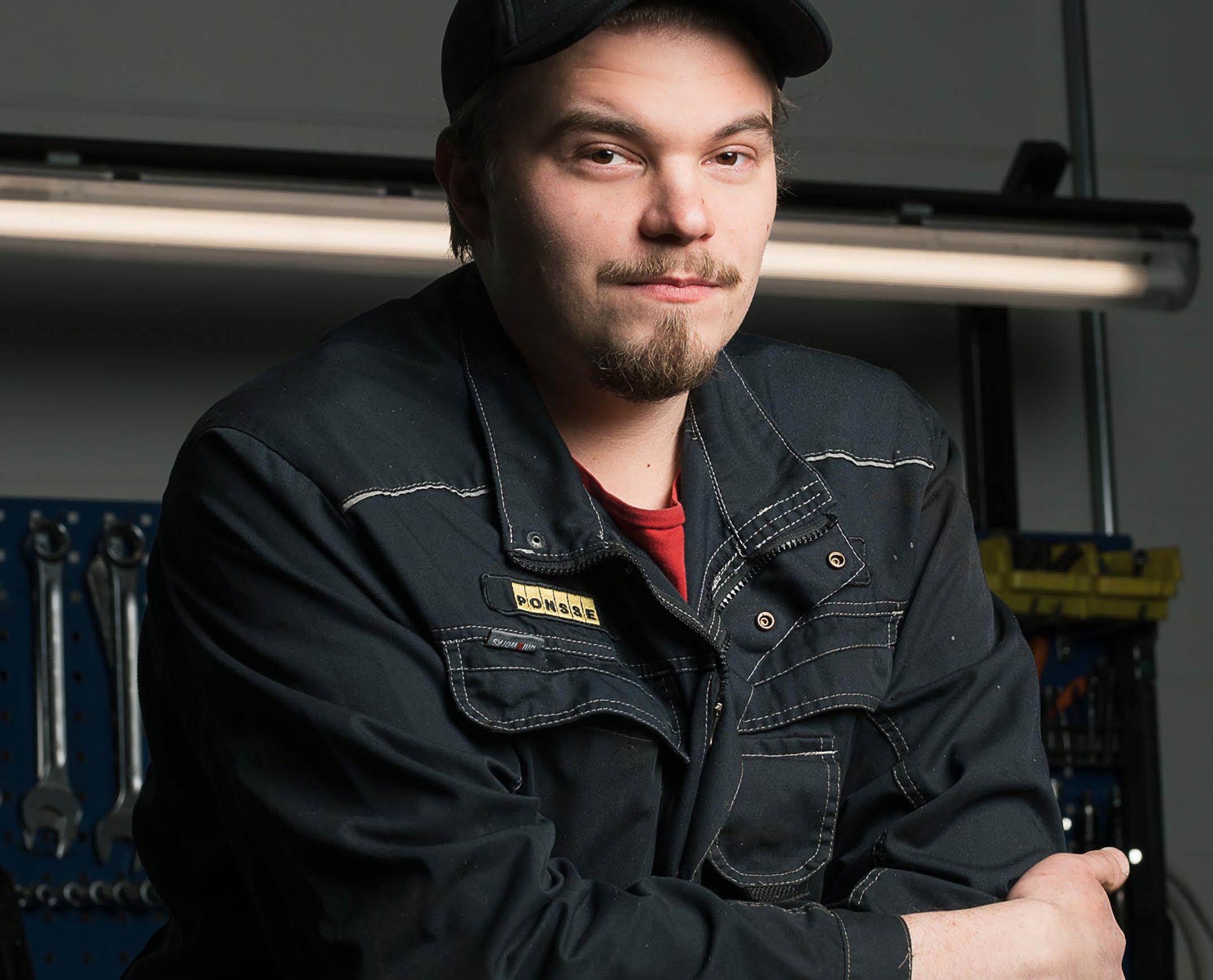
01
In 2022, Ponsse expanded its refurbishing operations to local subsidiaries.
Environmental responsibility
Social responsibility
We improve the wellbeing of our people
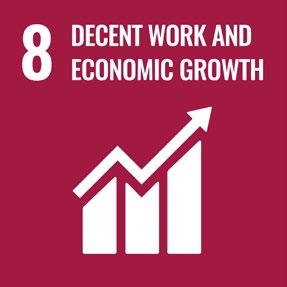

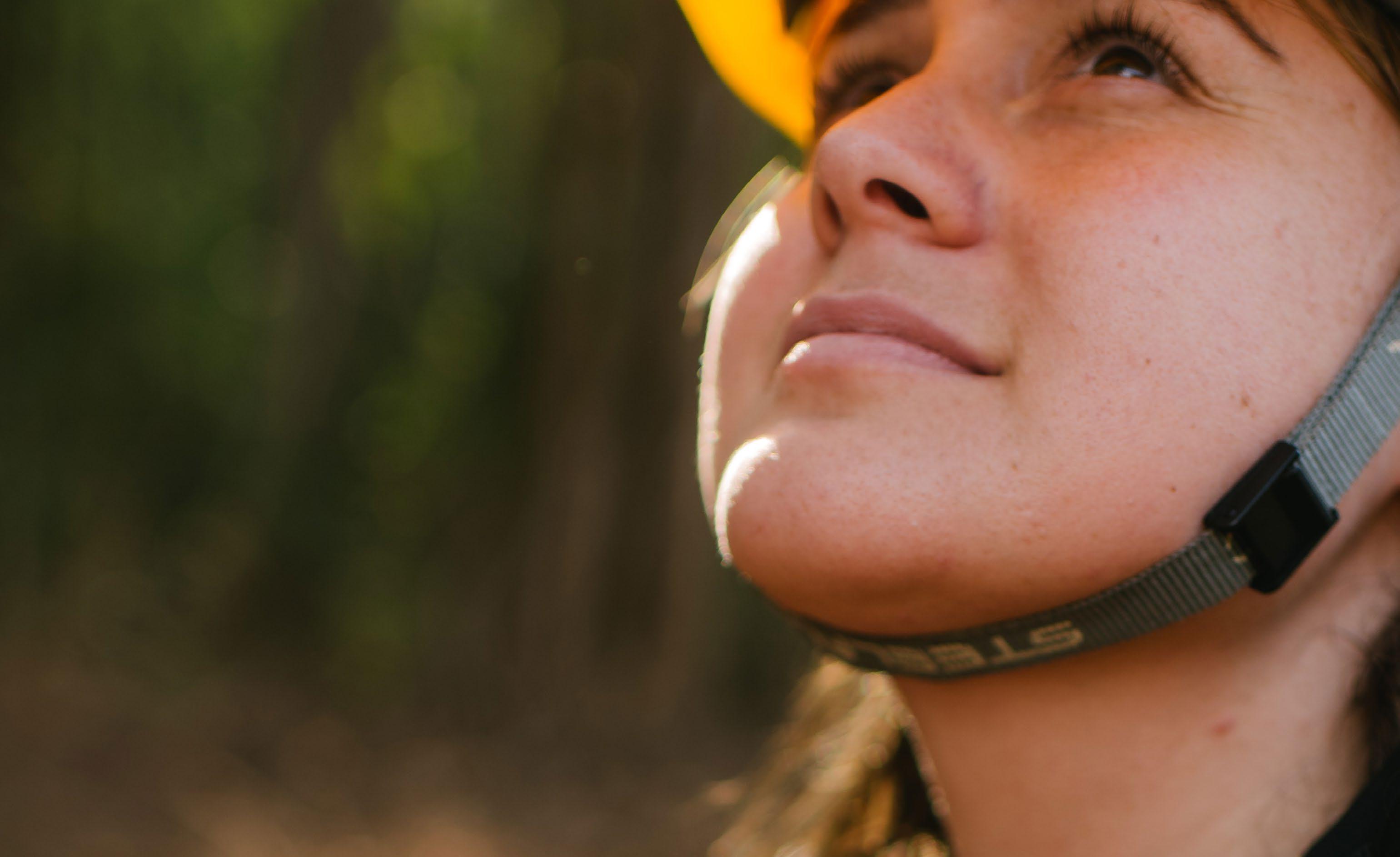
36 02
We improve the wellbeing of our people
Ponsse is an equal and non-discriminating working community, in which everyone can work safely.

We appreciate one another and take good care of each other, and our customers and network. Our machines are safe and ergonomic for their users.
92.4%
37 02
OUR PRINCIPLE
Of our emplyees completed the Code of Conduct training in 2020.
Social responsibility
Commitments and human rights
At Ponsse, social responsibility means responsibility for the impact of our business activities on people, and continuously aiming to have a positive impact on our people and community. Ponsse has a strong value base that steers us to respect people and cooperation, and to develop our operations as part of our community.
In our Code of Conduct, we are committed to respecting internationally recognised human rights, including international conventions on human rights and the ILO Declaration on Fundamental Principles and Rights at Work.
We are also committed to complying with the UN Guiding Principles on Business and Human Rights. We do not accept child labour or other forms of forced labour in any circumstances. If we discover any shortcomings related to human rights, we are committed to intervening in them and engaging in cooperation to develop the activities in question.
Training regarding the Code of Conduct approved by the company’s Board of Directors in June 2020 was completed by 92.4% of our employees and 65% of contact people in our retail network in 2020. The Code of Conduct and related training will be updated in 2023. According to our induction programme, each new employee must complete Code of Conduct training. The Code of Conduct is available on our website.
38
02
SOCIAL RESPONSIBILITY IN PRACTICE
Each new employee must complete Code of Conduct training.
Social responsibility
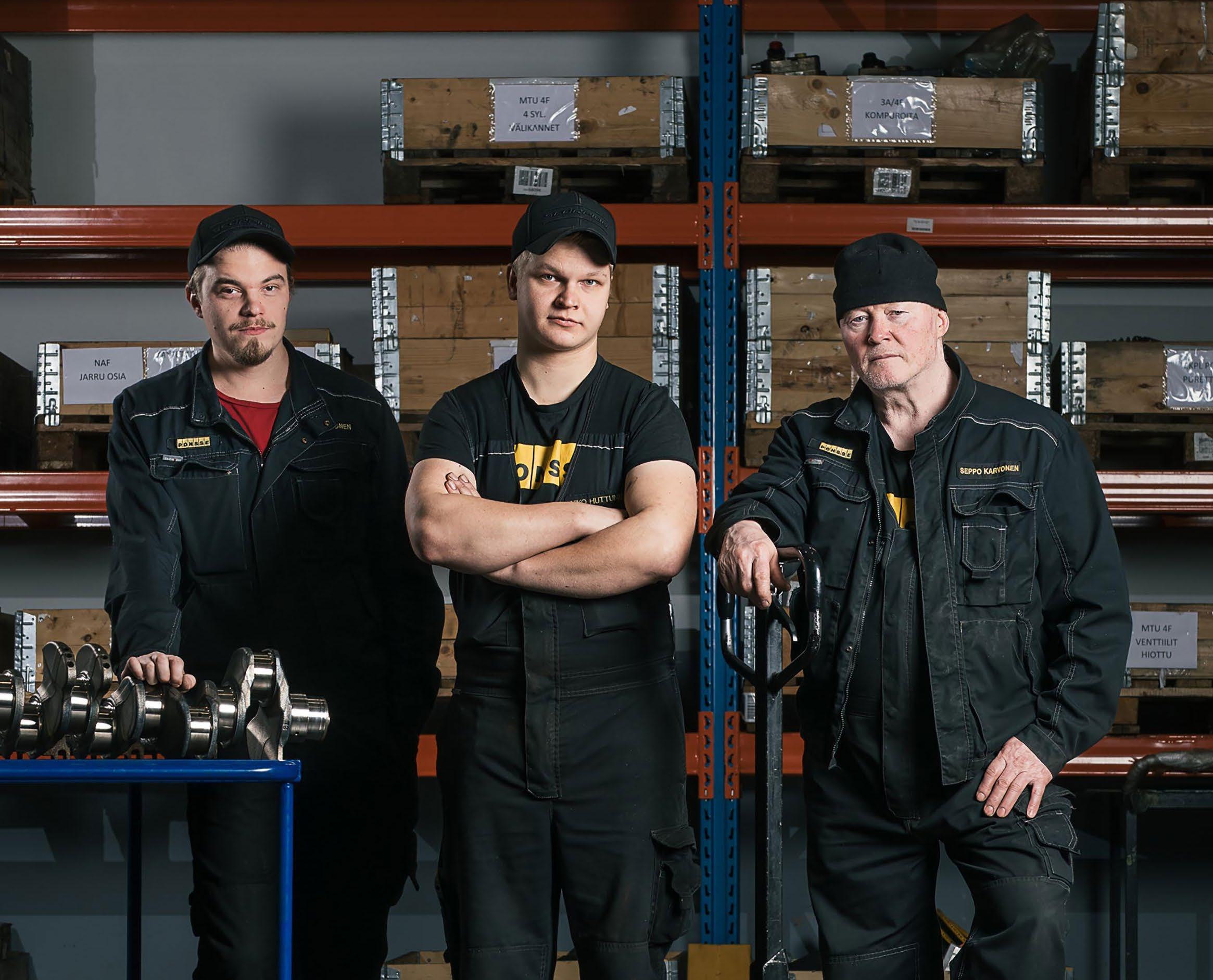
02
Equal and skilled personnel who feel well
At Ponsse, we comply with the ISO 45001 standard for occupational safety and health management. We want to offer our employees a safe and healthy working environment and be an equal and reliable employer. Our goal is to be a developing workplace and have responsible, healthy and competent employees who are treated with equal respect.
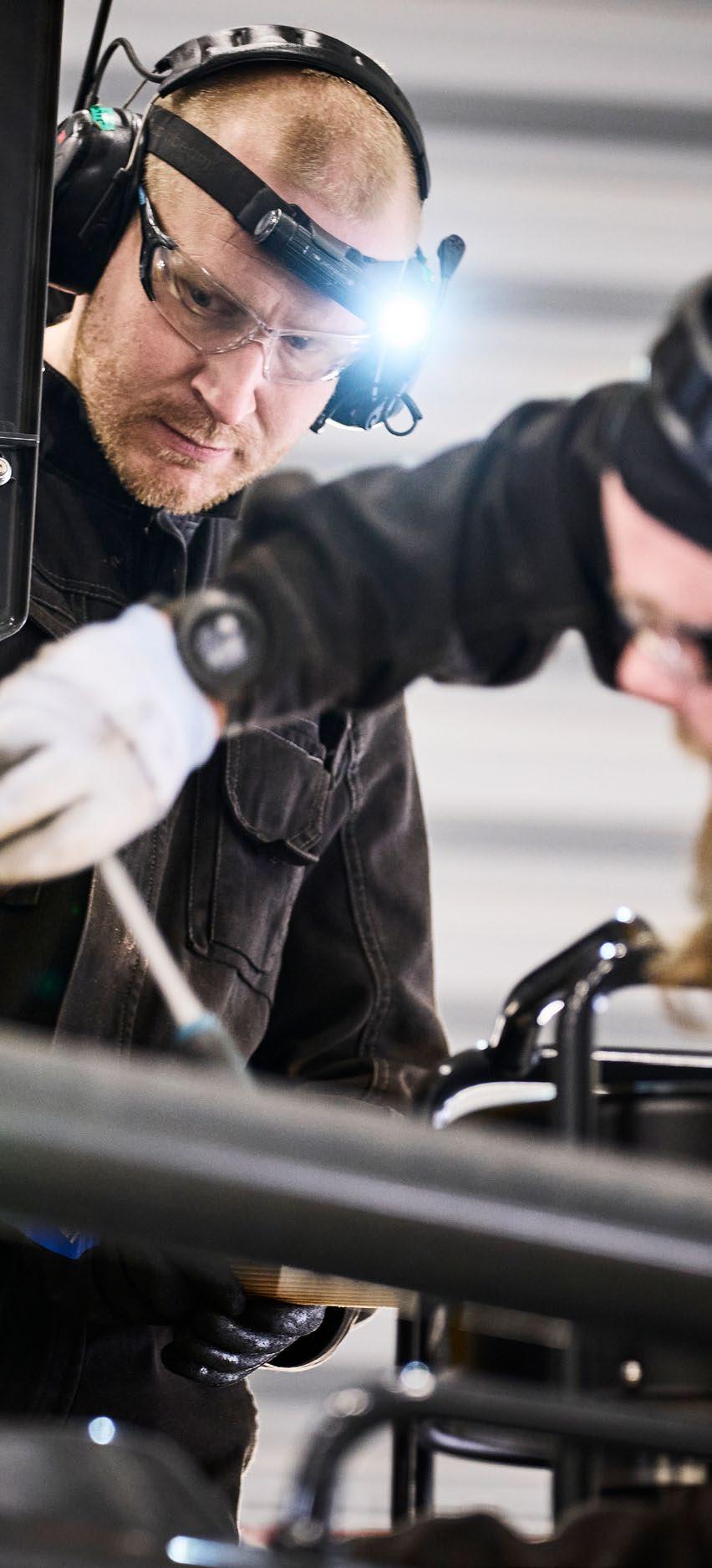
Personnel at the end of 2022
The number of our personnel increased by 2.8% (55 people) from 2021 being at the end of the year 1,988 employees. The most significant changes in personnel resulted from the establishment of the new subsidiaries Ponsse Czech s.r.o and Ponsse Chile S.p.A, and the suspended operations of OOO Ponsse, our subsidiary in Russia.
Impact of the situation in Russia
We report personnel figures excluding our Russian subsidiary regarding 2022 and comparative years. Ponsse’s export and service operations in Russia and Belarus were suspended on 2 March
2022. At the end of June, Ponsse announced the divestment of OOO Ponsse, its subsidiary in Russia, but the Russian authorities have not yet confirmed the transaction.
Due to the situation in Russia, we were forced to invite Ponsse Plc’s personnel in Finland to cooperation negotiations in June 2022. The needs for adaptations were related to the Russian invasion of Ukraine and the resulting stoppage in exports to Russia, the increase in manufacturing costs, and the decrease in profitability and cash flows. As a result of the cooperation negotiations, the employment relationship of 23 people ended.
40 02
SOCIAL RESPONSIBILITY IN PRACTICE
Personnel at the end of 2022
Social responsibility
1,988 employees (2021: 1,933)
in the group’s continuing operations
1,140 (1,154) employees in Finland (including the subsidiary Epec Oy)
848 (779)
employees in Sweden, Norway, Ireland, the UK, France, the Czech Republic, China, the USA, Brazil, Uruguay and Chile
100%
of our personnel within the scope of performance reward schemes
41
02
Equality and non-discrimination
We comply with our equality and nondiscrimination plan, which was updated in 2021. Its goal is that all Ponsse employees feel treated equally without any discrimination.
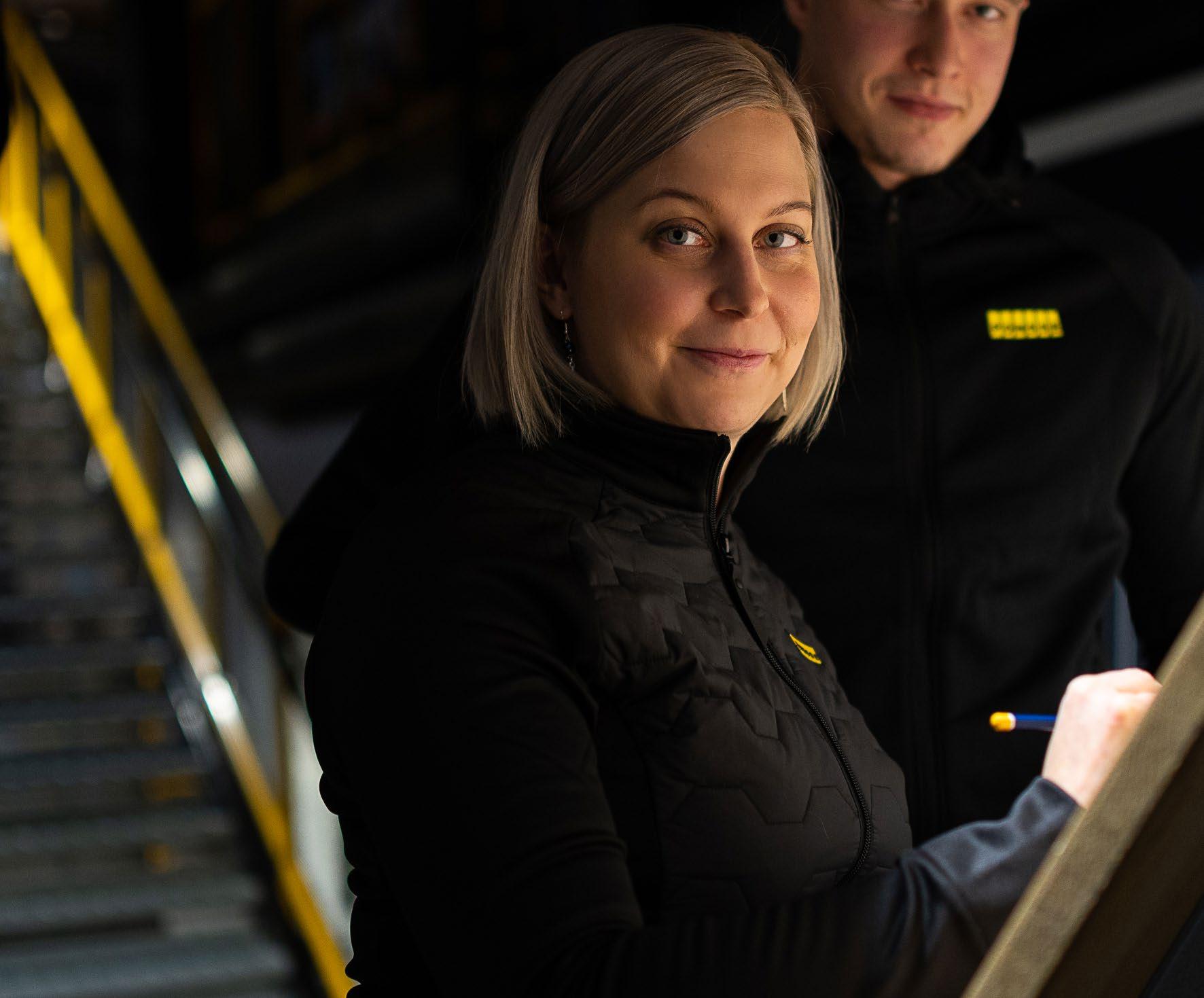
• We do not accept any discrimination against our employees or job applicants based on any personal reasons.
• We promote an equal, nondiscriminating and diverse work culture.
• We do not accept any form of harassment or bullying.
• Employees can freely decide whether they want to belong to a trade union and/or participate in codetermination in their workplace.
• All employees have equal opportunities to apply for various positions and to advance in their careers in accordance with their education and competence.
• As a rule, everyone can apply for vacancies.
• Ponsse facilitates coordination between work and leisure through working hours arrangements, remote work opportunities and by adopting a positive approach to the use of family leave.
42 02
SOCIAL RESPONSIBILITY IN PRACTICE
A pay survey was conducted in 2021 for the personnel in Finland regarding the job classification, remuneration and pay differences between men and women. No significant differences were identified between the pay of men and women. Ponsse conducts the pay survey every three years and the company’s personnel group revises the equality and non-discrimination plan every year. In 2022, the ratio between men and women among Ponsse Group’s employees was 88/12 (89/11). Among supervisors, the percentage of women increased to 14% (12%). Our aim has been to find new ways to improve the attractiveness of the forest and technology industries, but have not so far been able to achieve any major change in the gender distribution of job applicants. Considering the company’s growth and development, it is important for Ponsse to recruit the best professionals in the field, regardless of the gender or other personal background.
In 2022, we participated in the “Dismantling segregation” project of the Finnish Institute for Health and Welfare (THL).
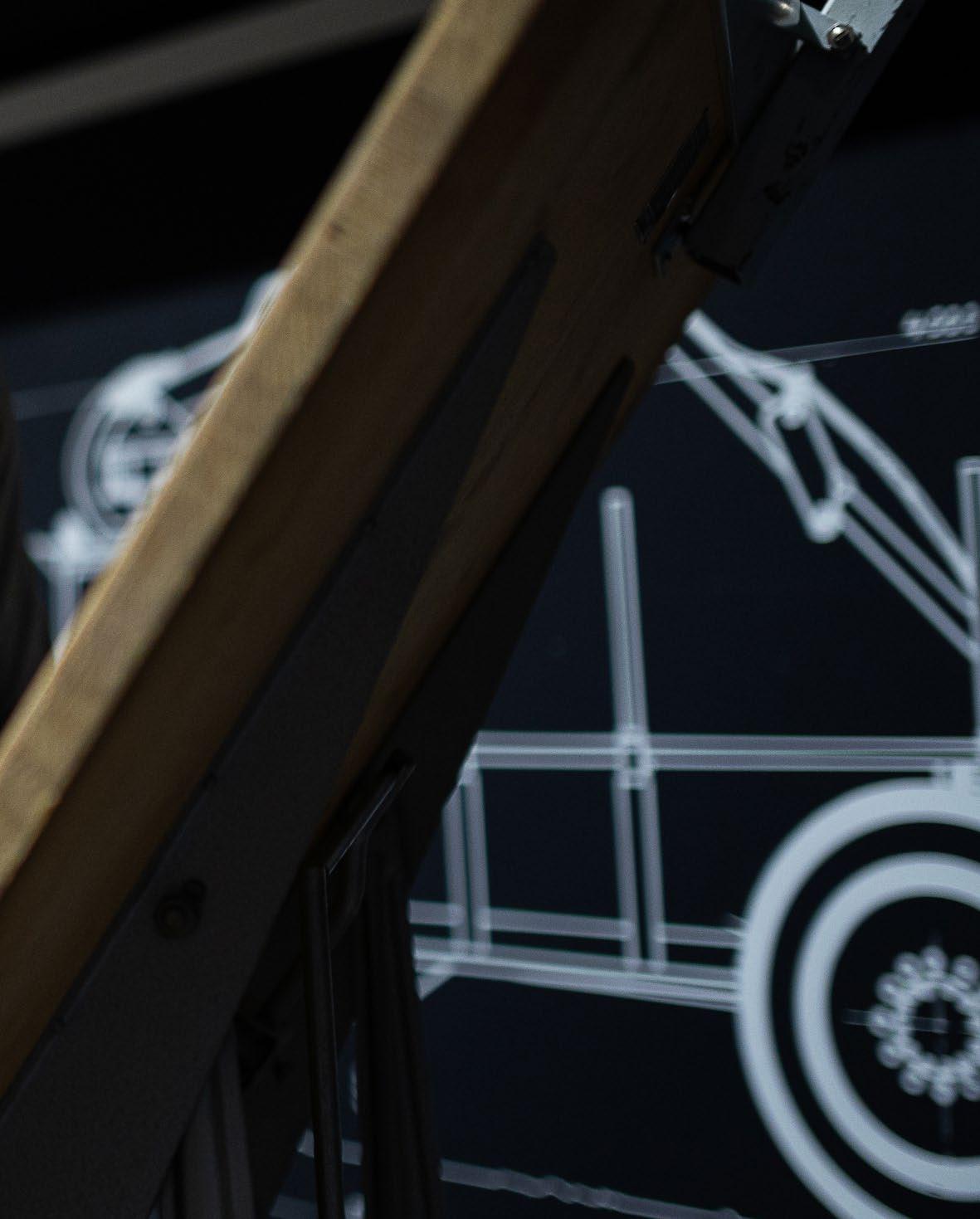
Social responsibility
The company’s personnel group revises the equality and non-discrimination plan every
43 02
year.
Ensuring skilled employees
We want to ensure that we have skilled and professional employees through regular training and job rotation opportunities. We identify training needs during performance appraisals. In addition, we support the personnel’s voluntary training, including degree programmes. We prepare for the development of future technologies by identifying competence needs.
To advance our personnel’s competence and recruitment, we are engaged in cooperation with universities, universities of applied sciences and vocational schools. We also provide vocational training in our facilities through the “Ponsse Polku” (Ponsse Training Path) programme of Ylä-Savo Vocational College. Mechanics and welders have already been trained through the programme for more than ten years now. The training programme has been a significant recruitment channel for us, with nearly 200 students having participated in it.
In 2022, we also started student programmes with the University of Tampere and Savonia University of Applied Sciences. The “Student
Deal” programme of the University of Tampere is intended for students completing a master’s degree in automation technology, while the target group of the “Digital Professional” programme of Savonia University of Applied Sciences consists of students of software development. The goal is to provide students with an opportunity to be engaged in working life during their studies and complete part of their studies during on-the-job training periods.
The availability of skilled employees has also presented a challenge to Ponsse in recent years. We are monitoring job applicants’ experiences in Finland through the NPS feedback survey conducted during recruitment. We have also
44 02
SOCIAL RESPONSIBILITY IN PRACTICE
expanded our operations in locations in which education in technology is provided. In Finland, Ponsse has units in Kajaani, Kuopio and Tampere in addition to the Vieremä factory and the maintenance service network, and also in Turku with our technology company Epec starting from 2022. Epec Oy’s production is located in Seinäjoki.
The reputation prizes given to our company in 2022 supported our employer image. In the Reputation&Trust survey, Finnish people ranked Ponsse as the second most reputable company and, according to private investors, Ponsse had the best reputation in Finland in terms of corporate responsibility.
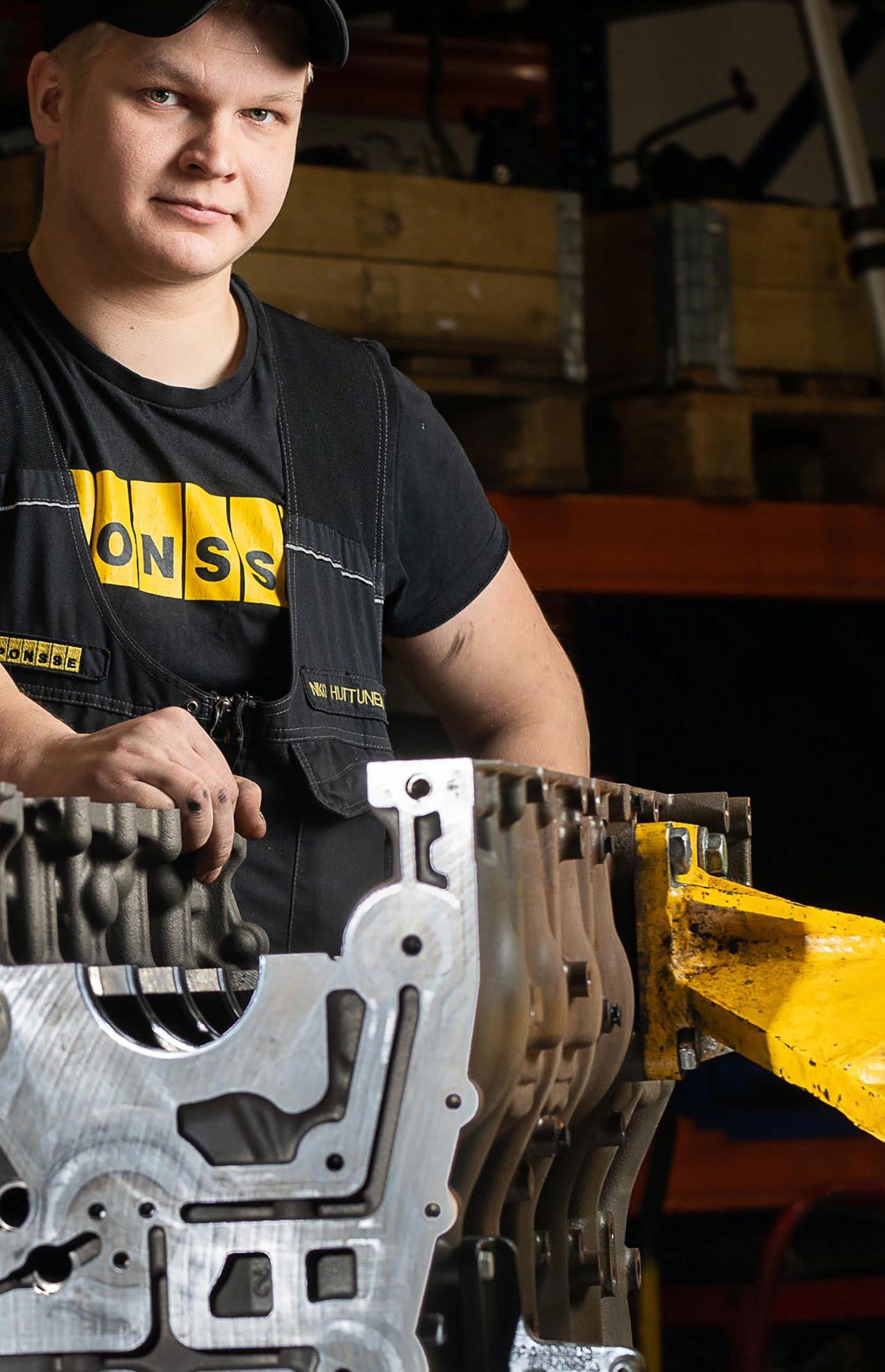
Social responsibility
02
According to private investors, Ponsse had the best reputation in Finland in terms of corporate responsibility.
All of the Group’s supervisors participate in the One Ponsse Leadership Programme.

46 02
Strategic goals and the Ponsse culture
Each year, we communicate and implement the company’s strategic goals relative to our functions and further to each employee’s personal goals. The goals are monitored through daily management and performance appraisals. Our goal for 2023 is to also develop performance appraisals into a regular process in our subsidiaries.
Our activities are guided by the One Ponsse principles:
• Customer focus
• Teamwork and responsibility
• Open and proactive communication
• Agile execution and transparency
• Common practices
In accordance with One Ponsse, we bear responsibility for what we do and for our common goals, without any organisational boundaries. This is visible to our customers as first-rate services and rapid responses to customer needs.
The One Ponsse principles are implemented in the daily activities of Ponsse’s employees through training and communication for all employees. All of the Group’s supervisors participate in the One Ponsse Leadership Programme, which provides guidance towards systematic and high-quality supervisory work.
47
02 Social responsibility SOCIAL RESPONSIBILITY IN PRACTICE
Measuring employee experiences and wellbeing at work
Motivated employees who feel well have a significant impact on work results and customer experiences. We monitor the employee experience and wellbeing of Ponsse’s personnel by the following means:
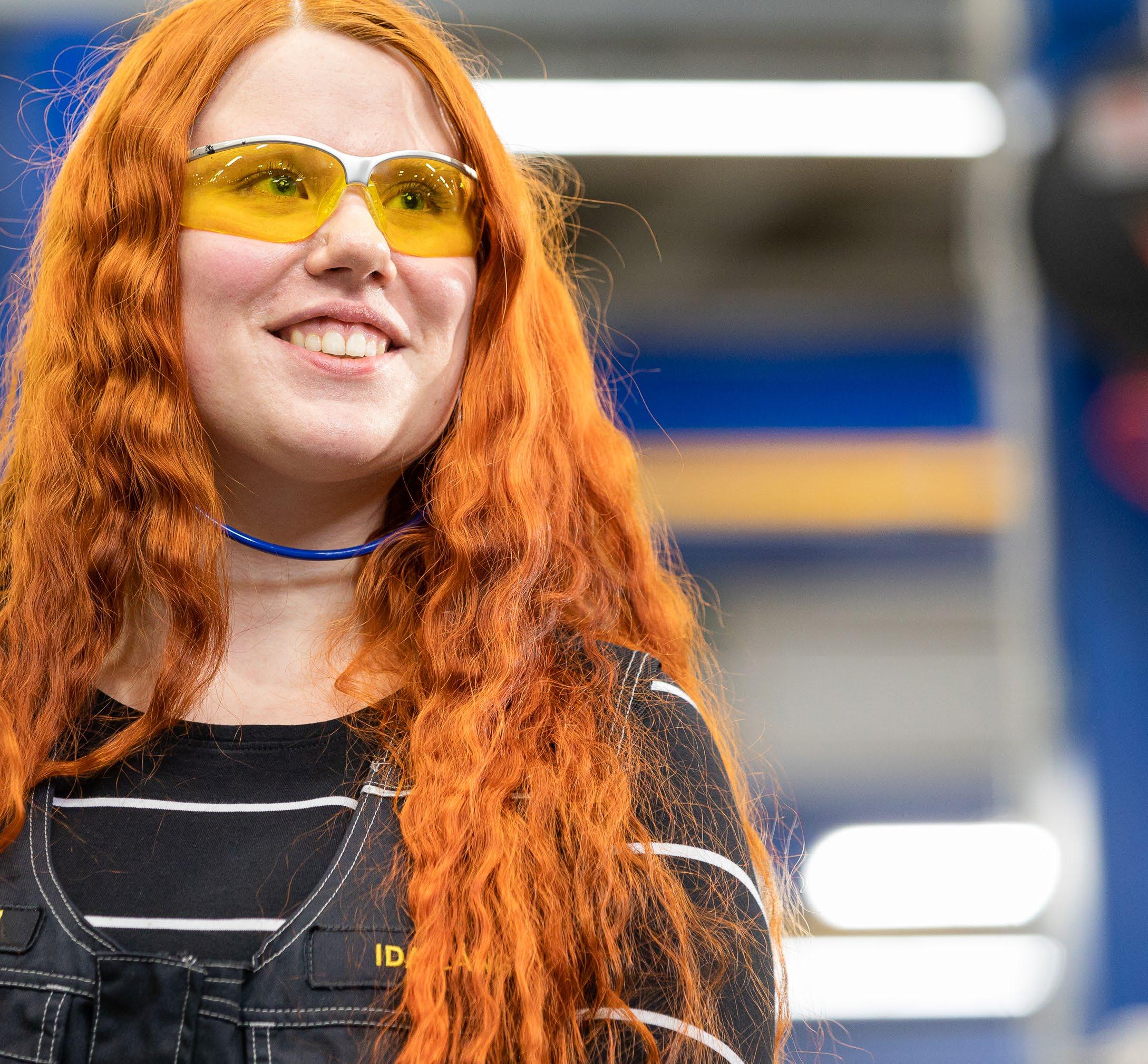
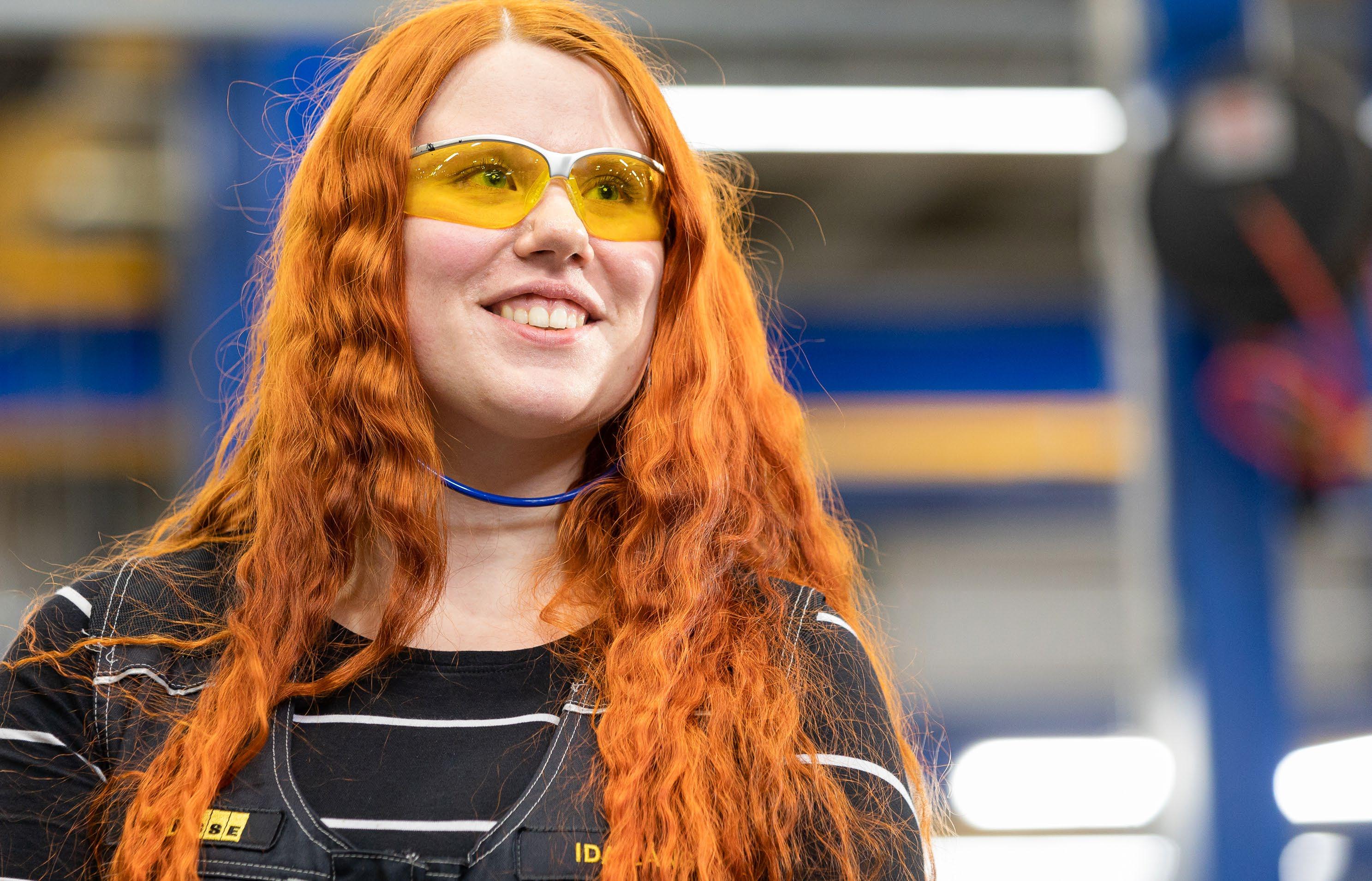
• Performance appraisals twice a year
• eNPS index to measure the employee experience and a wellbeing survey twice a year
• An annual survey to measure the quality of leadership
• Extensive personnel surveys every few years (previously in 2020, next in 2023)
02
SOCIAL RESPONSIBILITY IN PRACTICE
In 2022, the Group’s total eNPS score of 22 was at a good level. The score fell from 40 in the previous year, which is also defined as the limit of an excellent score. We have sought reasons and solutions for the decrease with our personnel. Discussions and open-ended feedback emphasised the amount of work and workloads, the level of pay relative to increasing living expenses, and challenges in the smooth flow of work. At the same time, Ponsse was considered a good employer, and Ponsse’s corporate culture was also hoped to remain at a high level in the future. Our goal for 2023 is to raise the eNPS score above the level of 40.
the results, the strengths of supervisory work include activities in accordance with the company’s values, related guidance, customer orientation, and encouragement to take responsibility. According to the feedback, we need to develop in communication and in motivating employees.
The voluntary employee turnover increased to 11.3% (7.2%). Differences between companies were relatively high. This change follows the general international trend, in which employee mobility on the job market has increased, driven by the increased popularity of remote and hybrid working. Our goal is to lower the Group’s employee turnover under 5%. The average duration of our employees’ careers increased slightly from the previous year to eight years (7.3).
In 2022, the annual survey to measure the quality of leadership had 1,244 respondents. The Group’s average score was 3.28 (3.25) on a scale from 1 to 4, which was in line with our target of >3. Based on The quality of leadership was in line with our target of >3
49
02
Our goal for 2023 is to raise the eNPS score above the level of 40.
Quality of leadership 4 3 0 1 2 2022 3.28 3.25 2021 Social responsibility
Key personnel figures 1)
Group personnel on 31 December
in Finland, % 2)
in other countries, %
50
Personnel
Permanent
Full-time
Average
Voluntary
Average
The personnel’s age distribution Under 30 years 30–49 years Over 50 years Women (Board of Directors/Management Team/supervisors), % Percentage of women from total personnel, % Salaries and wages, EUR million Personnel within the scope of performance reward schemes, % 1,988 58 42 97 97 8.0 11.3 39 22 59 19 13/13/14 12 107.9 100 3% -5% 8% 0% -1% 10% 57% 3% -8% 5% -5% -7%/0 %/17% 9% 23% 0% 1,933 61 39 97 98 7.3 7.2 38 24 56 20 14/13/12 11 87.7 100 1,727 64 36 94 97 7.7 4.0 40 22 58 20 14/11/10 11 78.2 100 3) 4) 4) 5) 5) 6) 7) 8) 9) 5) 5) 2022 Change, % 2021 2020
6)
7)
8)
9)
02
Personnel
personnel, %
personnel, %
duration of employment, years
employee turnover, %
age of personnel, years
1)
Continuing operations 2) The figure includes the personnel of Epec Oy (176 employees), Ponsse Group’s subsidiary in Finland
3) On 31 December 2022 4) Annual average 5) The share of the personnel on 31 December
Group personnel / duration of employment
Total number of leavers / annual average
Average age by company, from which the group average
Personnel by age distribution / ratio
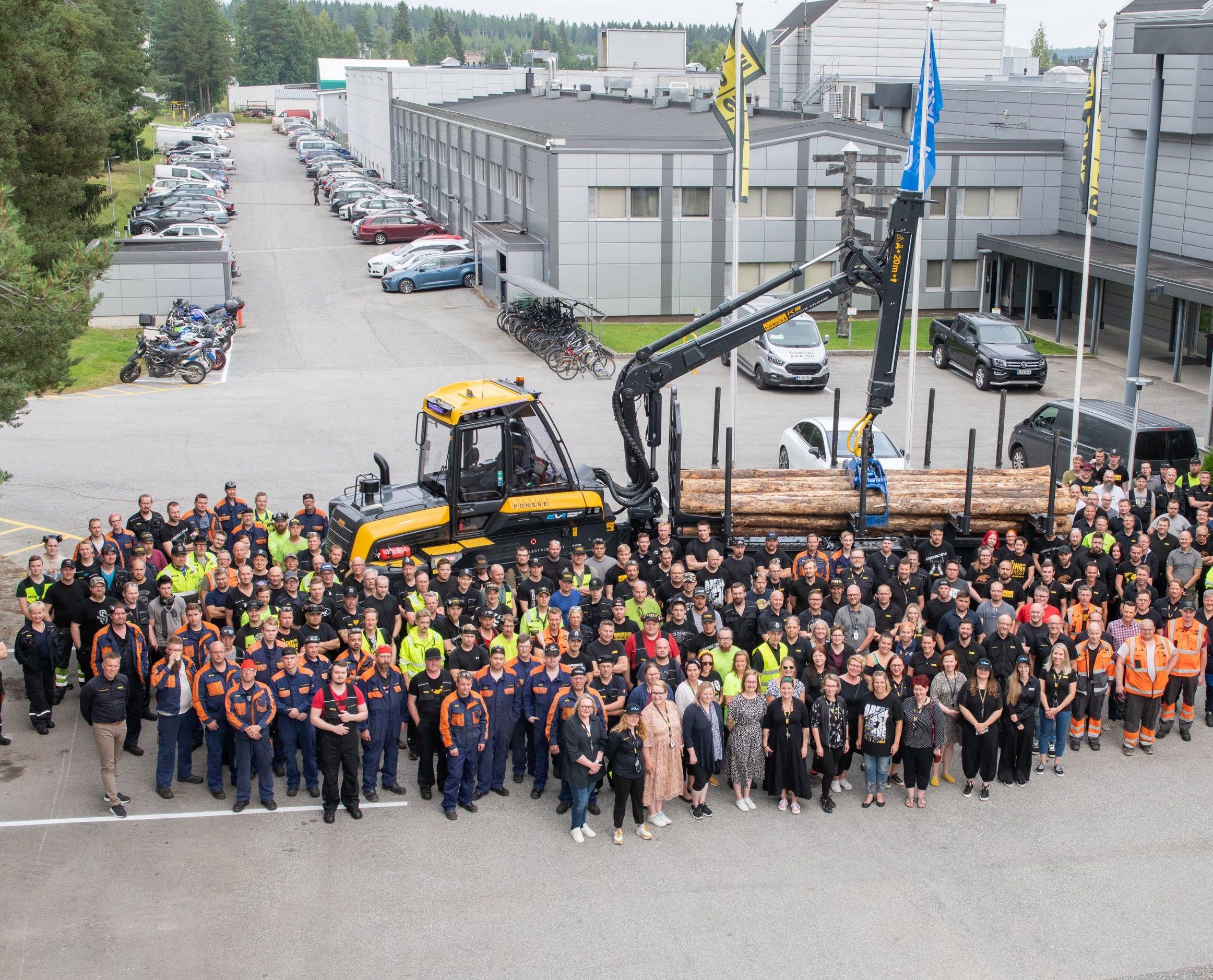
40 (795) (2021: 38%) 60 (1193) (2021: 62%) 1,988 (1,933) 179 (165) 112 (108) 918 (879) 580 (615) 199 (166) Personnel by function on 31 December 2022 (31 December 2021) Support functions (including the development of digital services) Sales and marketing Maintenance and spare parts R&D Supply chain Personnel by personnel group on 31 December 2022, % (qty) Blue-collar employees White-collar employees 02 Social responsibility
Personnel by subsidiary

Ponsse Oyj Epec Oy Ponsse AB Ponsse AS Ponsse Chile S.p.A. 1) Ponsse China Ltd. Ponsse Czech s.r.o. 2) Ponsse Latin America, Ltda. Ponsse Machines Ireland Ltd. Ponsse North America, Inc. Ponsse UK Ltd. Ponsse Uruguay S.A. Ponssé S.A.S Total group personnel on 31 December 2022 964 176 72 12 25 35 16 418 8 88 28 112 34 1,988 1,004 150 71 12 0 33 0 390 7 86 29 109 42 1,933 919 126 64 12 0 31 0 328 8 80 24 97 38 1,727 2022 2021 2020
1) Ponsse announced the transfer of PONSSE services to Ponsse Chile S.p.A on 17 March 2022.
02 2000 0 1000 2022 2021 2020 Development of the number of personnel 1,727 1,933 1,988
2) Ponsse announced the transfer of PONSSE services to Ponsse Czech s.r.o on 1 April 2022.
Voluntary employee turnover by company
Social responsibility
Voluntary employee turnover in Finland and other countries
53
Ponsse Oyj Ponsse AB Ponsse AS Ponssé S.A.S Ponsse UK Ltd. Ponsse Machines Ireland Ltd. Ponsse North America, Inc. Ponsse Latin America Ltda. Ponsse Uruguay S.A. Ponsse China Ltd. Ponsse Chile S.p.A. Ponsse Czech s.r.o Epec Oy Ponsse Group 7.8% 7.1% 15.4% 21.1% 17.2% 0.0% 4.6% 24.9% 8.3% 0.0% 0.0% 0.0% 6.0% 11.3% 78 5 2 8 5 0 4 107 9 0 0 0 10 228 5.2% 2.9% 8.3% 5.0% 11.1% 25.0% 6.1% 15.1% 11.1% 6.1% 4.2% 7.2% 1,002 70 13 38 29 7 87 430 108 34 23 17 168 2,016 2.5% 6.7% 7.7% 20.5% 25.0% 25.0% 3.7% 3.2% 5.1% 10.3% 1.6% 4.0% 2022 Qty 2021 Average 2020 02 Finland (Plc and Epec) Other coutries 7.5% 16.5% 88 140 5.0% 10.6% 1,170 847 2.5% 6.6% 2022 Qty Average 2021 2020
Occupational safety and health
We comply with the ISO 45001 standard for occupational safety and health management in our operations. Our goal set for occupational safety and health is to develop the safety culture and mindset, and prevent accidents by investing in preventive safety activities. We want to be an accident-free company in the future.
At Ponsse, developing the smooth flow and high quality of work is an integral part of safety activities. We are committed to improving occupational safety and health to meet the expectations of our personnel and stakeholders, and we comply with the legislation and the Group’s guidelines to ensure a safe working environment in all our operating areas.
In 2022, we harmonised safety practices in our new subsidiaries Ponsse Czech s.r.o and Ponsse Chile S.p.A to conform with the Group’s practices. We will also engage in closer cooperation with the Group’s international occupational safety and health network to implement a shared safety culture and best safety practices.
Measuring occupational safety and health
Ponsse measures occupational safety using the Lost Time Injury Frequency (LTIF), which represents the number of accidents leading to absences per one million working hours.
54 02
LTIF SOCIAL RESPONSIBILITY IN PRACTICE
Measuring occupational safety and health
Ponsse measures occupational safety using the Lost Time Injury Frequency (LTIF), which represents the number of accidents leading to absences per one million working hours. In 2022, changes and uncertainties in daily work processes were still reflected in safety. The Group’s LTIF was 11.8 in 2022 (2021: 17.7). There were a total of 47 accidents leading to sick leave (2021: 63), of which 20 (27) caused fewer than three days of sick leave and 27 (36) more than three days of sick leave. There were no fatal accidents in the Group (2021: 0).
To improve occupational safety and health, we will focus on building a method of continual improvement in safety and carrying out preventive safety activities in 2023. For 2023, we have set goals for preventive safety activities for all our companies, and we will provide more safety training for our personnel.
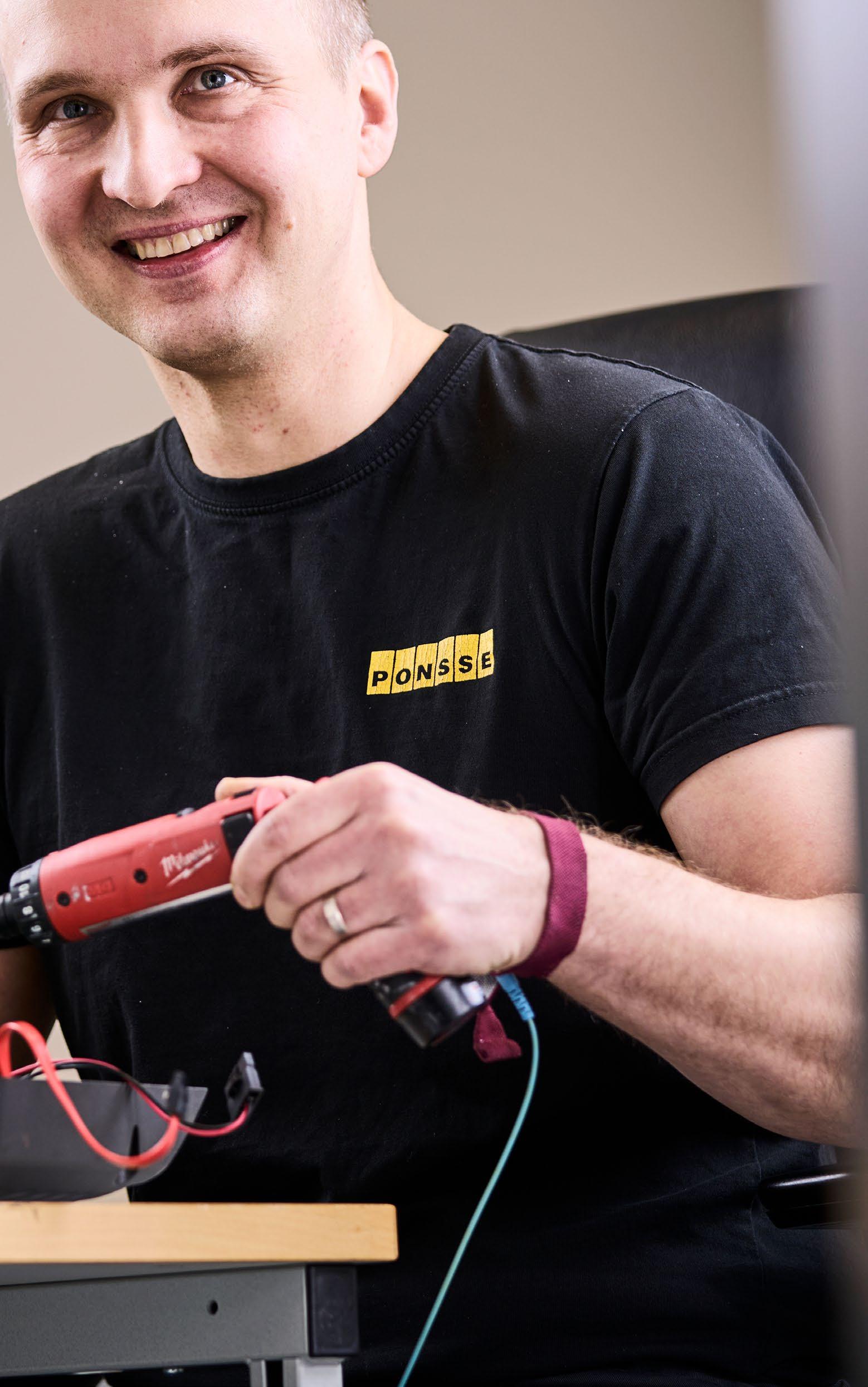
02
Group (%) LTIF 0 5 10 15 20 25 17.7 11.8 7.7 2021 2020 2022 Injury Frequency
The number of accidents leading to absences decreased by 25 per cent in 2022
Social responsibility
Data management and data security
As business operations have become increasingly digital and networked, data management has become an integral part of Ponsse’s business. Ponsse’s data security management model complies with the ISO/IEC 27000 standards where applicable, and the operations of our subsidiary Epec Oy have been certified in accordance with the ISO 27001:2013 standard. Our management model consists of the data security policy and guidelines, for which all Ponsse employees are provided with training.
In 2022, we continued to develop data security by improving our technical data security solutions and cooperation between functions. We also regularly monitored the maturity level of data security. In 2022, we submitted two notifications of identity thefts to the authorities, but avoided any severe data security incidents.
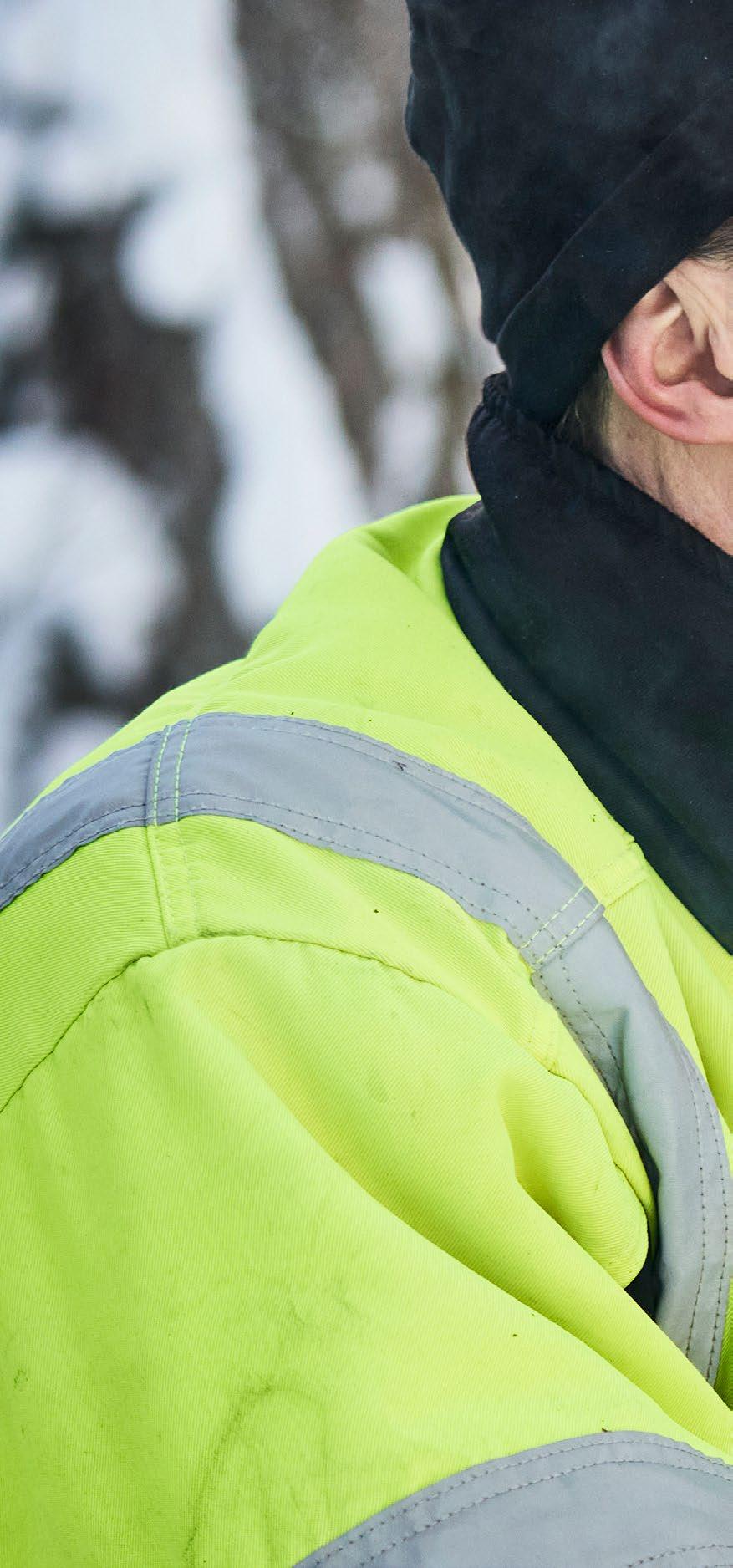
56 02
SOCIAL RESPONSIBILITY IN PRACTICE
Social responsibility

57
SOCIAL RESPONSIBILITY IN PRACTICE
Our key stakeholders
• Customers and other forest sector operators
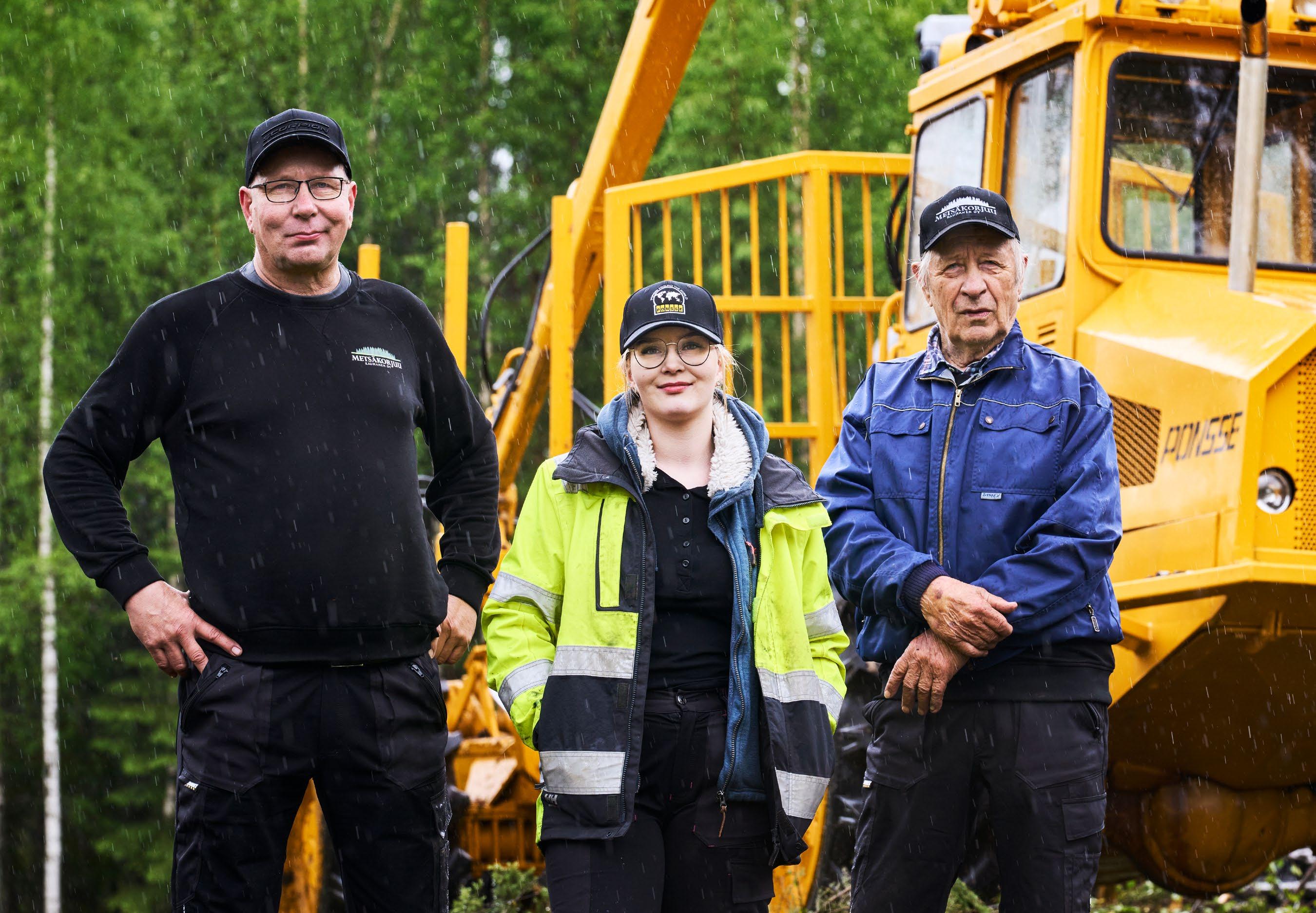
• Personnel
• Ponsse network’s retailers and contractual service partners
• Subcontractors and suppliers
• Shareholders
• Local communities and associations
• Legislators and authorities
• Schools and educational institutions
• Funding providers, investors and analysts
• Media
58 02
Honesty and cooperation
Honesty, ethics and communality in operations are vital factors for us. Good corporate governance and our Code of Conduct define how we treat people equally, conduct sustainable business and engage in close cooperation with our partners.
Our mutual trust with different stakeholders is based on open long-term cooperation. Our key stakeholders include our customers and members of the entire Ponsse network. We want to know our customers personally and also address their families and stakeholders in our activities. The Ponsse network consists of our own companies, as well as our retailers who we always aim to treat as equivalent to our own companies.
We monitor customer satisfaction in all our sales and service activities. At the end of 2022, the Ponsse network’s NPS was excellent at 54 (62) based on 1,097 responses. The NPS of Ponsse’s subsidiaries increased to 43 (31) and that of our retailers was once again excellent at 76 (76). The NPS is measured on a scale from -100 to +100, with monitoring being a continuous process regarding products, maintenance and spare parts.
The NPS of Ponsse network was once again excellent.
59
02 NPS 54 2021: 62 41 2021: 31 76 2021: 76
Ponsse network Ponsse’s subsidiaries Ponsse retailers
Social responsibility
Investments in the local dimension
We find it important to be a responsible company in the communities in which we operate. When selecting our partners, we address the local dimension and aim to create regional welfare through profitable and environmentally sustainable operations.
Ponsse’s production and head office are still located in the company’s birthplace in Vieremä, and we have a high impact on regional employment in Northern Savonia. At the end of 2022, Ponsse directly employed 658 people at our factory and 119 people at our Iisalmi logistics centre and in our maintenance services. In addition, nearly 400 employees worked in companies that are based in the partnership business park located in the immediate vicinity of our factory and mainly provide Ponsse with subcontracting or components.
In addition, our sports sponsorships highlight the local dimension, a shared set of values and
long-term partnerships, ranging from children and young people to professional sports
Stakeholder survey
Our stakeholders’ expectations have an impact on our responsibility goals, and we try to understand the expectations set for us through active cooperation.
We identified our stakeholders’ expectations of responsibility in our different market areas through the stakeholder survey conducted in 2021 –2022. In addition to our personnel, respondents to the survey included specialists representing the company’s Board of Directors, the supplier, customer and service networks, forest companies, educational institutions, environmental associations, and funding and investment companies.
We have used the stakeholder survey in the prioritisation of the focus areas in our responsibility activities and in the preparation of a roadmap.
60
02
47% of purchases from Ponsse’s subcontractors located within a 25kilometre radius from our production. Local
97% of Ponsse’s purchases in the EU area (74% in Finland) Finland
purchasing
We know our partners
We are committed to carrying out business sustainably and responsibly. We expect that parties outside Ponsse also follow the principles of our Code of Conduct, where applicable, when they do business with Ponsse or on behalf of Ponsse. External parties include Ponsse’s business partners, suppliers and customers, as well as the Ponsse service network. We require all our suppliers to commit to the Supplier Code of Conduct. A total of 90% of our suppliers have signed the commitment.
Our business is always based on confidential cooperation with our partners, and it is vital to us to personally know our customers and other key stakeholders. At the same time, we develop our risk management associated with money laundering, corruption and human rights. At the beginning of 2022, we deployed a service that allows us to check the backgrounds of our partners based on risks as part of our business processes in accordance with the “Know your business partner” principle.

61
02 Social responsibility
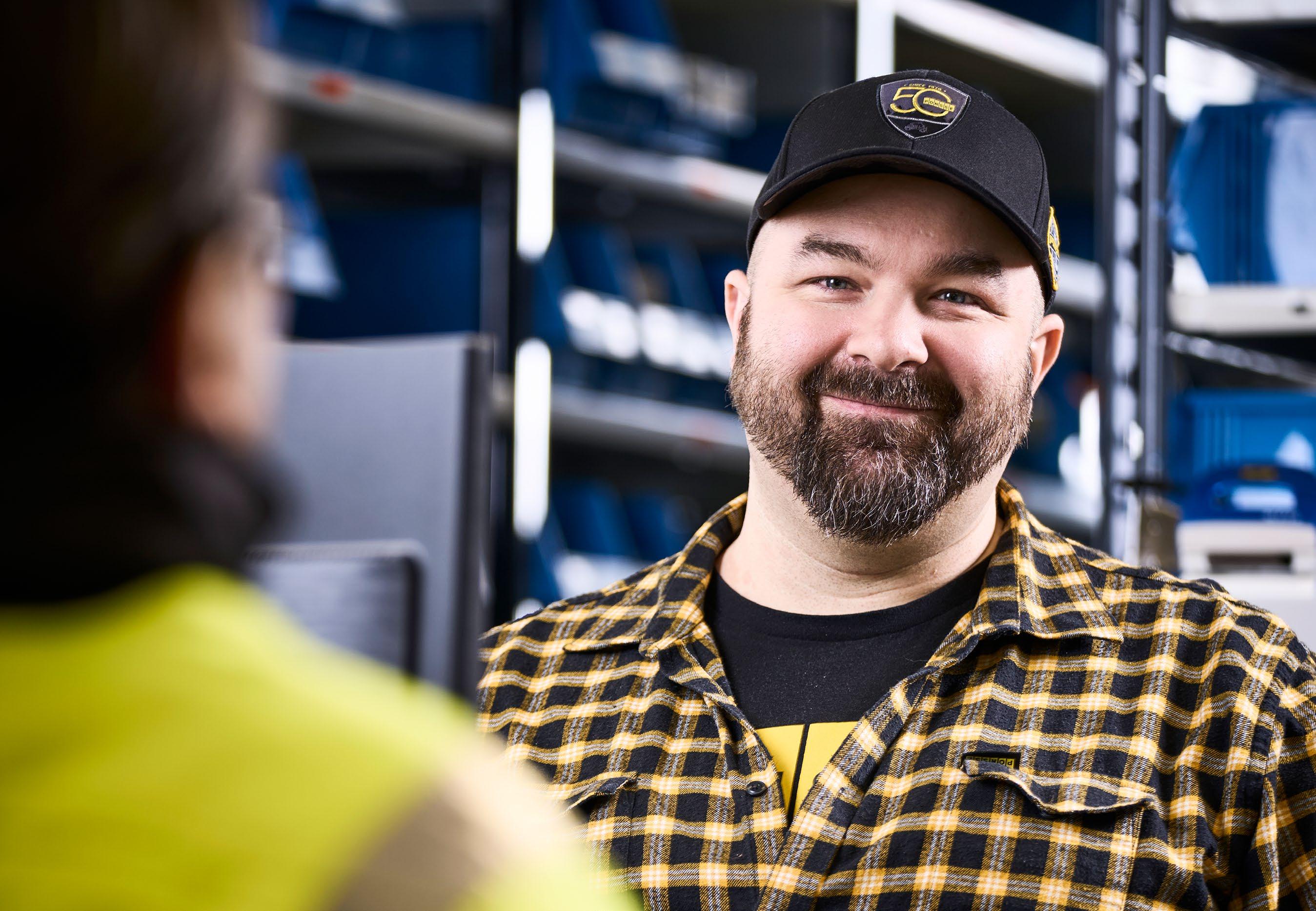
62 02
Code of Conduct and whistleblowing channel
Ponsse is committed to conducting responsible business. Our Code of Conduct, which governs our operations, is strongly supported by our values: honesty, innovation, Ponsse spirit, and customer orientation. The Code of Conduct applies to all Ponsse employees and external parties, companies and communities closely connected to Ponsse.
When Ponsse employees or our stakeholders have concerns regarding the violation of our Code of Conduct, such concerns should be reported to the company. We encourage employees to report any concerns or violations to their immediate supervisor, HR management or the company’s management as the first instance. Reports can also be submitted anonymously through Ponsse’s whistleblowing channel, which an external service provider maintains in nine different languages on our website.
The whistleblowing team appointed by Ponsse’s Board of Directors processes reports submitted through the channel and forwards them to the Management Team or the Board of Directors, if required. The whistleblowing team consists of the
company’s internal auditor, CFO and CHRO. The team supervises that reports are processed and consequences are imposed identically in similar cases and that corrective measures are carried out.
In 2022, 14 reports were submitted to the whistleblowing channel. The anonymous reports were divided into the following topics: discrimination and harassment (1), misuse (1), corruption (2), HR procedures and guidelines (2), as well as privacy protection and the protection of personal data, and security in network and information systems (1), other (6), irrelevant (1). None of the investigated cases resulted in reporting to the authorities, as they were handled internally. Our whistleblowing service:
https://report.whistleb.com/en/ponsse
63 02
Social responsibility SOCIAL RESPONSIBILITY IN PRACTICE
Product liability and safety
In the development of PONSSE forest machines, priority will always be given to customers and machine end users, especially to operators and maintenance employees, while the safe manufacturing of machines is also a requirement.
We assess risks associated with machine users throughout the product lifecycle as early as possible. Primarily, we aim to eliminate any hazards by means of design and secondarily through technical protective measures that improve safety. Warnings and instructions related to any residual risks remain the final means. According to our customer- driven research and development principles, our goal is to annually receive at least five feedback reports related to product safety from our customers and their personnel.
Standards and safety requirements
Our products meet the international standards applicable to them and the relevant safety requirements set out in directives, including the safety cabin’s FOPS, OPS and ROPS structures and related test standards. As an indication of this, all machines carry the CE marking, and a declaration of conformity, including references to relevant directives,
is delivered with each machine. As an example of recent development, we adopted a window material that meets the ISO 21876:2020 standard in our harvesters as protection against chain shots. We participate in the development of industry standards in the international standardisation committee to also enable development in the future.
Help for forest machine operators
The professional skills of forest machine operators are highly significant considering the safe use of machines. High-quality operator training and instructions, combined with professional maintenance services, significantly improve not only the productivity and smooth flow of work, but also safety. Operator training also ensures that working methods and the forest machine and its equipment are suitable for each logging site in the best possible manner and that the harvesting results support sustainable forestry.
64 02
SOCIAL RESPONSIBILITY IN PRACTICE
Ergonomics is a significant part of the forest machine operator’s well-being. We invest in ergonomics by offering the best possible visibility over the work area from the cabin , by developing cabin and workstation ergonomics, such as the seat and controls, and by stabilising and levelling the operator’s work environment, if required. User interfaces and automation systems, such as the Active Crane boom control system, are part of development, and they are now also available for harvesters. The PONSSE Opti 5G information system is easy to use and provides harvester operators with the information required at the correct time to reduce the cognitive loads directed at the operator.
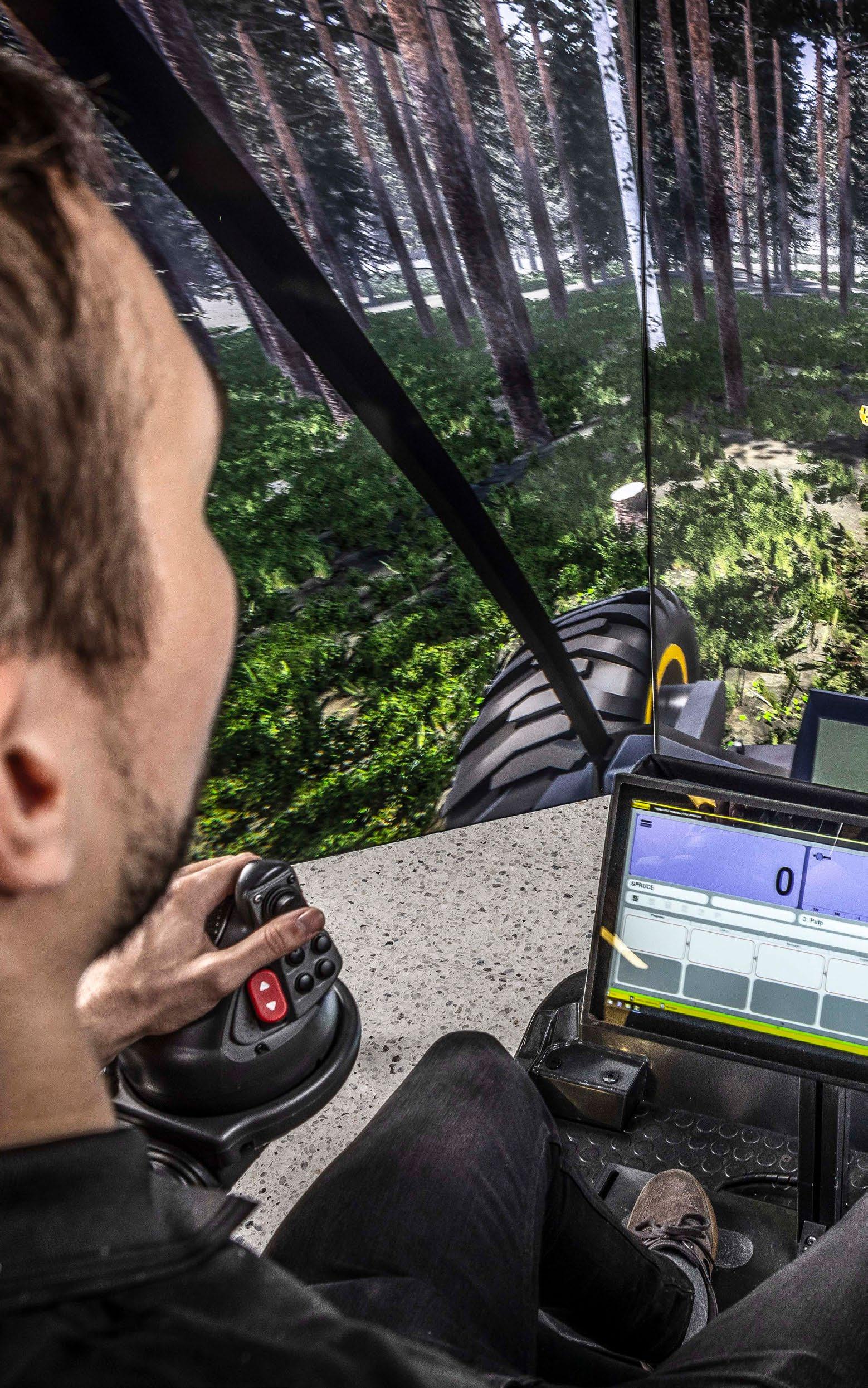
Key association memberships
• Association for Finnish Work
• Bioenergy Association of Finland
• Excellence Finland
• Finnish Business Council Shanghai*
• Finnish Business & Society FIBS
• Finnish Family Firms Association
• Finnish Forest Association
• Koli Forum
• Kuopio Region Chamber of Commerce
• Mechanical Engineering and Metals Industry Standardization in Finland
• South Ostrobothnia Chamber of Commerce*
• Stiftelsen Skogsbrukets Forskningsinstitut
• Suomen Maatalousautomaatio ry*
• Suomen Yrittäjät
• Technology Industries of Finland
• Technology Industry Employers of Finland
Social responsibility
02
* Epec Oy membership
Governance
We are a reliable partner who values community


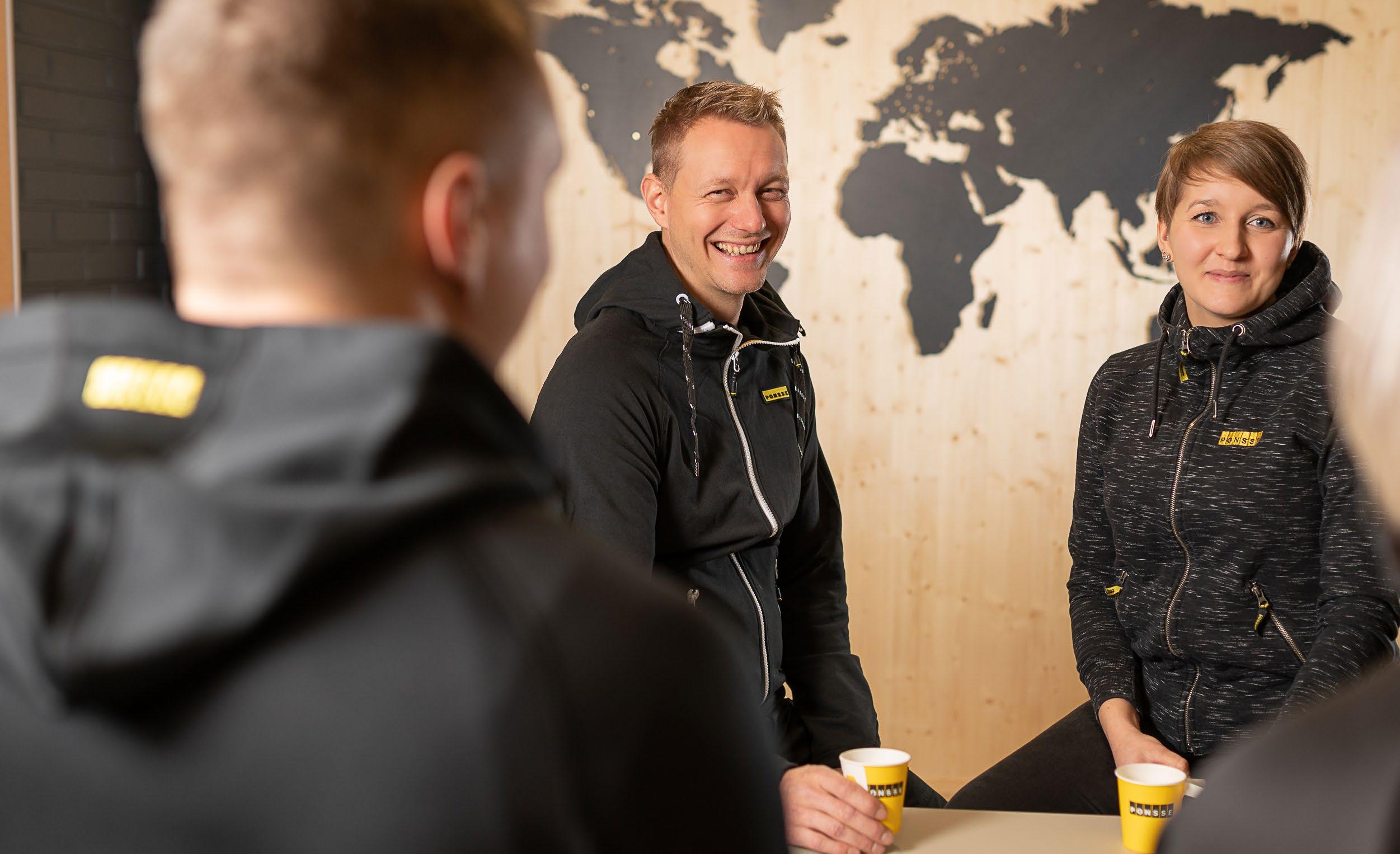
66 03
We are a reliable partner who values community
We operate honestly, ethically and communally in all communities in which we are present.

Good corporate governance and our Code of Conduct steer us to treat people equally, conduct sustainable business and engage in confidential cooperation.
39.3M€
67 03
OUR PRINCIPLE
Paid taxes and duties in 2022 Governance
Value distribution in 2022 (MEUR)
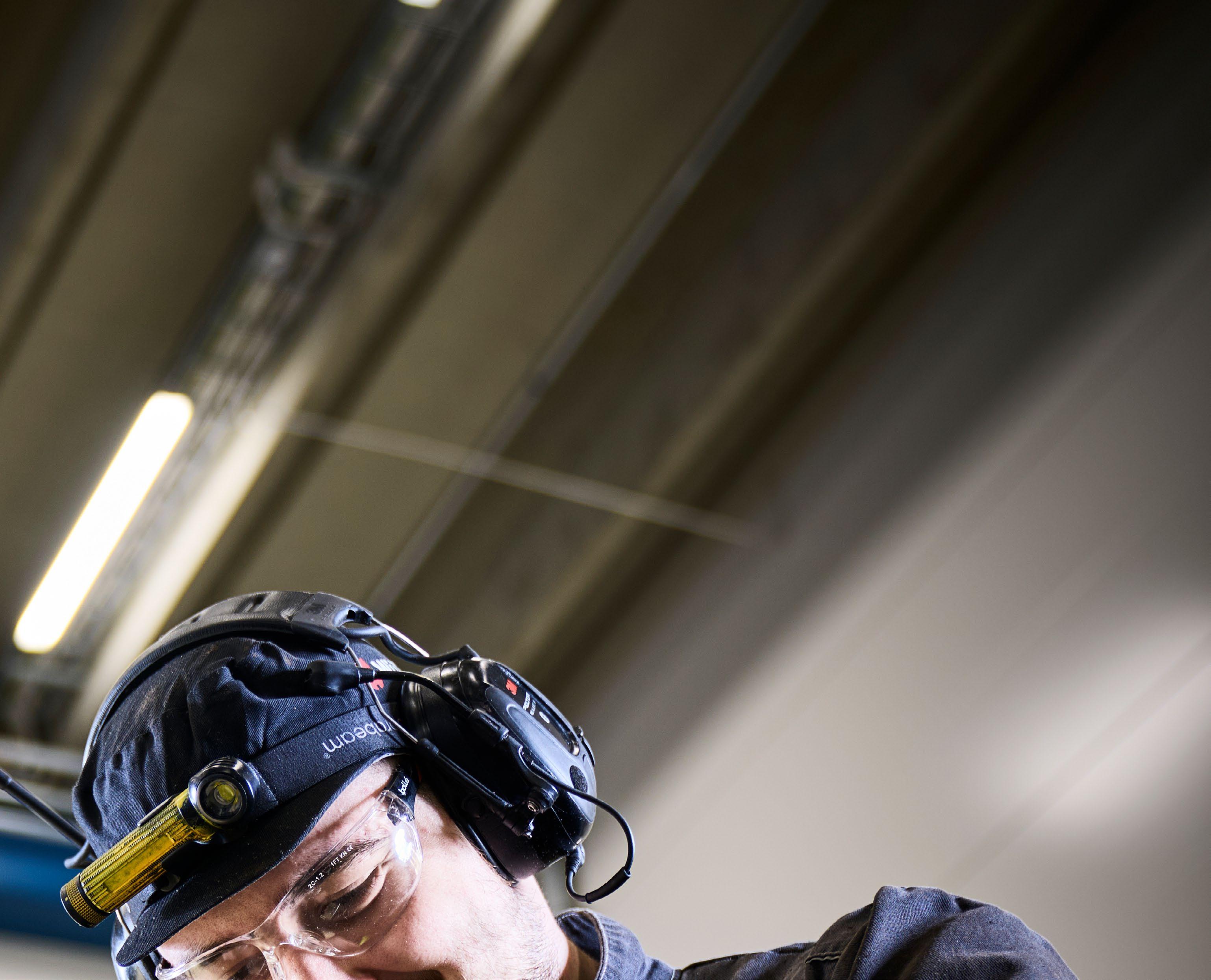
Society 39.3 (43.1) Paid taxes Suppliers and subcontractors 491.4 (398.4) Shareholders 16.8 (16.8) Dividents R&D expenditure 27.7 (23.8) Personnel 107.9 (87.7) Salaries and remunerations Investments 41.9 (24.9) Gross capital expenditure
Responsibility management
Ponsse’s Board of Directors and management are committed to advancing corporate responsibility. Ponsse’s Board of Directors receives regular updates on the company’s responsibility work and risks and opportunities related to corporate responsibility and approves the key policies and guidelines.
The President and CEO and the Management Team are responsible for the achievement of the goals and business plans set by the Board of Directors, as well as the inclusion of corporate responsibility in the company’s strategy and risk management work. The Group’s Management Team is in charge of function-specific responsibility goals, their monitoring and achievement, and the identification of operational risks and opportunities associated with responsibility issues. A chief responsibility officer was appointed in the Group’s Management Team at the beginning of 2023.
Ponsse’s responsibility steering group convenes four times a year to review measures related to the promotion, execution and monitoring of responsibility goals. The steering group’s members are the President and CEO, CFO, CHRO and Chief Responsibility Officer, who reports the advancement of responsibility goals to the steering group.
We have defined the most important strategic responsibility objectives that we seek to achieve through annual function-specific targets and actions as part of the company’s annual strategy process.
We have identified the following strategic objectives:
• We improve the wellbeing of our people.
• We innovate sustainable solutions that respect nature.
• We do not burden nature through our operations.
• We are a reliable partner who values community.
69 03
Governance GOVERNANCE IN PRACTICE
Harmonised responsibility practices are ensured based on the company’s Code of Conduct and values. We require Ponsse’s employees and partners to comply with the principles of our Code of Conduct and respect our values whenever they work with or represent Ponsse. The Code of Conduct training is part of the induction programme for our new employees, and the training completion is monitored in annual performance appraisals. Our ethical business is also supported by our whistleblowing channel, which allows any suspected misuse related to Ponsse and its operations to be reported.
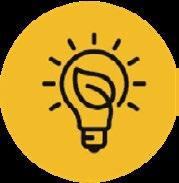

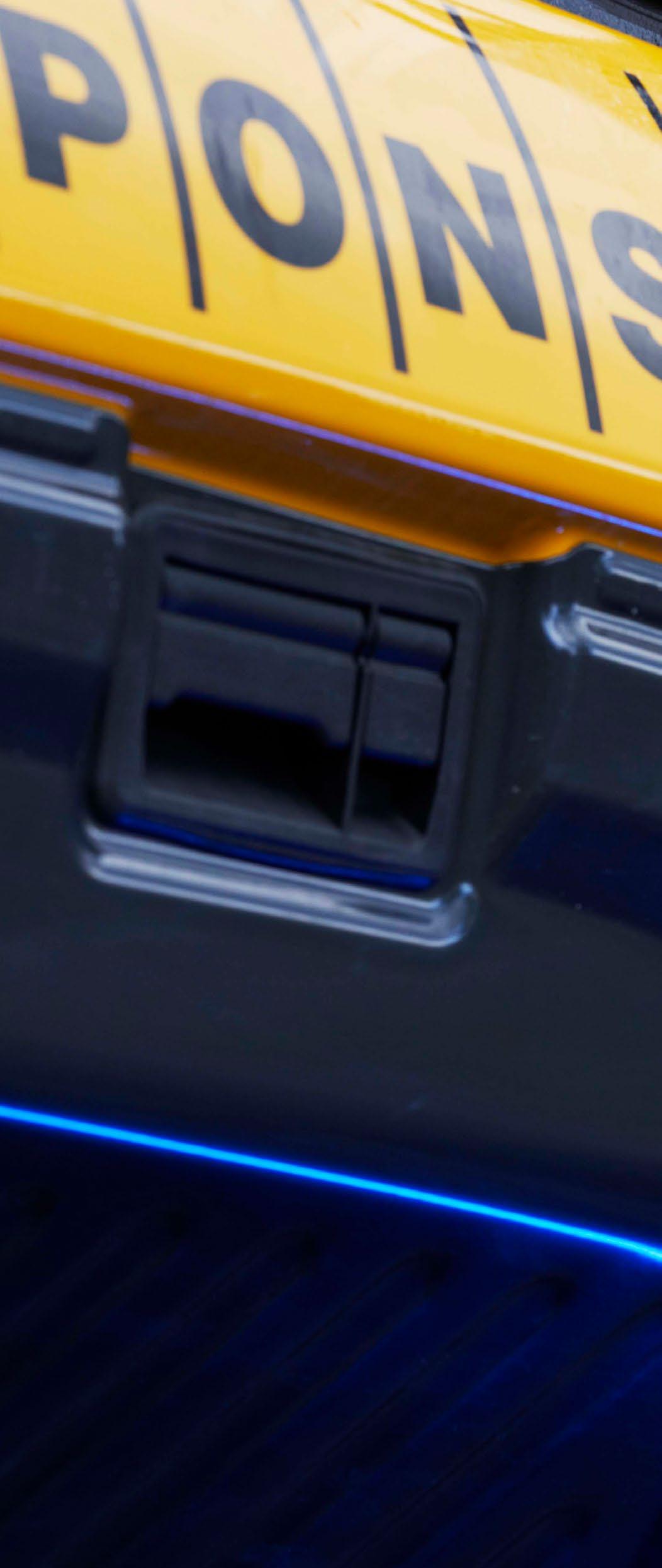
70
We innovate sustainable solutions that respect nature
03
Tax footprint (continuing operations)
In 2022 the parent company measured the net investment to subsidiary Ponsse Latin America Ltda at fair value by recognising credit loss from trade receivables in total EUR 19.0 million. This posting influenced the effective tax rate of both the parent company and the group in 2022.
Net sales (MEUR) Operating profit (MEUR) Equity ratio, %
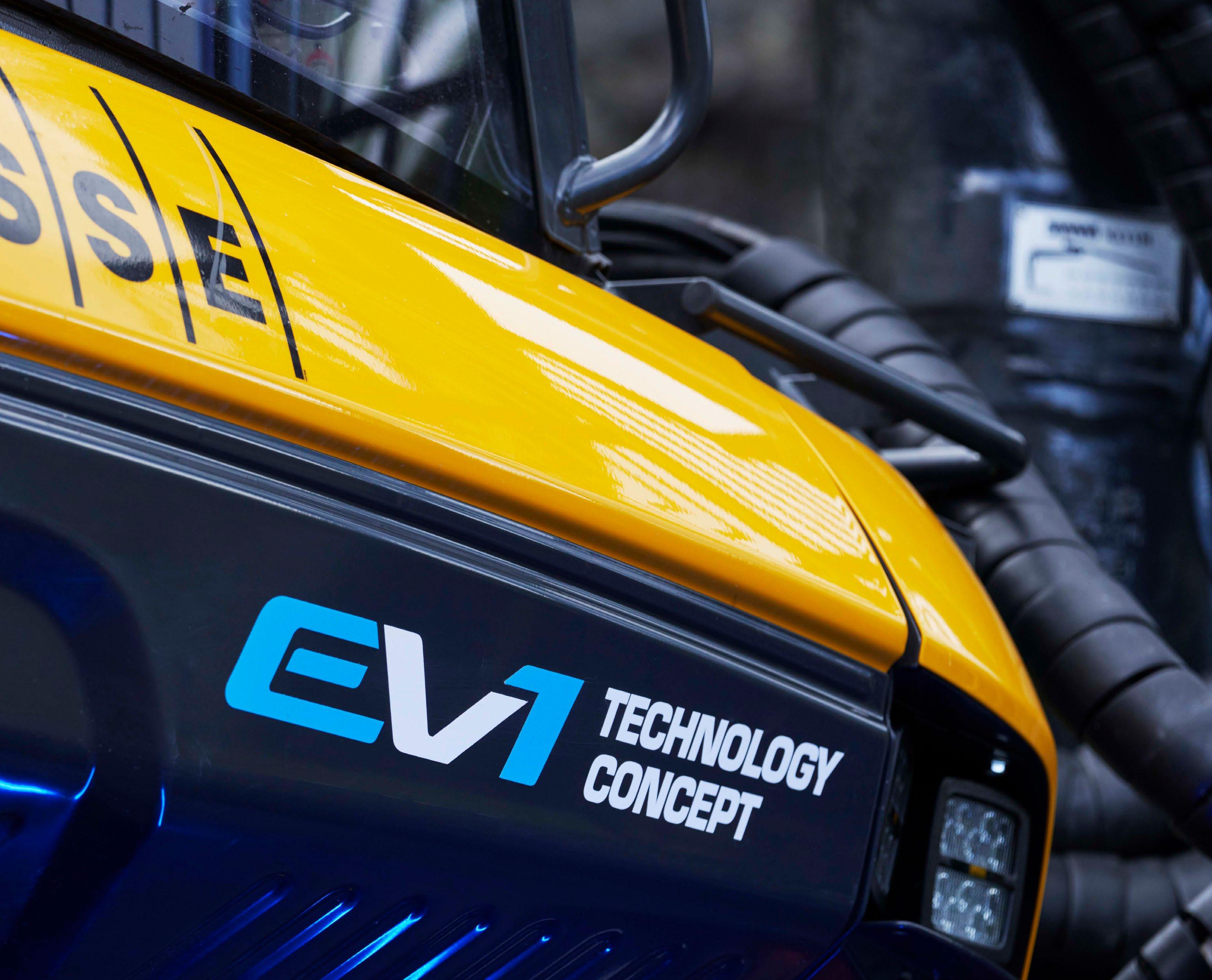
03 Net sales Result before taxes Personnel (persons) Corporate income tax Property tax Employer´s charges Custom duties Other taxes Paid taxes total (EUR 1,000) 667,228 31,953 1,140 6,172 643 13,116 136 3 20,070 616,777 41,180 1,154 12,301 428 13,072 84 3 25,888 376,994 4,559 848 4,773 138 7,578 6,716 64 19,269 297,520 25,576 779 5,007 136 5,611 6,227 216 17,197 755,123 43,219 1,988 10,945 781 20,695 6,852 67 39,339 608,271 48,107 1,933 17,308 564 18,683 6,311 219 43,085 Finland* Finland* (EUR 1,000) 2022 2021 Other countries* Other countries* Total** Total**
*Unconsolidated
**Consolidated 800 0 400 600 200 0 20 40 60 0 10 20 30 40 50 60 70 2022 2022 2022 2021 2021 2021 2020 2020 2020
561.4 45.4 54.3 608.3 50.0 60.7 755.1 46.6 55.0
Governance
Strategy and management systems
Sustainable development provides us with a direction and an opportunity for innovation and new operating methods, while securing our social and financial success. The development of our innovations and solutions is always initiated and guided by our customers’ needs and the opportunities enabled by technology. We find that Ponsse’s technology and operations need to be part of the solution that will secure a good future for the generations that will follow us.
Our management systems steer the implementation of Ponsse’s sustainable development principles and responsible leadership. Alongside the management systems, the company’s mission, vision and values strongly guide the company’s operations, in which responsibility has been given a strategically important position.
Ponsse Plc uses the following standards: ISO 9001 for quality management systems, ISO 14001 for environmental management systems, and ISO 45001 for occupational health and safety management systems. The purpose of management systems is to standardise our group’s operations and ensure our company’s continuous development. In 2022, LRQA re-certified the company’s management systems. The Group conducted
internal audits and audits of the supplier and distribution network included in Ponsse’s operating processes according to the regular audit programme.
Ponsse Uruguay S.A., part of Ponsse Group, has been ISO 9001 certified for quality management and ISO 45001 certified for occupational health and safety management since 2020. Ponsse Latin America Ltda, our Brazilian subsidiary, was ISO 9001 certified for quality management in 2021. Epec Oy, Ponsse’s Finnish subsidiary specializing in advanced electrics and electronics for non-road mobile machines and commercial vehicles, is certified according to ISO 27001 for information security management, ISO 9001 for quality management, ISO 14001 for environmental manage-
72
03
GOVERNANCE IN PRACTICE
ment and ISO 45001 for occupational health and safety management.
Epec factory is certified by TÜV SÜD according to functional safety certificates EN ISO 13849, IEC 61508 and EN IEC 62061. Safety components certified according to functional safety can be used to manufacture safety functions to meet the requirements of the standards for safety products designed and manufactured by Epec.
Policies and guidelines
All key policies and guidelines governing Ponsse’s operations are processed by the Group’s Management Team and approved by the Board of Directors. Every employee is responsible for their part for observing the guidelines and reporting any defects.
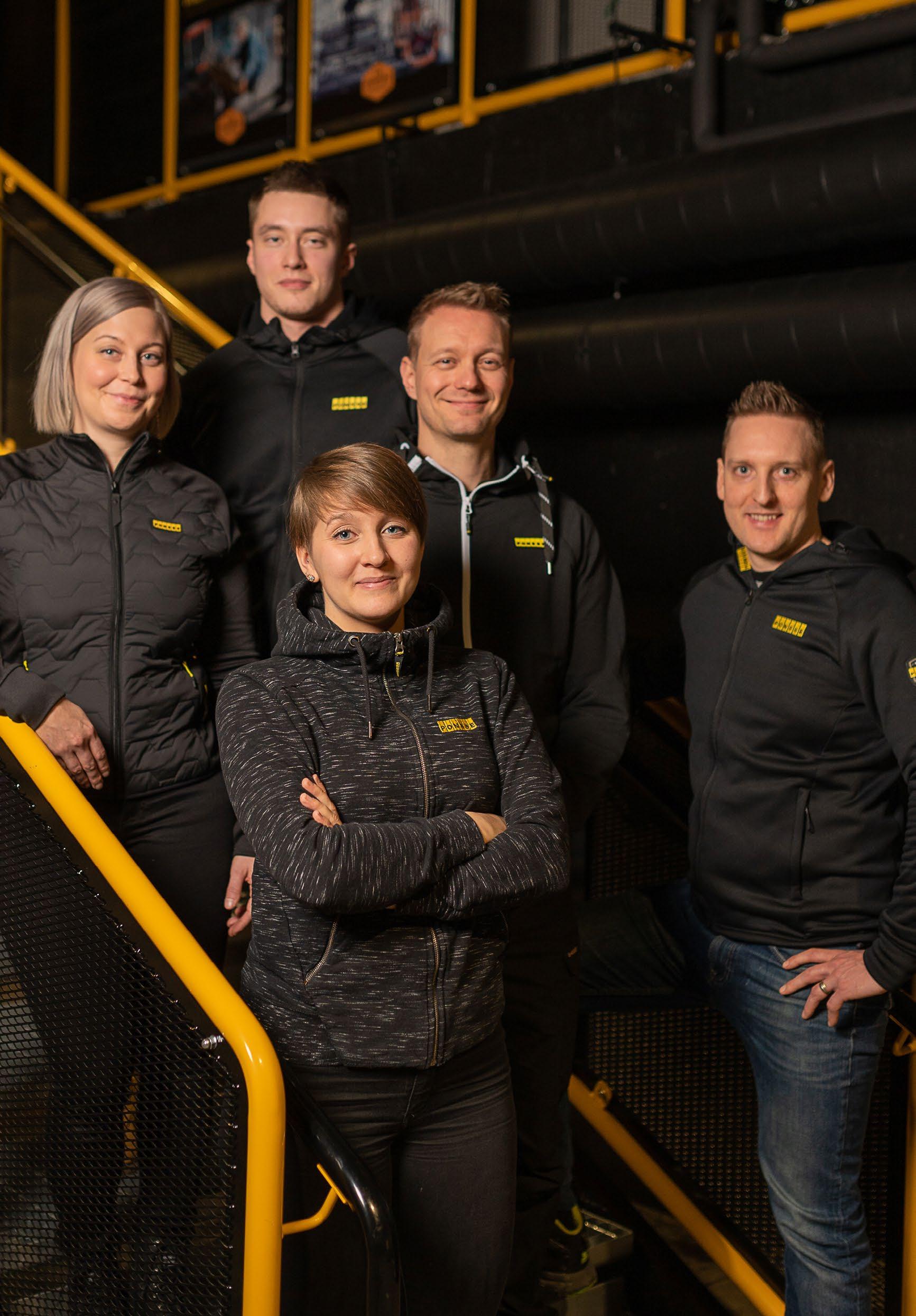
Ponsse's key politics and guidelines:
• Ponsse’s Code of Conduct
• Supplier Code of Conduct
• Equality and nondiscrimination policy
• Communication policy
• Information security policy
• Operating policy
• Risk management policy
• Tax policy
03
Governance
Good corporate governance
Ponsse complies with good corporate governance in accordance with legislation applicable to listed Finnish companies, Ponsse’s Articles of Association and the Corporate Governance Code 2020 for listed companies, while promoting openness and transparency. The purpose of the corporate governance principles is to ensure ethical business and a high level of professionalism. Ponsse’s highest decision-making body is the General Meeting. The General Meeting appoints the company’s Board of Directors, which is responsible for the company’s administration and the appropriate organisation of operations. There are no separate committees within Ponsse’s Board of Directors. The President and CEO, appointed by the Board, is responsible for the operational management of Ponsse Group, assisted by the Group’s Management Team.
Ponsse’s shares are listed on Nasdaq Helsinki, and we comply with the rules and regulations of the Helsinki stock exchange and the Finnish Financial Supervisory Authority. Consolidated financial statements and interim reports are prepared in accordance with the International Financial Reporting Standards (IFRS).
According to good corporate governance, Ponsse protects the rights of its shareholders, conducts diligent and correctly timed financial reporting, and provides the organisation’s
managers with guidance. Auditing, internal control, risk management, compliance with legislation and regulations, and management and administrative practices have been arranged appropriately, and the most significant business activities and conflicts of interest are evaluated on the basis of risks.
In economical sustainability, we focus on a balance between profitability, cash flow from business operations and growth to ensure our company’s financial performance in the long term.
74
03 GOVERNANCE IN
PRACTICE
Tax policy
We want to promote an open tax policy, and we comply with valid tax laws and regulations in all countries where Ponsse operates. The company has no separate taxation-based corporate structures. We are committed to paying the respective statutory taxes and fees without delay wherever we operate and produce results. We comply with the OECD transfer pricing guidelines and ensure regularly that intra-group pricing is based on market terms.
We report and publish our tax information in accordance with legislation and the transparency goals set in our tax policy. The goal of our tax management is predictable and effective taxation with high morals. We are engaged in close cooperation with the Large Taxpayers’ Office in Finland.
Paid taxes and duties
In 2022, Ponsse paid taxes and duties for a total of EUR 39.9 million (2021: 43).
Of which Finland’s share was EUR 20 million (25.9). The figures include only continuing operations.
In 2022, Ponsse Plc and Epec Oy received support from Business Finland, and Ponssé S.A.S. received employment subsidy from the French Government for a total of EUR 1,015,102.
75
03
Governance
Corruption and competition
We are committed to combating corruption in all its forms, including extortion and bribery. We do not use bribes or other unlawful payments, nor do we authorise these payments to gain or maintain business. The company neither offers nor accepts any favours, gifts or benefits which could be reasonably assumed to influence decision making inappropriately or even give such an impression. We do not accept or facilitate money laundering, and we comply with legislation related to the prevention of money laundering everywhere in the world. We conduct business only with reputable parties involved in legitimate business activities, with funds derived from legitimate
sources. During the offer and negotiations process, we carry out background checks to ensure that the supplier or its management and owners do not violate any laws or regulations and are not subject to economic sanctions.
We promote fair and honest competition. We comply with applicable competition law, regardless of the market area, and refrain from entering into or carrying out any illegal practices. Our assets may not be used for unlawful or improper purposes. In accordance with the GDPR requirements, we respect and protect personal data, and employees processing it are expected to exercise special caution when processing data.
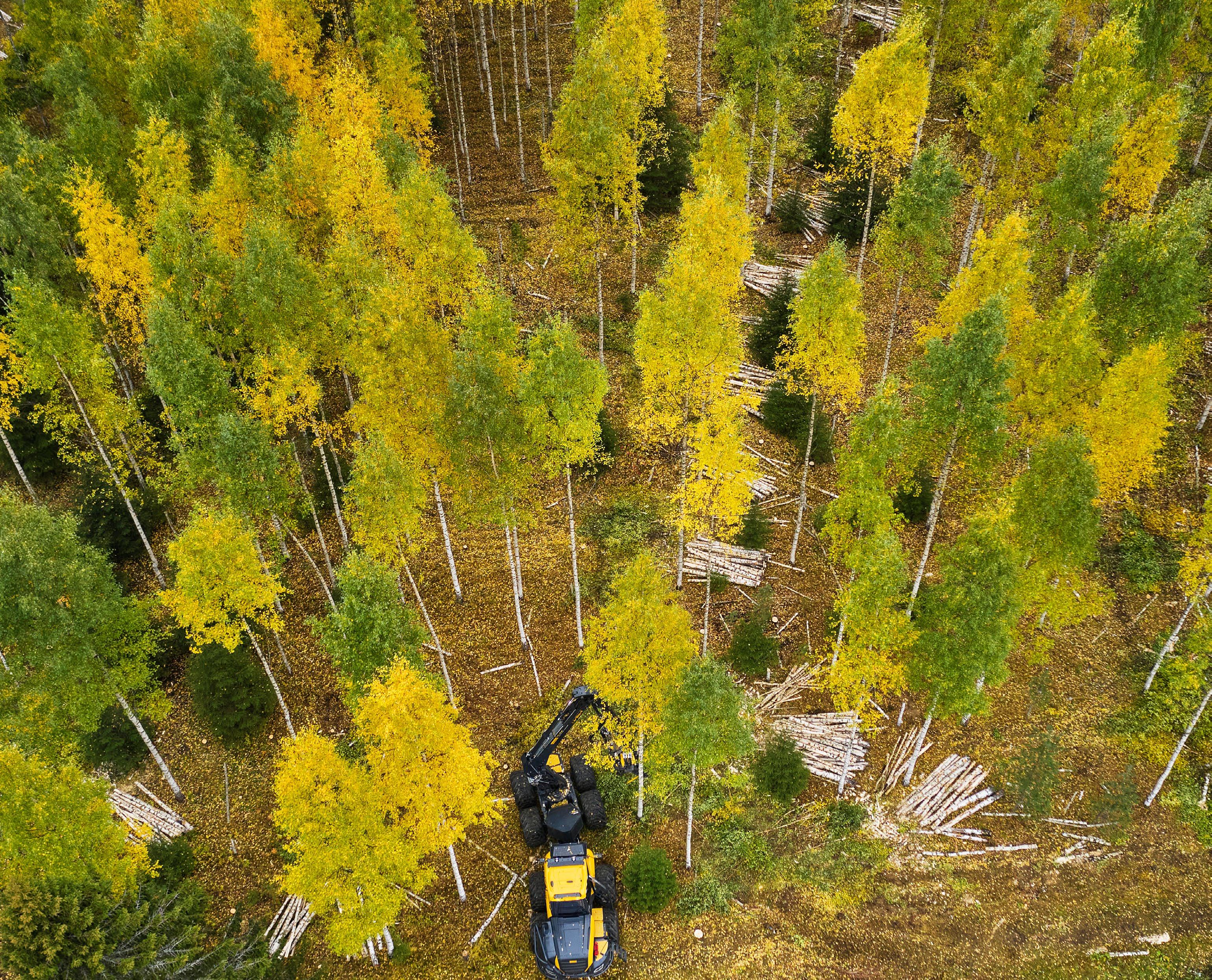
03
Diversity and independence of the Board of Directors
The Board of Directors is expected to possess sufficiently varied expertise and abilities to manage its tasks effectively, paying attention to the company’s objectives. Diversity in the Board of Directors promotes an open culture of discussion and the ability to adopt an open approach to innovative ideas. Diversity in the Board of Directors is supported by the age and gender distribution, educational backgrounds, as well as work experience and international experience, among other things.
During the 2022 financial period, Ponsse’s Board of Directors consisted of members with expertise in finances, legal affairs, technology, international operations, strategies, and sales and marketing. One of the eight members was female. Four members were independent, which is a deviation from the Corporate Governance Code’s recommendation. The company justifies this deviation with the fact that throughout its history, Ponsse has been a person- and family-owned company that has been led successfully. The deviation from the recommendation has not led and will not lead to any conflict with the interests of the company and all its shareholders.
In 2022, the members of the Board of Directors were: Jarmo Vidgren (Chair), Mammu Kaario (Vice Chair), Matti Kylävainio, Ilpo Marjamaa (as of April 7, 2022), Juha Vanhainen, Janne Vidgren, Juha Vidgren and Jukka Vidgren. The President and CEO appointed by the Board of Directors is Juho Nummela.
Remuneration principles
The goal of Ponsse’s remuneration policy is to advance the company’s long-term financial performance and the creation of sustainable shareholder value by recruiting, engaging and motivating the top management and personnel to carry out Ponsse’s strategy. As a rule, remuneration needs to be competitive, engaging and fair. The annual performance bonus of the President and CEO and the Deputy CEO cannot exceed 50% of their salary in the previous year.
77 03
Governance
Trends, risks and opportunities
One part of the company’s management system is risk management, which is guided by the risk management policy approved by the Board of Directors. Ponsse’s management actively monitors the development of the business environment, and responsibility risks and opportunities affecting our business are also considered in the annual risk assessment. Within them, aspects related to climate change, biodiversity and resource efficiency together with digitalisation and technological development are emphasised.
At the end of 2022, we prepared an internal assessment of climate risks. Based on its results, we will continue the development of climate risk assessment as part of our roadmap work for carbon neutrality. In our assessment, the most significant opportunities were associated with new technology solutions that enable zero- emission harvesting, and the most significant risks to the technological transition phase and increasing needs for reporting.
Market and business environment
The discontinuation of the business in Russia, high inflation and uncertainties concerning the availability of parts and components had strong impacts on Ponsse in 2022. Challenges with the availability of components caused some
problems with the machine delivery schedules, but the factory operated uninterrupted through the year. Overall, our adaptation to the difficult business environment succeeded well. However, the increasing material and component prices due to the accelerating inflation and challenges at our Brazilian subsidiary weakened the company’s profitability and cash flows. Our customers’ work situation was excellent throughout the year.
Our operations in more than forty countries balances risks associated with economic fluctuations. We seek flexibility and responsiveness in our operations, facilitating quick adaptation as the operating environment changes. Our confidential stakeholder relations and advanced product and service selection constantly offer us new opportunities for growth and development.
78 03
GOVERNANCE IN PRACTICE
Data and information systems
Growing digitalisation has increased our data security risk, which we take into consideration in the processing of business, customer and personal data. Having updated, reliable, available and secure information systems and data is essential for our operations. We use the national cybersecurity assessment framework to evaluate and develop our cybersecurity. In order to strengthen cybersecurity, Ponsse has clarified software update policies and user instructions. The company is still in the process of renewing its ERP system.
Supplier network
The recovery of the global economy that is happening faster than expected and the rapid growth in demand have resulted in availability problems in certain component groups, and accelerating inflation has increased material and component prices. We strive to ensure product quality and competitive prices through close and long-term collaboration with our supplier network and by using alternative procurement channels.
Products and technological solutions
We support sustainable forestry by innovative products and services that protect nature and the environment. We promote harvesting based on the sustainable and effective cut-to-length method and are constantly reducing the environmental impact of our products and services. We seek to mitigate
risks through close cooperation with customers and stakeholders to ensure technological development that advances in the right direction and will serve the needs of forestry in the future. We work actively with higher educational institutions, universities and research organisations. New technology solutions also involve new competence requirements, which we surveyed during 2022.
Financing
The geopolitical situation increased uncertainty in the financial market. In the challenging situation, the company’s financial position has remained strong due to good liquidity and binding credit limit facilities agreed with financial institutions. In terms of financing, Ponsse has carried out all measures necessary to ensure business continuity, and the situation is regularly evaluated. The goal of financial risk management is to keep liquidity, interest and currency risks under control. The impact of adverse changes in interest rates is minimised by using loans and interest swaps tied to different reference rates. The impact of currency rate fluctuations is reduced partly through derivative contracts. We ensure investments and adaptation to business fluctuations through sustainable financing solutions. In our financing solutions, we also use a loan linked to sustainability goals, in which we are evaluated with indicators related to the development of our safety and our supply network’s commitment to the Supplier Code of Conduct.
79 03
Governance
M O D EL
T H E P O N S S E R E S P O N S I B I L I T Y
80
Personnel
Goal: A developing and safe place to work. Responsible, healthy and competent employees.
• Human and employee rights
• Occupational wellbeing and competence
• Safety
• Equality, non-discrimination and diversity
Products and services
Goal: Responsibility for the quality, ethical compliance and safety of products and services, as well as customers’ health and safety.
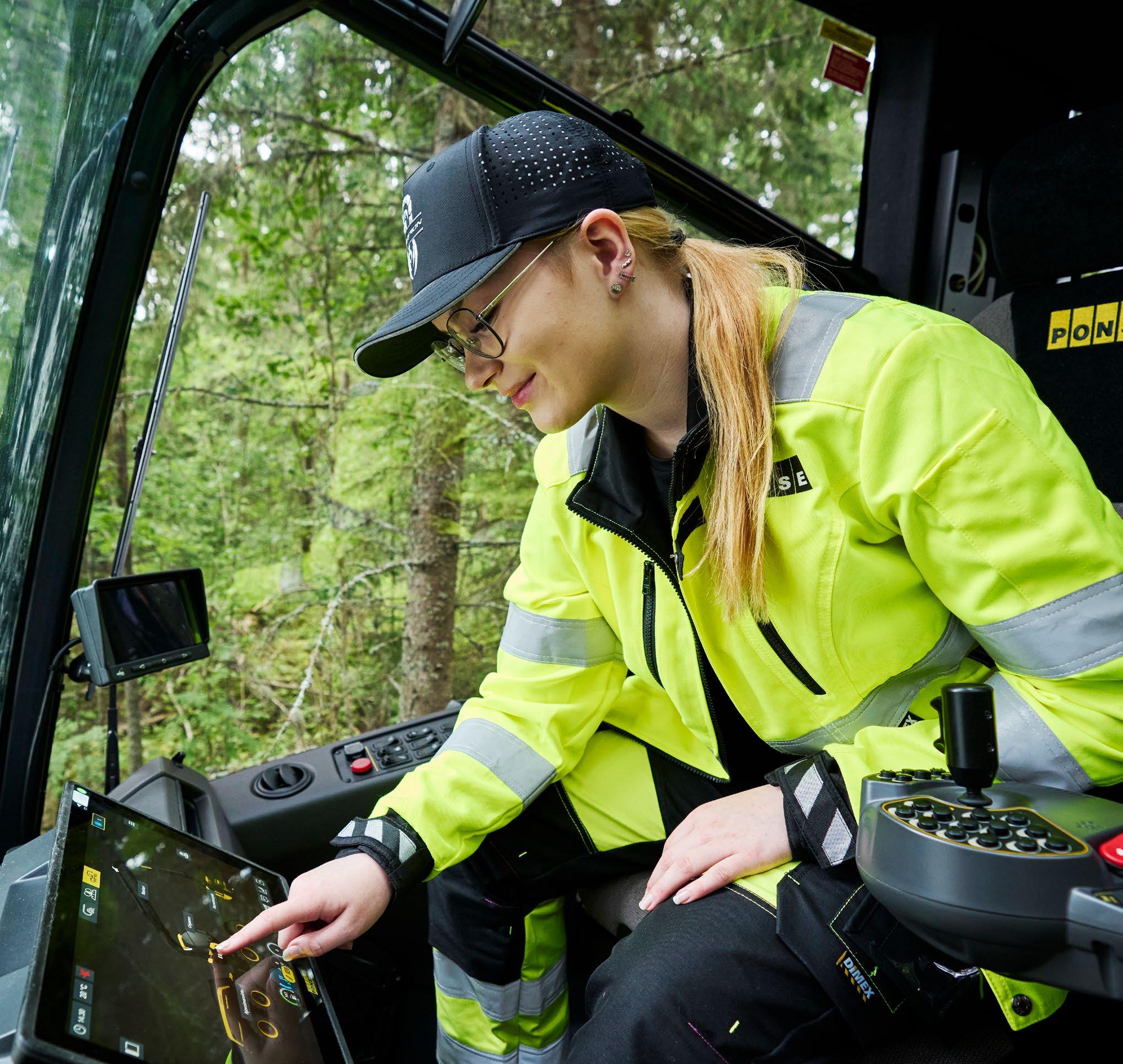
• Quality
• Safety
• Ethics
• Customer satisfaction
Operation and cooperation
Goal: Honest, ethical and communal operations and communication.
• Ethical practices
• Responsibility of partners
• Open communication and cooperation
81 03
Social 01
The environment 02
Sustainable forestry
Goal: Innovative products and services supporting sustainable silviculture and the preservation of nature.

• Cut-to-length (CTL) method
• Environmental impact
• Biodiversity
Lifecycle management
Goal: Services supporting the environmentally sustainable use and lifecycle of our product solutions.
• Maintenance network
• Processes
• Competence
• Product and service range
Natural recources
Goal: Harmonised and environmentally sustainable operations by using state-of-the-art technology and saving natural resources.
• Environmental management
• Energy and material efficiency
• Water consumption
• Emissions
• Waste
82 03
Governance 03
Finances
Goal: Balanced and sustainable company finances ensure our ability to develop and invest.
• Growth
• Profitability
• Cash flow from business operations
• Solvency
Governance
Goal: Reliable, developing financial management. Good corporate governance ensures that business principles and practices are ethical and of a high professional quality.
• Proactive financial management
• Sustainable financing solutions
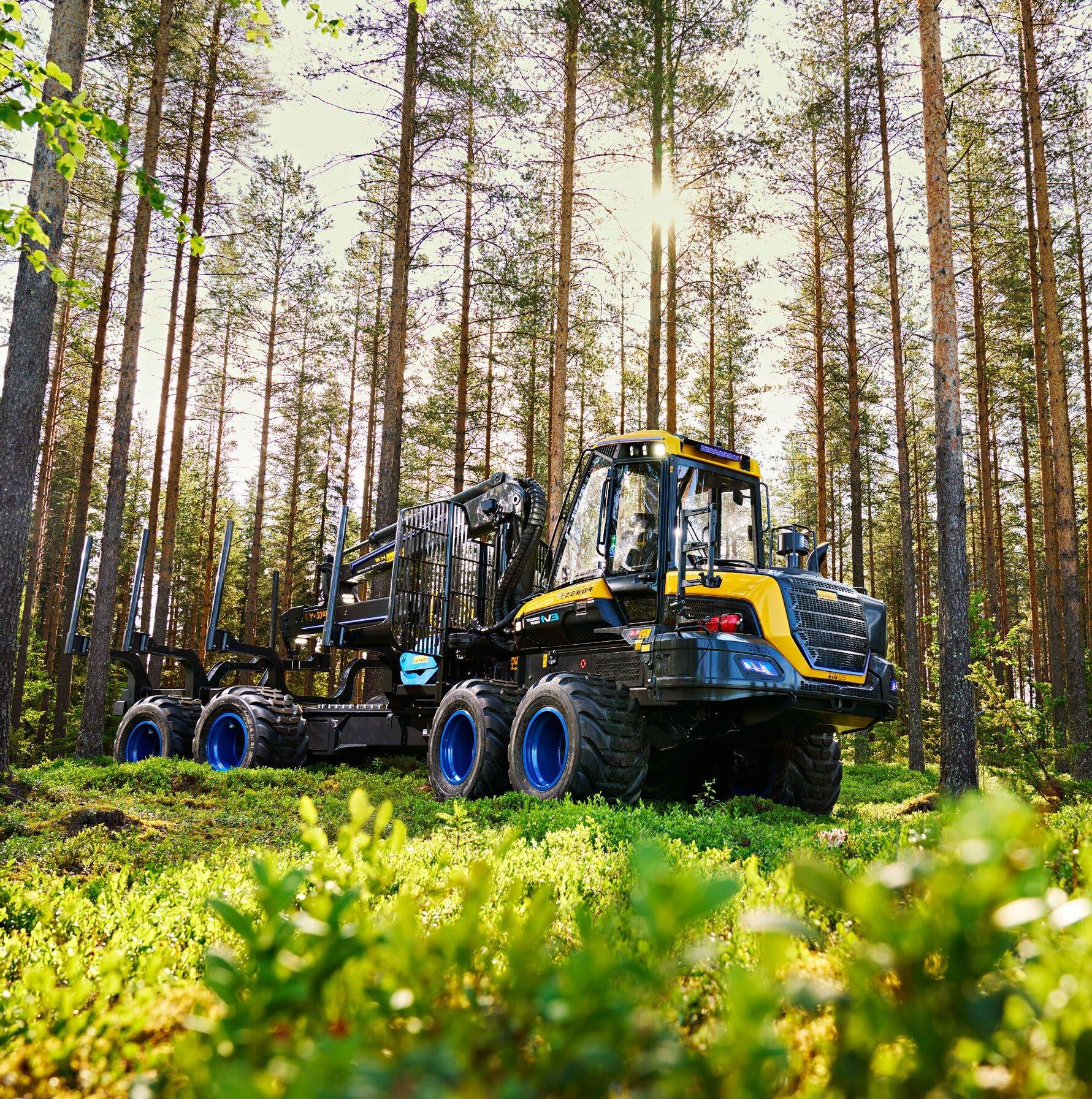
• Investments and risk management
Stakeholders
Goal: Supporting stakeholders’ continuity.
Areas:
• Customers
• Personnel
• Owners
• Suppliers
• Society
Key stakeholders listed on the page 58.
83 03
Goals and measures
We improve the wellbeing of our people
1 Zero accidents results in 2022: LTIF 11,8 (2021: LTIF 17,7).
measures in 2023: Developing the method of continual improvement in safety and preventive safety activities.
Goals in 2023:
LTIF < 5, 8500 safety observations and 5,000 safety walks
2 Ethical corporate culture measures in 2023: Code of Conduct update and training. Developing responsibility activities from the perspectives of diversity, non-discrimination, engagement and human rights.
goals in 2023:
100% of Ponsse’s employees complete training for the updated Code of Conduct.
3 Excellent employee experience results in 2022: eNPS 22 (2021: eNPS 40), on a scale from -100 to 100.
measures in 2023: We will develop the processing of eNPS feedback and the systematic implementation of the resulting measure.
goals in 2023: Developing the engaging eNPS feedback process, eNPS > 40
4 Skilled employees and managers results in 2022: Management quality 3.28 (2021: 3.25), on a scale from 1 to 4.
measures in 2023:
a) We will maintain regular and current training for supervisors.
b) Supervisors will ensure the development of their employees through performance appraisals. goals in 2023:
a) Management quality >3 on a scale from 1 to 4
b) 100% of our personnel within the scope of performance appraisals.
84
2023 P E OPL E
5 Voluntary employee turnover
results in 2022: 11,3 % (2021: 7,2 %).
measures in 2023: We will strengthen internal job rotation and the personnel’s development opportunities through diverse tasks and training.
goals in 2023: Voluntary employee turnover < 5%.
6 Safe and ergonomic PONSSE forest machine
results in 2022: PONSSE Active Seat technology for following the boom, PONSSE Active Cabin for dampening vibration and impacts affecting the cabin, and a Lidar concept for assisting operators in achieving the correct thinning intensity, reducing the cognitive load for operators.
measures in 2023: Development of operator’s work ergonomics and working conditions for the cabin and other factors.
goals in 2023: At least five items of customer feedback to improve product safety.
We innovate sustainable solutions that respect nature
1 Environmentally smart innovation
results in 2022: R&D 3.7% of net sales (2021: 3.9%, EUR 23.8 million), launch of PONSSE EV1 forwarder.
measures in 2023:
Development of energy efficiency, cooperation with research institutions regarding alternative energy solutions
goals in 2023: TR&D’s share of net sales > 3.5%.
2 Minimising the environmental impact of wood harvesting
results in 2022: Lidar concept for measuring and verifying thinning intensity, remaining stem number and harvesting impacts, such as the width and interval of vehicle trails.
measures in 2023: Further development of Lidar testing with customers.
goals in 2023: Development of mechanical forest regeneration.
85
Goals and measures 2023
S O LUT I O N S
Goals and measures
We do not burden nature through our operations
1 Carbon neutral factory (Scope 1 & 2) by 2025
results in 2022: 259 t CO2-eq. (2021: 270 t CO2-eq.).
measures in 2023: Further development of the Vieremä factory’s carbon neutrality roadmap work.
goals in 2023:
Report on our readiness to replace the paint shop’s LPG to a renewable energy source.
2 Carbon neutral operations in the Nordics and reduction of the Group’s carbon footprint by 55% (Scope 1 & 2) by 2035 compared to 2022
results in 2022:
1,931 t CO2-eq. in the Nordics (2021: 2,082 t CO2eq.) 4,309.9 t CO2-eq. in all of Ponsse (2021: 4,379 t CO2-eq.)
measures in 2023: Further development of the carbon neutrality roadmap work.
goals in 2023: Carbon footprint reduction of 5%.
3 Share of carbon neutral (Scope 2) energy: 95% by 2030 results in 2022: 89.3% (2021: 87.5%).
measures in 2023: Increasing the number of solar panels at Ponsse locations.
goals in 2023: We will increase the share of carbon neutral (Scope 2) energy in our procurement of electricity and heating to 90% through the use of renewable energy sources and nuclear energy.
4 Climate change mitigation in the supply chain results in 2022: no Scope 3 calculation.
measures in 2023: Definition of data gathering and reporting policy for select Scope 3 categories.
goals in 2023:
Readiness to start Scope 3 calculations in 2024 (based on data from 2023).
86
A C T I V ITIE S
2023
5 Minimizing produced waste and ensuring the utilisation of waste results in 2022: 3,907 tonnes, with a recycling rate of 55%, first Group-level calculation.
measures in 2023: Group’s waste plan and goals.
goals in 2023:
Readiness to start systematic waste monitoring.
1 A transparent supply chain committed to responsible operating method results in 2022: 90% of suppliers have signed the Code of Conduct measures in 2023: Integrating responsibility goals in the company’s procurement policy.
Goals in 2023:
100% of suppliers have signed the Code of Conduct.
2 Confidential and developing customer cooperatio
Results in 2022: NPS 54 (62)
Measures in 2023: 20 customer seminars for product and service development needs.
Goals in 2023: NPS > 60
87
We are a reliable partner who values community
C O M MUN I T Y Goals and measures 2023
EU taxonomy regulation reporting
The EU Taxonomy Regulation is a classification system for environmentally sustainable economic activities which requires Ponsse to carry out an assessment based on three of its financial key figures. The Regulation entered into force at the start of 2022. Companies who are required to report according to the Regulation and its climate objectives’ technical criteria must publish the share of sustainable activities of their net sales, operational expenses, and investments. The evaluation of taxonomy-compliant business functions was carried out by our sustainability and financial administration in cooperation with an external expert. They evaluated the business of Ponsse and its subsidiaries to identify taxonomy-compliant activities. Regarding operational expenses, our estimate is that the technical criteria cannot be met reliably, and the activities are therefore eligible but not compliant with the taxonomy. Counting figures twice is not a risk due to the limited number of eligible activities.
The Regulation establishes six environmental objectives. The Regulation’s climate change mitigation and climate change adaptation criteria were passed as a Delegated Regulation on 4 June 2021. A Delegated Regulation for the other four climate objectives and their screening criteria are expected to be passed in spring 2023.
The Taxonomy Regulation is based on the European Parliament and Council’s Regulation (EU) 2020/852 of 18 June 2020 on the establishment of a framework to facilitate sustainable investment and amending Regulation (EU) 2019/2088 (Taxonomy Regulation).
88
Taxonomy
The reporting for 2022 must include information on the share of taxonomy-eligible activities in the company’s net sales, investments and operational expenses based on the screening criteria for climate change mitigation and climate change adaptation. Companies must also publish information on the taxonomy alignment of their economic activities for the first time. Taxonomyaligned activities are defined as taxonomyeligible activities that meet the detailed technical screening criteria, do no significant harm to the other environmental objectives and comply with the minimum social safeguards defined in the Taxonomy Regulation.
We have assessed Ponsse’s taxonomy eligibility and taxonomy alignment based on the descriptions and NACE codes of the economic activities for the financial period that ended on 31 December 2022. Ponsse’s subsidiaries are also included in the assessment. The most important class of activity for Ponsse is 3.6. Manufacture of other low carbon technologies, and at least the following NACE codes in accordance with the EU’s classification of economic activities (EU 1893/2006): C22, C25, C27 and C28.
Taxonomy-eligible net sales
The Taxonomy Regulation mainly applies to business that has the greatest potential for climate change mitigation or adaptation. Ponsse’s economic activities are based on the design, maintenance and manufacturing of forest machines. The emissions caused by the company’s activities are not significant, but it is possible for us to affect the emissions caused by the use of the forest machines through innovative product development. The economic activities of Ponsse’s technology company Epec Oy are mainly based on solutions enabling the electrification of utility vehicles and heavy-duty machines, and we have assessed the significant portions of the company’s economic activities to be taxonomy-eligible. The Epec Flow Power Distribution Unit (PDU) is used to connect electric motors, batteries, and different types of actuators. The Epec Flow Hybrid Control Unit (HCU) is used to operate electric powertrains to ensure optimal energy efficiency, productivity, and usability. However, it is currently not possible to provide a breakdown of the net sales for low-emission technologies in the financial reporting of Epec Oy. We will seek to develop the company’s reporting in 2023.
89
Taxonomy
Taxonomy-eligible operational expenses
A significant portion of our product development investments will enable harvesting with lower emissions in the future.
In 2022, Ponsse launched the PONSSE EV1 forwarder, a machine concept with a fully electric powertrain. The concept will result in significant emission reductions through the reduction of fuel consumption in wood harvesting, representing a step towards zero-emission forest machines. Heavy-duty machines with electric powertrains can be classified as “Manufacture of other low carbon technologies” or “Manufacture of renewable energy technologies” if the forest machine meets the technical screening criteria of the Taxonomy Regulation. Our product development costs include personnel costs related to the PONSSE EV1 forwarder project and other business expenses tracked with project identifiers. Our taxonomy-eligible operational expenses include the purchase of renewable energy and nuclear energy, as well as electric rail transport. These activities are certainly eligible, but their compliance is not documented by the service providers, and it therefore cannot be verified.
In our operational expenses, we have identified the following as taxonomy-eligible expenses:
• Ponsse EV1 forwarder development costs (personnel, material and other costs)
• Renewable energy and nuclear energy purchasing costs
• Rail transport using renewable energy
Total expenses EUR 3,525,993.88
We cannot currently confirm any portion of our net sales or investments to be taxonomyaligned with a sufficient level of accuracy. The PONSSE EV1 electric forwarder machine concept is in the product development phase, so its final emission reduction potential remains unknown. As part of our product development process, an LCA life-cycle assessment has been carried out for the machine, and the machine concept’s fuel consumption has been studied through field testing.
The current machine concept has reached a fuel consumption reduction of 25 per cent, resulting in reduced emissions. According to our preliminary assessment, the machine meets most of the taxonomy criteria, and our goal is to further specify our assessment in 2023.
The activities of Epec Oy are aligned with the EU’s green transition in many areas. Meeting the taxonomy alignment criteria requires further action, which we aim to work on in 2023.
90
Taxonomy
Social responsibility requirements
Taxonomy alignment requires companies to comply with the following social responsibility requirements that Ponsse Oyj has publicly committed to in its Code of Conduct.
• OECD Guidelines for Multinational Enterprises
• UN Guiding Principles on Business and Human Rights
• Declaration of the International Labour Organisation on Fundamental Principles and Rights at Work
• International Bill of Human Rights
We have identified a need to improve our risk assessments in relation to human rights, both within the Ponsse network and our supply chain, to fully verify our compliance with the taxonomy. The company’s Code of Conduct applies to all Ponsse employees and external people, companies, and communities closely connected to Ponsse. The Code of Conduct’s obligations are also included in our Supplier Code of Conduct. We are committed to complying with good governance and the legislation and regulations of
our country of operation. Ponsse Plc, the parent company of Ponsse Group, is listed on NASDAQ OMX Helsinki Ltd and follows the applicable corporate governance laws and regulations valid in Finland.
The full taxonomy report is available in the company's Annual Report for 2022 / Board of Directors Report.
91
Taxonomy
Organisational details
Entities included in the organisation’s sustainability reporting
Reporting period, frequency and contact point
External assurance
Delegation of responsibility for managing impacts
Statement on sustainable development strategy
Membership associations
Financial assistance received from government
Proportion of spending on local suppliers
Approach to tax
Energy consumption within the organisation
Direct (Scope 1) GHG emissions
GHG emissions intensity
Reduction of GHG emissions
Waste generation and significant waste-related impacts
Waste generated
Incidents of discrimination and corrective actions taken
Substantiated complaints concerning breaches of customer privacy and losses of customer data
Ponsse Group’s business, p. 7
Sustainability reporting at Ponsse, p. 94
Sustainability reporting at Ponsse, p. 94 Financial statements 2022
Sustainability reporting at Ponsse, p. 94
Responsibility management, p. 69
Our strategic responsibility goals, p. 5
Product liability and safety, p. 65
Good governance, p. 74
Share capital and shares: www.ponsse.com/en/company/investors/share/share-capital-and-shares#/
Environmental impact of procurement and logistics, p. 24–25
Honesty and cooperation, p. 60
Good corporate governance, p. 75
Towards carbon neutrality p. 21
Towards carbon neutrality p. 16,19
Towards carbon neutrality p.19
Towards carbon neutrality p.16,19
Towards carbon neutrality, p. 23
Towards carbon neutrality, p. 22
Code of Conduct and whistleblowing channel, p. 63
Data management and data security, p. 56
Code of Conduct and whistleblowing channel, p. 63
92
2-1 2-2 2-3 2-5 2-13 2-22 2-28 201-4 204-1 207-1 302-1 305-1 305-4 305-5 306-1 306-3 406-1 418-1
Code Indicator Location
GJ
renewable
5,760 GJ
use: 140,400 GJ GRI INDEX
* Total energy use from fossil fuels: 62,640
Total energy use from
fuels:
Total energy

Sustainability reporting at Ponsse
Ponsse Plc publishes annually a sustainability report and annual report in Finnish and English, including consolidated financial statements prepared according to the International Financial Reporting Standards (IFRS) and audited according to the Finnish auditing standards.
The Group data presented on the sustainability report published on 15 March 2023 includes both the parent company and all the Group’s subsidiaries for the reporting period 1 January–31 December 2022. If the provided data does not include all the Group companies, this is indicated separately. Except for the financial figures, the sustainability report has not been certified by a third party.
In the 2022 sustainability report, all key annual comparison data is presented for continuing operations. In June 2022, Ponsse signed a deed of sale regarding sale of all shares in OOO Ponsse, a subsidiary that provided PONSSE services in Russia and Belarus.
The sustainability reporting is based on the Global Reporting Initiative (GRI) standards where applicable. The responsibility information published by the company does not cover all GRI indicator requirements identified as material, but Ponsse is continuously developing its responsibility information management.

94
Sustainability reporting

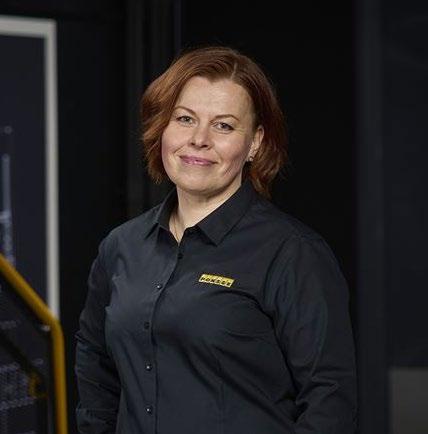
Sustainability contact at Ponsse: katja paananen, Chief Responsibility Officer p. +358 40 553 2921 katja.paananen@ponsse.com Ponsse Oyj, Ponssentie 22, FI-74200 Vieremä CONTACT
Image Geran de Klerk / Unsplash
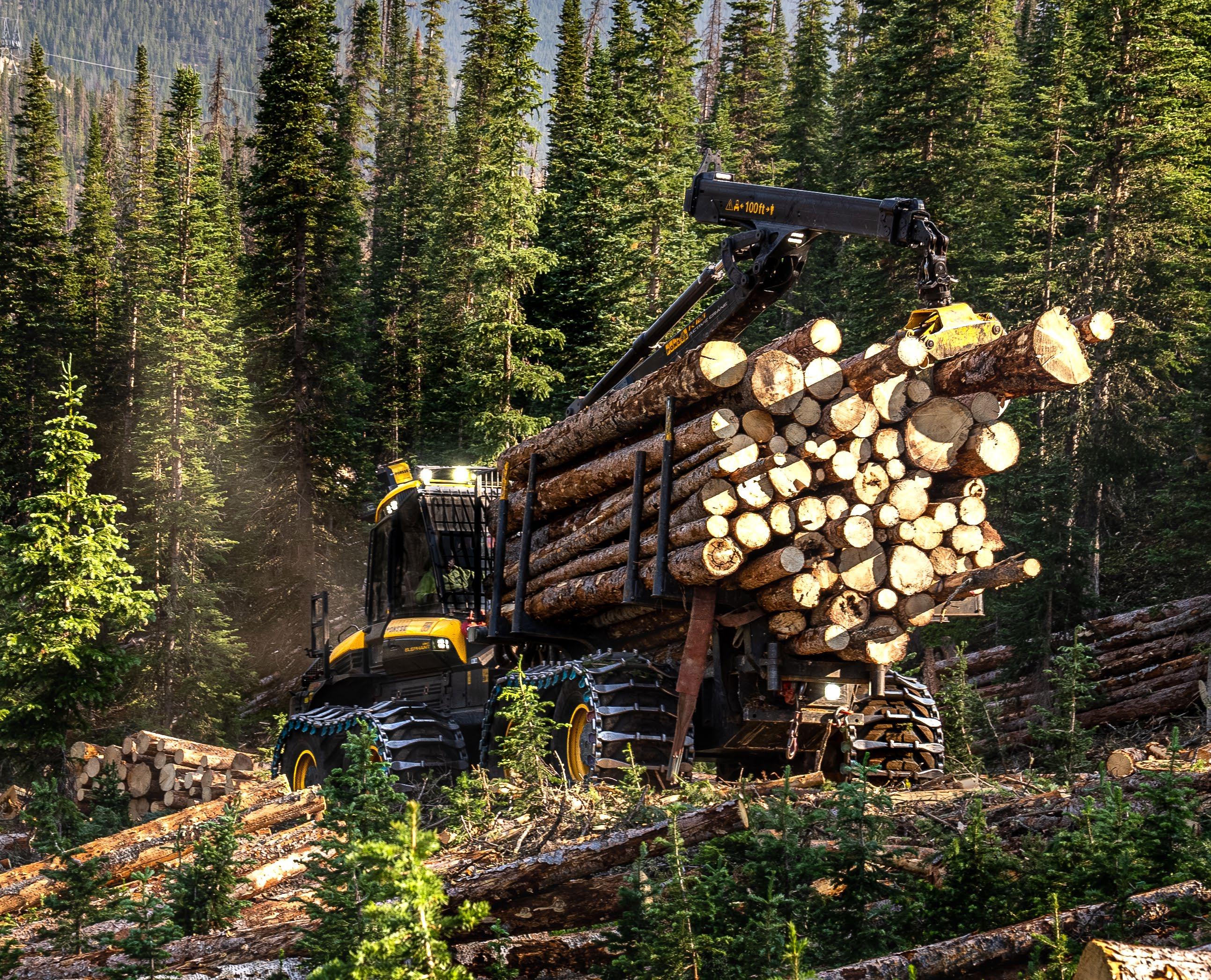









 juho nummela, President and CEO katja paananen, Chief Responsibility Officer
juho nummela, President and CEO katja paananen, Chief Responsibility Officer































































